#is it just me being used to these kinds of storytelling?? like its good but its not anything im not used to so i just put it on bg noise as
Text
me, gearing up to explain why the dragon prince's latest seasons have continued to disappoint me, that while i love the lore and worldbuilding and characters there are clear pacing issues that are so jarring it takes me out of the experience, and that i say all of this with great love for the series but there's only so much good concepts can do before animation has to catch up in order to retain the average viewer's attention. that although season 4 and 5 have been branded as "the mystery of aaravos" the titular character barely appears and that is a crime to me, that even if it's for the suspense and intentionally leaving the viewer/main characters in the dark it's not doing a good job at building up his character and i fear for the exposition dump that will inevitably happen later on. that i will be harsh in critiquing this series because i love it so much and want it to be the best it can be: *inhales*
also me the moment i actually finished the goddamn season:

#no fair viren i want a canon lovechild with aaravos too are u kidding. i'd do anything to let him manipulate me#AARAVOS<3333#as mlm there is just something so lovely to me about aaravos like they put something in him that activates my neurons#aaravos#the dragon prince#the dragon prince season 5#love them. love this hot elf bastard. i feel ill#my critiques still stand btw. but god its so hard to hate it when hehe elf man <3#think im just grumpy they dont show aaravos more when hes literally the only thing keeping me watching at this point.#at first it was rayllum#but hmm....#some of the emotional side plots are... cheesy at best.... i wanted to roll my eyes at a lot of points... its just so overdone?#is it just me being used to these kinds of storytelling?? like its good but its not anything im not used to so i just put it on bg noise as#as i wait for the season to finish..#i hate to do this but not only is it avatar tla but also somewhat reminds me of RWBY. king i'm sorry to do this to you i really am..#to be fair theres nothing wrong. with being any of this. i think tdp is still nice standalone#it just drags out sometimes it's silly#also those clumsy sequences where it wanted to replicate that 3D + 2D animation hybrid#that spiderverse pioneered???? i mean. there was an attempt and i respect that#overall though!! i really do love this series i think it's still charming and im def tuning in to the next season with bated breath#i have more good to say than bad tbh if i tried theres just so much about it :]]]]] i love <3
46 notes
·
View notes
Text
trying to figure out how to pitch this setting to my current ttrpg party in the event that everyone stops doing their stupid JOB long enough to play toys with me again one day...
#or to perhaps gm it for other parties. who can say. if anyone#*glances at audience*would be interested *glances again* at any time maybe we could work something out who knows#its. hrmmm. our party is half newbies very enthusiastic about it and half dyed-in-the-wool dee n dee dudes#and ive been tinkering with the idea of like. a distinct way magic works in this setting and also just kind of#doing whatever and maybe using a different game because dee n dee is suck and the combat is nightmarish#but i dont know how to introduce that even if i HAD dm'ed before and anyway im struggling thinking#'some dms should just write a book instead'. because i like gorget i like what i've made#but its hard to develop around the idea of an animated force that doesnt exist yet and also i just#hrmmmm. puts chin in hands.#i love storytelling and i love worldbuilding and i love CHARACTER CREATION its just#i feel like. i want to share it with people. im not confident in it but i want other people to see it#because i always try to communicate with my art in my weird inept way and i feel like...this is my best chance to be understood#i would like that very much. but i don't know how. and of course if i put it out in the world#it belongs to other people too and if i become Known and Understood then i belong to other people too#which is always scary to me...#what if they dont like it (me). what if they do? what then#i think i have interesting contributions to make to this world...but being part of the world is hard#so much of them time i spend trying to keep the world OUT because it is always touching me and pressing on me and weighing on me#which is important to respect but very tiring and leaves very little room for anything else ever mind the responsibilities#of being a good friend...#ive been thinking about it a lot recently. it feels like there is something fundamental that makes me incapable#of getting close to people or at least uncomfortable with it but i want it so badly and i'm dying without it#i don't know what to do about that but art is my window into the world. so it is important to me.#i forgot what i was saying. do you want to see my introduction i wrote up for the setting awhile ago
1 note
·
View note
Note
I know it would probably bring a lot of hate comments but I am begging you to roast the hazbin character designs because I'd love to have someone properly articulate why they don't work so I could send it to people who won't believe me when I tell them. 🫠 Understandable if you don't want to get into it though.
I don't think there's that much there to roast, honestly?
Those designs are clearly an extremely specific stylistic choice, and because that style is consistent throughout the show, it ultimately feels coherent with itself.
There are trade-offs being made. Because Hazbin's design style is SO stylized and so heavy on decoration and detailing, because it puts a lot of emphasis on costuming, it isn't as good at communicating specific character storytelling as a more grounded style could be (it's kind of the same tradeoff that stuff like Genshin Impact makes).
Like, why does Sir Pentious' hat have an eye and a mouth on it that makes its own expressions? Apparently not for very much reason at all, except that Pentious has a bit of an eyes-motif going on in his design and it was one more place to put an extra eye. And that's a valid criticism of his design, but also the entire show is designed like that, so frankly it would be weirder and more out of place if his design alone didn't have that kind of overelaborate decoration going on.
It does create a situation where I have a hard time "reading" the character designs sometimes. For example, Vox, Alastor and Pentious all wear a similar style of suit with upwards-turned shoulders, butterflies and pinstripes. Now, am I meant to read that as Vox imitating Alastor due to his crippling need to replace and outdo him, and Pentious imitating the style of powerful Overlords because he thinks that possessing their level of power will finally give him relief from his paranoia and self-loathing?
Or is it just a design fixation of the creator who keeps putting their characters in suits because that's just what they like? I can't really be sure, because sometimes design elements are used to intentionally tell stories about how characters relate to themselves, their world and one another, but plenty of other times designs look the way they do Because Of Vibes.
But again, that lack of clarity is clearly an intentional trade-off - and the benefit of that trade-off is a design style that is extremely varied, wild, expressive and memorable. Hazbin Hotel seems like a very easy show to draw fanart of, and a very fun show to draw fanart of. Those designs (especially the hyper-expressive faces) are begging to be the subjects of traumatic headcanons, unbearably cotton-candy soft fluff fantasies and weird, taboo, homoerotic power dynamics. Slaps roof of character design, this bad boy can express so much vicarious emotional intensity.
It's very exuberant, very excited about itself and very self-indulgent, it's a style that prioritizes visual impact and visual interest over readability (something which the animators of the show navigate with real skill, props to them) and individual aesthetics over worldbuilding.
And I don't blame anyone for being turned off by that (I certainly was the first time I started seeing those designs going around), but I would struggle to call the show's designs "bad" when they are clearly achieving exactly what they want to achieve.
I have some criticisms, especially re: how the show treats skinny bodies as an unquestioned, desirable default, and employs fatness as a means of alienating and abjecting the audience. That sucks very badly, and is a serious disappointment, and one of the few places where the show feels like it is being cowardly in its design philosophy. But I don't have it in me to do some kind of Hazbin Hotel Sucks And Here's Why takedown, its problems are not unique or extreme enough to warrant it, at least not as I currently understand them.
572 notes
·
View notes
Text
Costume Meta 7x01
Aaaaaaannnnd we're back!!
OMG I cannot tell you how good it feels to be back writing costume meta - I have missed it so very much and this first episode has given me lots and lots to talk about so lets crack on with it shall we!
Where to start?! Firstly - Its amazing to have Alayna Bell-Price back in the driving seat and she is a genius because she knows the characters better than anyone and I have to say from my perspective there is a pretty clear difference between this episodes costumes and the ones from season 6 - not that s6's costumes were bad, just that you could see the shift of having a designer who didn't know the characters to the same level. I’m going to go in order of character appearance in a non uniform capacity for this one I think so we’re going to jump around from character to character a bit. There is no Maddie or Hen this week, as we don't see them out of uniform, but every one else is accounted for and I've included Norman and Lola as they've got a multi episode arc and their costumes are interesting and playing into a colour theme!
putting it below the cut as its a long post and I on't want to overtake everyones dashes! Enjoy!
We start off with Athena in this pale pink high neck ribbed sweater with large bell sleeves. I've spoken a fair amount about pale pink over the last couple of seasons of costume metas and how, in clothes its representative of childish and immature behaviours or thoughts. That holds true here - the pale pink is playing into Athena's childhood - when she developed her fear of cruise ships - its creating a connection between her childhood experiences and the woman sitting in Franks office.
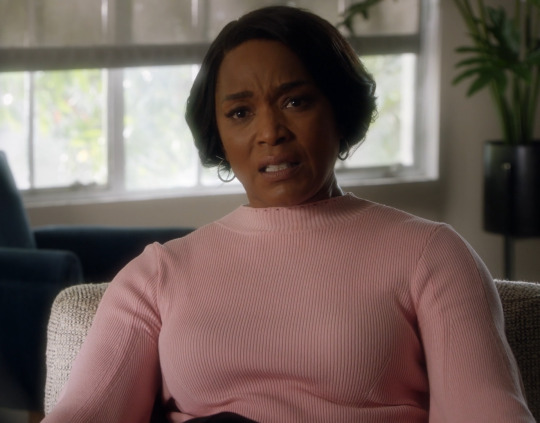
We get a flashback that shows her in yellow and orange - the yellow for communication and the orange for transformation. A literal moment where we see Athena transform from the innocence of youth to her developing anxiety and fear around cruise ships. Its really clever visual storytelling connecting adult with child and shows us her fear is genuine and founded in something that she may not have been able to articualte fully as a child, but she can as an adult, even if she doesn't actually articulate it to Bobby.
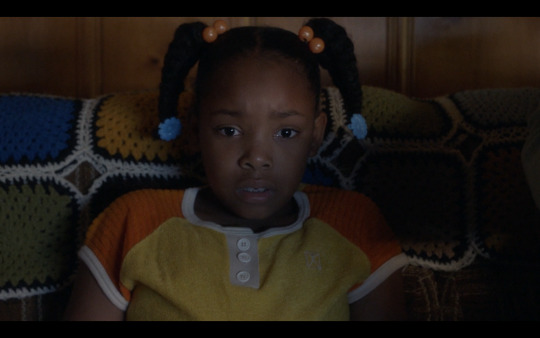
Our next non uniform costume is Chimney. The lighting is really low in this scene, so it's kind of hard to be 100% sure of the colouring, but he seems to be wearing either a dark navy or black button up shirt under a dark green and black bomber jacket. The use of really dark green in combination with black, Back is a colour that can be about hiding ones vulnerabilities - concealment and masking, but it is also a colour associated with magic (generally dark magic) as well as pessimism. The green is growth and renewal, and the hope for a better future. to use them in combination i this way is playing on Chimneys insecurites and fears, his desire to keep the 'magic' alive in his relationship with Maddie, but it also speaks to his growth, that he goes home and talks to her about it (even if he does come up with an insane plan to 'date forever').
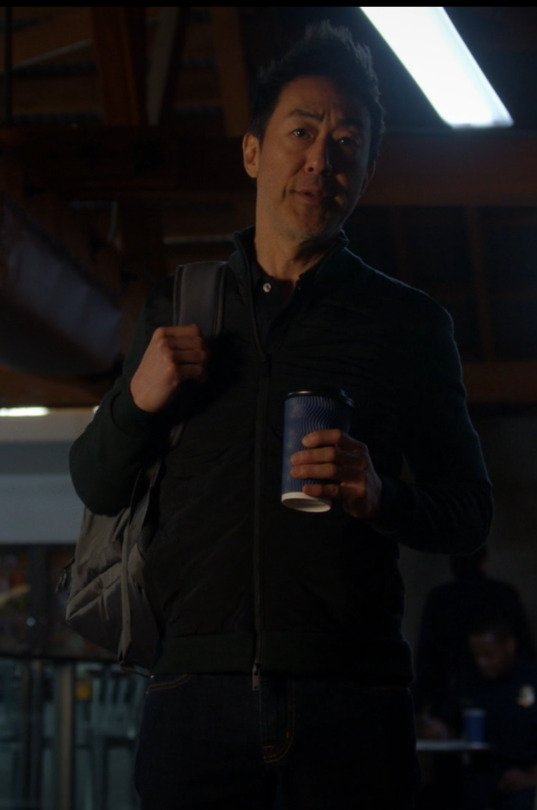
Eddie in the locker room - aside from being shirtless for much of it and pulling some epically good faces - was a super interesting costume choice. Especially the use of his watch! first though - Denim shirt time! We don't actually see Eddie in a denim shirt all that often and we've seen him in the super washed out one far more than dark denim shirts. I've been laughing a little bit at a few people (on twitter mostly) claiming its the same shirt he was wearing at the hospital during and after Bucks coma and it being a play on bringing Buck back to life. While I like the theory, its actually a very different shirt - the one in the hospital was black with a grey wash out and was made of velveteen - so different colour and fabric.
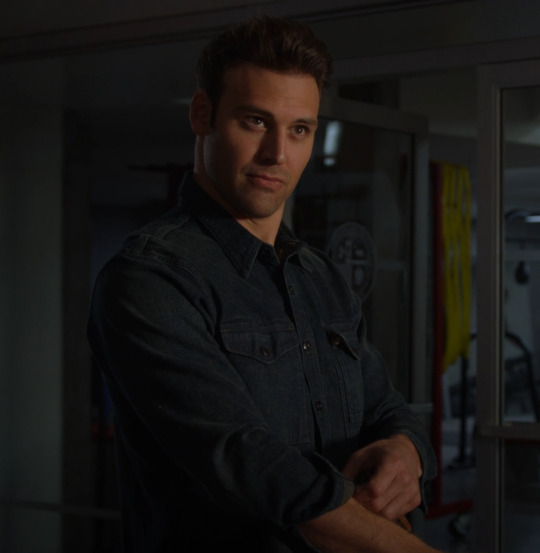
This shirt, is however one we have actually seen Eddie wear before and its far more telling than if it were the hospital shirt. You need to bear in mind that this scene is about Buck and Eddies respective girlfriends (or lack there of) and the fact that Christopher has a girlfriend now as well. This shirt is the same shirt Edie was wearing when he (re)introduced Ana to Chris in 4x08 (breaking point my beloved! the gift that keeps on giving!) and this puts a conversation about Marisol and things going well with her into the same category as Ana - suggesting she is ultimately destined for the same fate as Ana. the other thing that plays into this narrative is the use of the watch.
Eddie does not put the Christopher watch on until after he has found out that Buck has broken up with Natalia - so during the entire conversation about their respective girlfriends, he is only holding the Christopher watch, rather than wearing it.
In the picture below from 4x08 you can see that Eddie is wearing his black 'work' watch rather than the brown strapped 'Christopher' watch. Remember that the first time we see the Christopher watch is when he goes for his first date with Ana in Jinx, so he already has this watch and in theory should be wearing it in this scene. The fact he isn't is pretty telling and I'll go into that a bit more later when we get to Chris's (and Eddies) date scene.
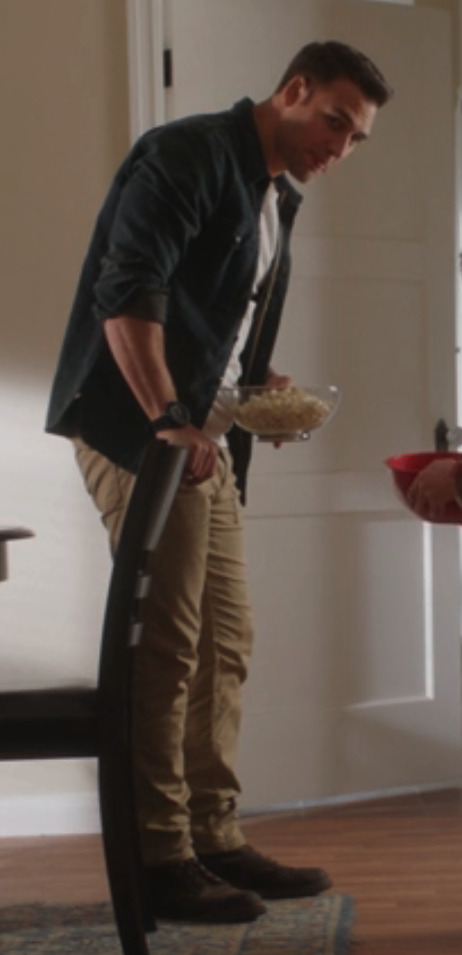
Then we have Buck in his outfit of many colours! The white trainers, continue to play into my theory of Buck wearing them when he is in key points on his journey to discover his self - her it is about showing his growth - that he ended the relationship with Natalia - this is a massive thing when we saw how long it took for him to end things with Taylor - The man who clings is growing and getting out before it drags him down!
The jacket is similar in style to many of the ones we've seen him wearing in season 5 and 6, but this one is much brighter and more colourful. I know I go on about white meaning bad things for Buck, but that isn't relevant here - the white bad things happen to Buck theory is much more about t-shirts, jumpers and shirts rather than jackets - its an under-layer rather than a top layer that = danger. So i'm not thinking of its relevance here for this scene. What I am going to say is that this (according to my spreadsheet!) is the first time we've seen Buck in a white jacket of any description. To me, it's playing into the idea of purity and rebirth which is what white is often associated with. This plays into the comment Eddie makes welcoming Buck back to 'the land of the living' but also implies that Buck is starting a new chapter and making a fresh start - the check patterning suggests it might not all be plain sailing though.
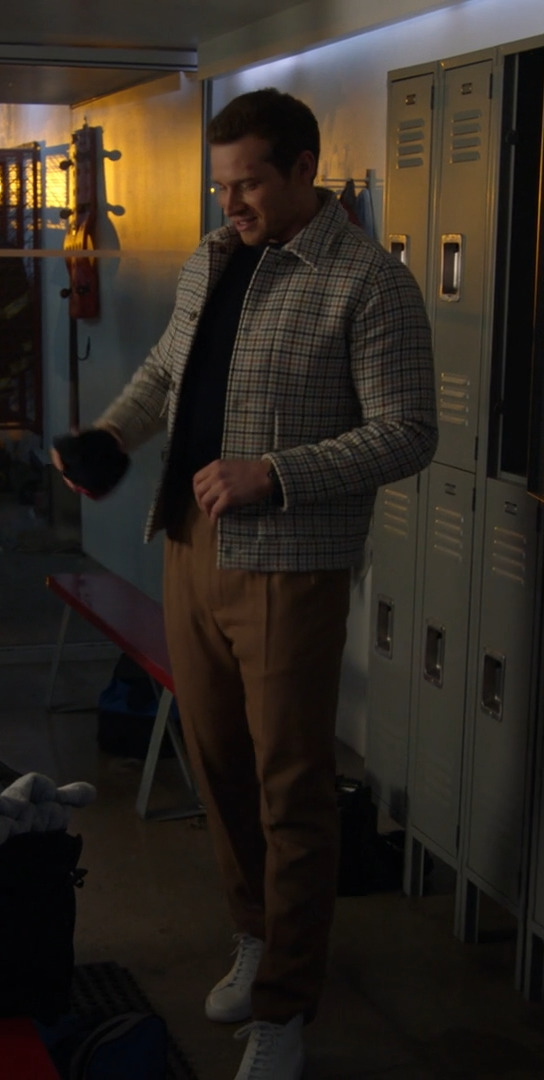
The check pattern is an interesting one, obviously check pattern theory comes into play here, but whether its only in relation to the reveal that he split with Natalia, or if its also foreshadowing Buck getting himself into danger/trouble down the line, remains to be seen.
I'm going to quote myself again because I did predict that this scene may be about his relationship with Natalia when we got the stills dropped - the costume department never let us down!
The only thing I can do is scream into the void about check theory because check does't bode well for people - they always end up in the middle of the drama (see my check theory posts linked on my pinned post for more) and while they come out the other side (99% of the time) Buck in check for that scene in 6x18 pretty much doomed his relationship with Natalia (its specific to her and not C&K's baby as Buck wasn't wearing it when he delivered it!) and as that shirt in the still is very un Buck like, has not only yellow ochre in it, but also its a white base (and we all know buck in white is a bad sign!!) and its check patterned - my theory is that this scene is connected to Natalia in some way - either Buck is not being true to him self in more than one way - that things are going to/have come to a head for their relationship (my kingdom for a reverse of Buck to Eddie about Ana in 5x03!!!) and lead to a pretty big change in some way (fingers crossed for Buck to end it and then finally break down and deal with his trauma!!!)
Some other things about that shirt - the colour combination - the green blue and yellow ochre are giving me call backs to coma Buck (another reason I think it might be connected to Bucks unresolved trauma around his death and Eddies absense in his dream)
In the quote above, I was also referring to the blue and white check pattern shirt he was wearing when he and Natalia got together, but there was also the fact that in the balcony scene at the end of 6x18, we also saw her in one of Bucks white shirts. I wrote in my 6x18 meta about how those two things combined didn't bode well for that relationship going forward, and thats what leaves me unsure about the check pattern on this white jacket being purely about something that has already happened. If I put my Buddie goggles on, I would perhaps suggest that the troubled times ahead may be more connected to Buck and Eddies relationship, and this would fit in with a couple of the things Oliver and Ryan have said. The thing with check theory though, is that generally speaking if it's on one of the mains, they come out the other side of the dram/trauma stronger than before. So if it is connected to Buck and Eddies relationship, then we can expect it to be in an even stronger position on the other side of whatever goes down (and at this point you can't strengthen their relationship any further and keep them as just friends imo!)
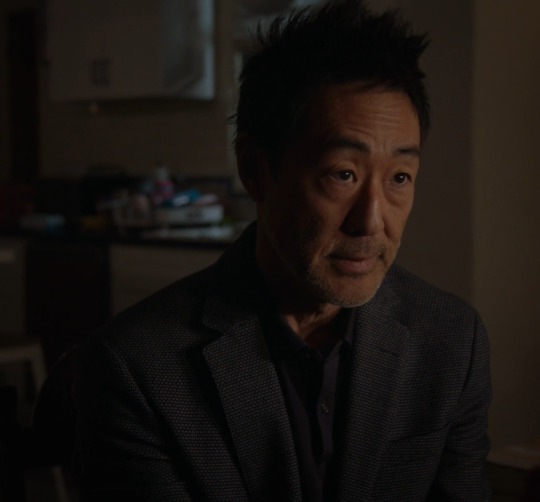
Chimneys forever dating proposal to Maddie, connects with his outfit when he's talking to Hen - it's the same jeans and black shirt, so the meanings of black, can be continued on into this scene - the idea of magic and hiding his vulnerabilities. The addition of the jacket with this brickwork pattern in its weave is a fun choice, it's playing into the idea of building something, but also plays into the idea that Chimney has his walls up - again fitting in with the black meaning of hiding his vulnerabilities - because instead of expressing his fears to Maddie ad then them talking it thorough, he comes up with his insane forever dating concept. the fact that much of this scene is a contrasting parallel with the scene from season 1 when he is pretending to be someone else entirely for Tatiana all ties in perfectly with this costume. The fact that he reverts to wearing blue (ran out of picture spaces so I couldn't include one) later on - when he's realised his plan isn't realistic, talks to Maddie and they end up back on the same page is really good to see - the blue being a signature Chimney colour and is indicative of him being true to himself.
Bobbys blue suit and blue check patterned shirt. The brightness of the blue is a really important choice - it's the only time we see him this brightly coloured on the cruise until he ends up in the bright red at the end. This is important because this is the moment when he's still all excited and hopeful for his honeymoon cruise - everything is good in Bobby's world at this moment in time - the check pattern is telling us that it's not going to stay that way for long. From her on out we see the colours of Bobby's costumes slowly beginning to dull and take on a washed out tone, but here in this moment all is good.
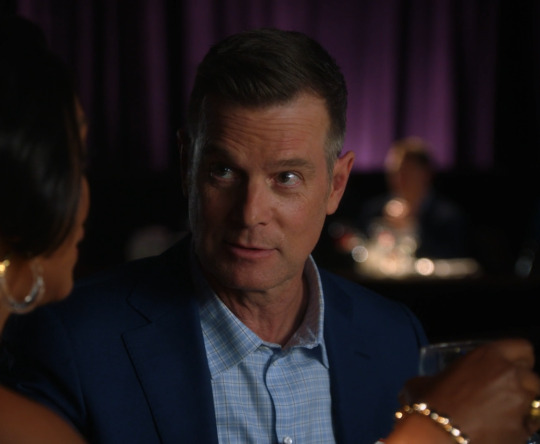
Athena's bright yellow dress is all about making her stand out - communicating with the audience, she is the brightest person in the room (in more ways than one!!). The thing with yellow, apart from the communication aspect, is that it can also be a symbol of anxiety and fear, so this dress plays rather nicely into the theme of Athenas fear of being on that ship.
The colour does have other good traits too - its fresh and bright and is a colour of happiness in its more jewel like tones and I think we can see all of these meanings in these scenes - Athena might be anxious about being on the ship, but she is also happy and enjoying herself with Bobby in that moment.
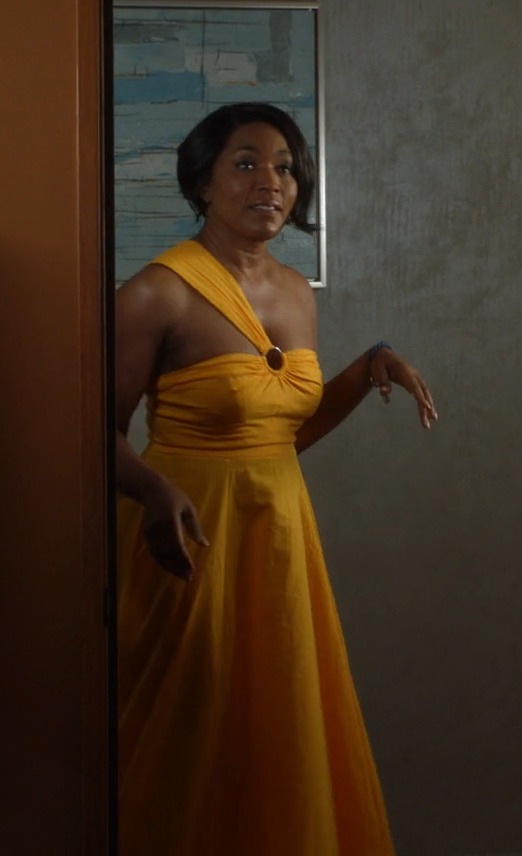
Lola and Norman. Lola is the one we need to focus on in her very bright very check patterned Victoria Beckham dress. Obviously the check pattern plays into check pattern theory, but the red also acts like a neon sign to the audience - highlighting that Lola is in danger - the ga won't pick up on check theory, although they might connect the dots about the fact this check patterning looks very like a cage - foreshadowing her being held captive later on, but also as a nod to the fact she was incarcerated previously.
The red is also a nod towards romance and love - playing into the rekindling of their relationship and romance in the aftermath of the freeway 'see me Norman' incident.
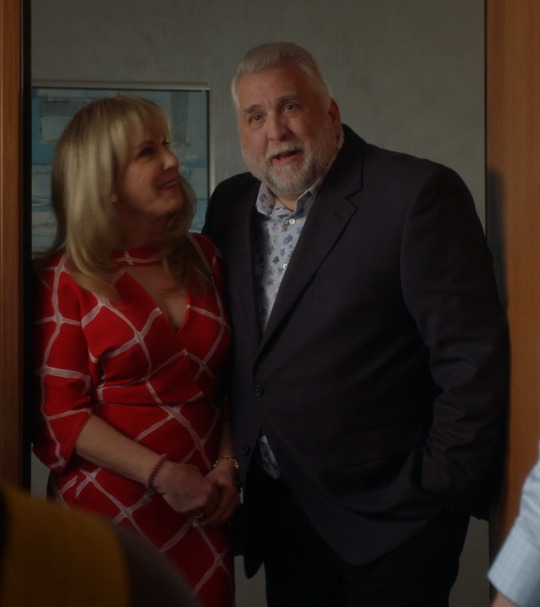
Ok so Christophers date night and by extension Eddies date night! This is where this meta is goingto get a bit messy and I'm goingto jump around a bit becasue I need to talk about the way colour theory is at play in all the scenes in Christophers bedroom, so we're going to talk about Christophers bedroom as one big thing rather than the two separate scenes that it actually is. They are extensions of one another and build on so much of the groundwork we've already seen in previous seasons.
Chris in plaid check yellow and red check plays perfectly into check pattern theory - it’s a signifier that something is about to go down with him - namely that the fact he’s dating multiple girls at the same time.
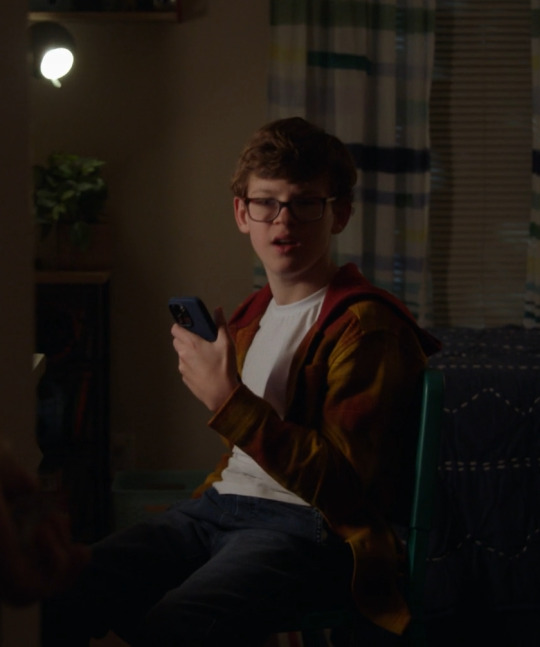
He’s also wearing a white shirt which is not a colour we see on him all that often - in fact, the only times we’ve seen him in a completely white shirt is with his suit in 5x01 when suit shopping and again in 6x08 for his school dance. He did wear a white vest when dressed as wolverine for halloween So as you can see its not a common colour for him, but the times have seen him wear it as a solid colour have been connected to school/girls and dating (i’m including the suit shopping in this because Ana was there and it was kind of a Eddie and Ana date of sorts - in that it was suppose to be for this Christening - meet the family - date type thing).
The most interesting thing is the plaid hooded shirt though. It was such an interesting choice to go with for a couple of reasons. the colour way is especially loud - we tend to see Chris wearing greens and blues and greys, with the odd other colour thrown in occasionally. So red and yellow are not common colours for him to be wearing.
On the red front we see him in it a couple of times - the adapted skateboarding scene and the scene in 4x10 when he joins Eddie and Ana on the sofa - getting in the way of their date night. We do also see him wear red in Christmas related episodes (so I don’t tend to count them in the same way as the Christmas colour theming will nearly always override any other colour theming intention - the use of stripes or check or other patterning is more important in those episodes!).
On the yellow front things are even more clear cut - the Tsunami arc, the aftermath of him falling off the skateboard, Mays graduation party and 5x03’s Eddie Ana break up! These (apart from the tsunami shirt) were all bright almost neon yellow.
This new plaid shirt is more into the yellow ochre part of the yellow spectrum, therefore tying much more to the tsunami arc, which is actually really fitting if you think about it in a little more detail - its a connection, not only to Buck, but also to loss and grief. Eddie might have been using his secret weapon (Chris) to get Buck out of his moping (read mourning) over not being able to go back to work, but Christopher is also still grieving the loss of his mother at that point as well, so its not just about cheering Buck up, its also about giving Chris a chance to do something fun and distract him from his own grief. That is why the use of yellow then ties in so nicely with its use on Chris now.
The other thing that really grabbed my attention about this shirt though is the fact that the two times we’ve seen Buck have a conversation with Chris in his bedroom, he has sat in the same spot and has been wearing one of those two colours - post shooting in maroon and this episode in the yellow ochre - if you watch those two scenes side by side, you see that they’ve used almost identical camera angles as well to film Buck.
I've spoken a lot about the use of maroon as a colour connected to parenthood - especially fatherhood , which is how its intended to be read on Buck - connecting to Eddie and his being shot, pushing Buck into a parental role in Eddies absence.
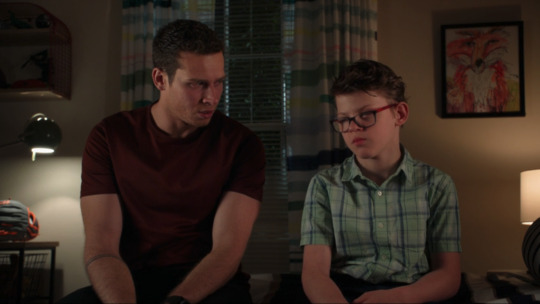
That alone is a pretty loud reference to Christophers connection and relationship to Buck, but then we have the yellow ochre of it all.
I feel a little bit insane about how close my prediction was on what the Buck Christopher scene was going to be about - this is from the meta I wrote when t he stills dropped;
Whatever this scene transpires being about, based on what we've seen with Buck wearing yellow ochre, we can assume its going to continue to play into this idea of Buck not being fully truthful with people and fitting into the role he thinks people want him to pay rather than being true to himself.
I do want to add to this theory by looking at Christophers shirt as well. The grey/ yellow combination is a bit reminiscent of Breaking point (the episode that really is the gift that keeps on giving) because we get Chris in grey and Eddie in tan - that is yellowish toned whilst not actually being yellow
There isn't a good screenshot of them together, but the placing of Chris and Buck in the new one has echoes of Eddie and Chris in that scene (one that is interestingly enough playing into the idea of changing family dynamics, but also the moment before and the one that happens afterwards at Bucks loft, directly placing Buck into a parental role (as an aside the idea of Buck being a miracle worker plays into the theme of Eddie looking for magic, just saying!))
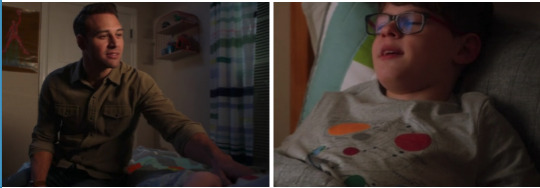
Indirectly this scene was about Buck not being true to himself with people and fitting into whatever role he thinks people want him to fit into, only this wasn't an active situation - this was a scene where Buck could draw on his experience of having done that in the past to help Christopher - the line from Eddie 'you didn't end up being like you' is such a call to this and actually shows how valuable Bucks own experiences and learnings are in helping Chris (we've all been joking about Eddie choosing Buck to help him with this Chris's issue, but in actual fact he was the perfect person for the job - not just because of his being a 'reformed player', but also because of his relationship with death and the death of a loved one where you are reliant on others for their memories of a person rather than having your own)
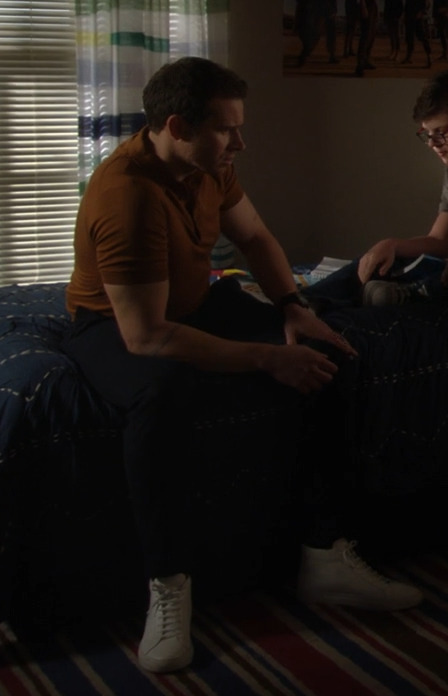
The thing with the Yellow ochre (this meta here that i've already quoted from above is the place to go if you'd like more detail on its use on Buck more widely) isn't just its about it's connection to Buck, his place in Christopher's life and more loosely to the will of it all, (the fact that Buck and Eddie are both wearing the same colour ways as in the hospital bed will reveal scene and are both on the same sides of the screen in both scenes is a stroke of genius and is meant to connect these two scenes together) its also its connection to Shannon.
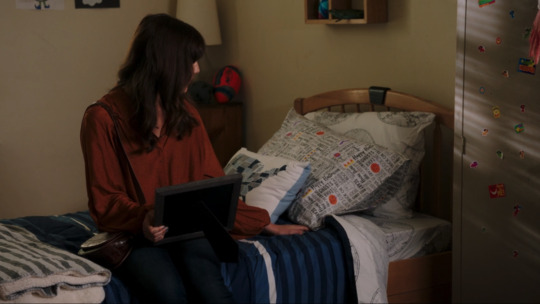
The first time we meet Shannon, she sits on Christophers bed in more or less the same position as we see Buck and Eddie sit, and looks at where Christopher has been positioned in all these conversations, and she is wearing a burnt orange top thats pretty close to the dark yellow ochre we see Buck wearing. Shannon wears a lot of yellow - as in it there are only a couple of times we don't see her wearing something yellow or with yellow in it and those are key scenes (which I will talk about later on).
Shannons appearance in Christophers room to read the letter she wrote him had her in this black top with a floral patterning on it. She was also wearing green trousers (which can be seen in the still below but aren't actually seen during the scene.
I actually really loved the green trousers and black top as a choice because the top is very Shannon - it sits perfectly with the floral patterns we saw her wearing when she was still alive. The green trousers are a bit of a departure for her, but I think its very intentional for two reasons .
The first is that they are very much in the Eddie trousers wheelhouse, especially in combination with black - he wears green khaki trousers a lot. The inference being that the black and green combination is an echo of Eddie.
The second ties to Christopher. Green is also a colour we've seen on Christopher a lot, it's probably the colour we see him in most. It's being used as a reflection of the fact he is growing and transitioning from child to teenager. But having it here in this scene - on Shannon connects a Christopher growing up without his mom.
Both of these combined really connect into Shannon in this scene, tying the three of them together and on Eddies efforts to keep her alive for Christopher - the underlying implication that his growth into who he is so far is as much to do with Shannon as it is to do with Eddie.

Her necklaces were not identical to the ones we saw her in in season 2, but that's most likely because they don't have them any longer, so they've replicated them as best as they can. The other little nod that I enjoyed is the brown bracelets on her right wrist - the same place Eddie wears his brown strapped Christopher watch!
But the top they have her in plays into a couple of other things - the prominent yellow flowers make an obvious connection to Buck from the previous scene, but they also tie into the 'I want a divorce' scene from 2x17 where she is wearing a dark blue dress with bright yellow ochre flowers all over it. the dress is not especially close to the top in the wider sense - blue dress with white squares v black top with florals in a variety of colours, but the yellow flowers are the prominent aspect of both items of clothing and play into the yellow theme connected to Shannon and then to Buck.
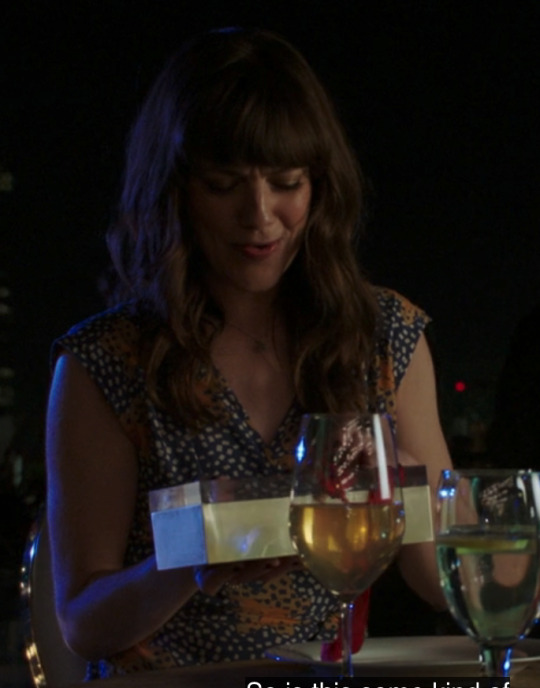
This is espeically relevant when you remember that Eddie is in a black suit in that scene and he's wearing black when he gives the letter to Christopher.
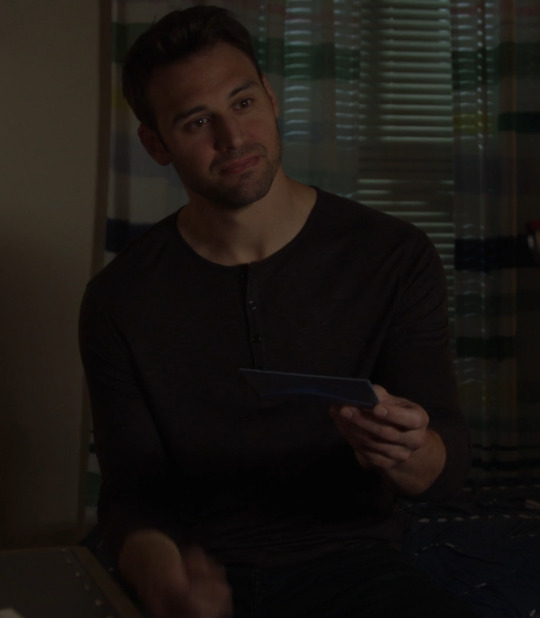
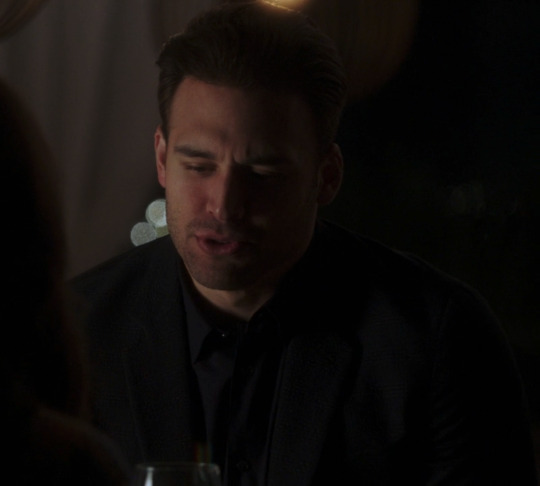
The black for this sequence of scenes is such a poignant choice - its Eddie mourning all over again, not for his loss, but for Christophers loss. I did find it telling that again in this scene, we have the absence of the Christopher watch. Eddie has very rarely not been wearing a watch in his scenes, so the times when we don't see him wearing one are very telling.
For me, in this sequence of scenes, it's about the fact that they are not about Eddies relationship with Christopher, but about Shannons relationship with Christopher. The watch is much more about Eddie and Christopher, so to have it absent from this story arc makes total sense and is symbolic of Eddie being a good father
Then we have Christophers grey shirt - I said when we first got the stills from that scene, how it was likely to be connected to complex family relationships - a la when we’ve seen Buck wearing his grey shirt. And what do you know - the scene was about complex family dynamics/ relationships.
It wasn’t perhaps in the manner I was expecting, but that series of scenes played with the full scope of Chris’s complex family relationships - from the relationship he has with Buck -not only as Christophers friend, but also as more or less Eddies co-parent (the way Eddie asked for Bucks help screamed co-parent rather than friend imo - that whole burnt out car scene was two co-parents discussing their child!) to the relationship he has with his dad - which is a pretty great relationship, but it is a complex one.
The relationship he has with his mom - or the fact he feels he doesn’t have a relationship with her despite Eddies best efforts, because as he grows up she feels further and further away.
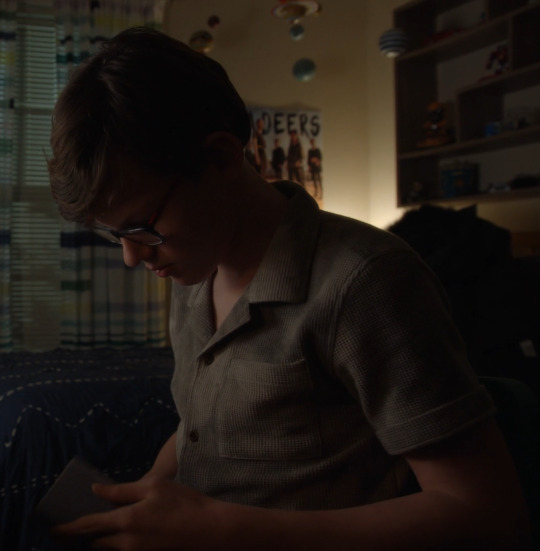
Eddies 'date' night with Marisol. Again I ran out of pictures (30 is not enough!) so you're going to have to use your imagination or go back and rewatch the scene for yourselves, but trust me when I say that Eddie is wearing the same shirt he was wearing for this date night as he was in 4x10 - when Christopher interrupts because he can't sleep!
It's also a similar tee to the one Eddie wears when he has his breakdown and trashes his room (that one was more green when this one is much browner). Its slouchy and has cut and stretched raw edges at the sleeves and on the pocket - in the same way his breakdown shirt did. there is an element of being in familiar surroundings and being comfortable at home, but stretched out raw edges and Eddie generally tend to mean not so great things.
Of course there is the element of his parenting skills being tested by Christophers having more than one girlfriend, but if that where the only reason, then it would've made more sense to have him in that shirt when he's listening in to Chris talking to Buck, rather than when he's on a date with a new girlfriend.
This is especially true as the screen time for that tee has more connection with Marisol than it does with Chris. Combined with the fact that once again, like in the locker room scene, he is not wearing his Christopher watch in this scene and that speaks volumes.
If we are to read the scene as being about Christopher soley, he should be wearing his watch because that watch is a physical embodiment of the importance of Christopher in Eddies life - that he puts Christopher first in all things.
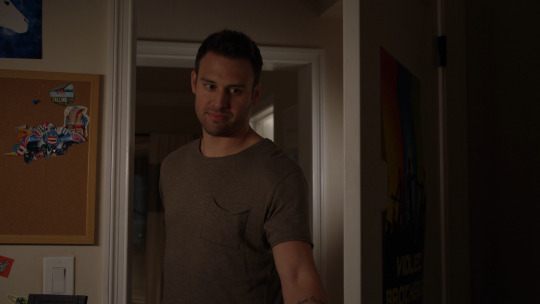
Got to say I was a bit shocked to see Marisol in his bright magenta silk spaghetti strap top when you consider the costumes we saw her in last season - mostly dressed down, t-shirts, jumpers and dungarees so this is a complete 180 for her character.
There are a few interesting things connected to her outfit, firstly it low key ties into Natalia - we saw Natalia in a red version of this top for her first proper onscreen date with Buck (when they go to the badge and ladder joint) so there is an interesting low key parallel to draw there. There is also the fact that her bracelet is a chain one - much like we've seen on all of Buck and Eddies previous girlfriends - although those have been necklaces, so I'm undecided if this chain bracelet is paying into the same trope as those.
Then there is the pink of it all.
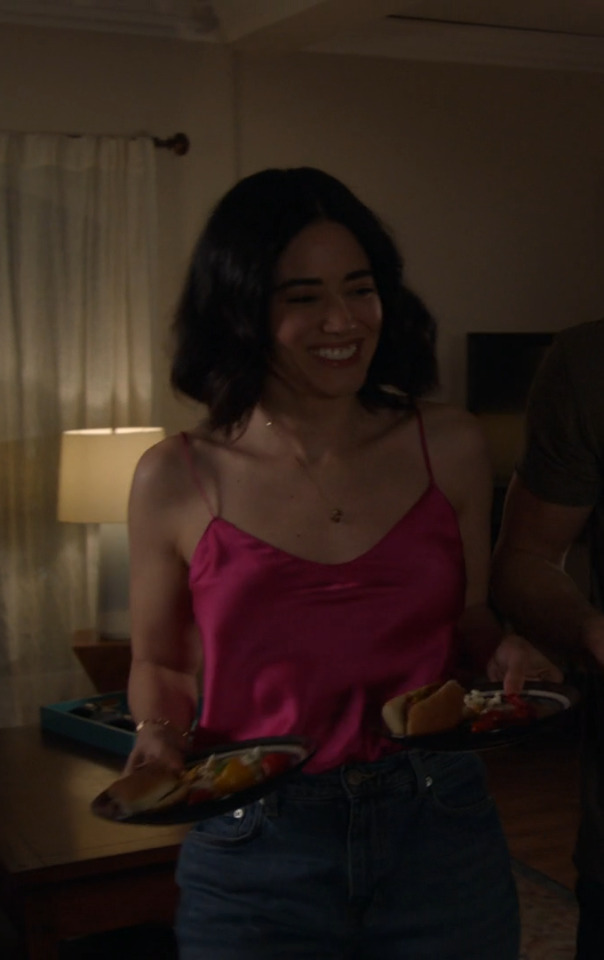
You see Eddie and Pink on his girlfriends doesn't bode well for Marisol.
Both Shannon and Ana wore pink. Ana wore it a lot - there are two examples below, but generally speaking its her most commonly worn colour - including on her first date with Eddie in Jinx.
The first example below is from the first time we see her in the Diaz house. the shades are different, but the fact that the first time we see both characters in the Diaz house they're both wearing pink, speaks volumes.
The other key use of Pink is when Shannon is at the beach with Eddie and Christopher and she tells Eddie she's pregnant - Eddie takes it as the sign he has been looking for - the chance to effectively start over with their marriage, but this is the beginning of the end for their relationship, even if she hadn't died a short while later. She is wearing pale pink in that scene and it's the only time we see her wear the colour in the show.
The fact we can also contrast the use of pink with when Buck wears it is telling in its own right - we see the relationship between Buck and Eddie strengthening when Buck wears pink - May's graduation party, the tsunami, the Hildy coffee machine - all moments (big and small) that show the development of various aspects of their relationship and its ability to endure.
Essentially all this use of pink on the women he has had previous relationships with, doesn't bode well for Marisol and the longevity of her relationship with Eddie. How quickly it will end I can't say, just that it will end.
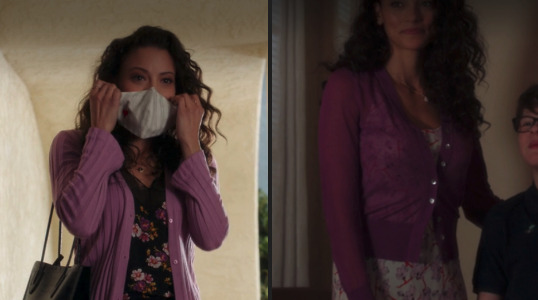
I spoke earlier in this post about colour theming for the episode and this is where I talk about it!
Pink - and in particular the very bright pinks we saw scattered across the episode. Marisol above wearing it, isn't just about connecting her to Ana in costume terms (especially as at this point that costume is a departure of her costumes from s6) it also connects her to the other characters we see wearing bright pink in this episode - Lola and Norman.
At this point in time I'm not sure if we're going to see it play out as a theme across the season, but its use in this episode was very loud on characters that are going to be around for more than 1 episode. It suggests that there is some underlying theme that connects them (by this I don't mean that they're gonna meet and hang out I mean that personality traits are going to be similar)
Magenta and bright pink in colour theory means a few different things, and like with all colours, has positive and negative traits. Generally speaking its a loud and brash colour thats designed to stand out and draw attention to it's wearer.
Things that are considered positive traits for this shade of pink are; intensity, acceptance, kindness and it's supportive and uplifting nature. It's connected to naive love (as in lust rather than the passionate and enduring love of red) can also be considered a nurturing colour.
Negative traits are; intensity, volatility, arrogant and impatient, irritability and irritating and frustration. it is also said to be a stress inducing colour and is said to be overly emotional.
Theres a clear and fairly loud connection between Lola and Norman getting into danger - Lola is in magenta trousers when she is kidnaped. Norman also has bright magenta flowers on his shirt at this point as well. My guess at this point is that we're supposed to lean into the stress inducing element, and also the irritating nature of the colour (On Athenas part at the very least!) and we'll see if those are the themes that play out for Marisol as well down the line.
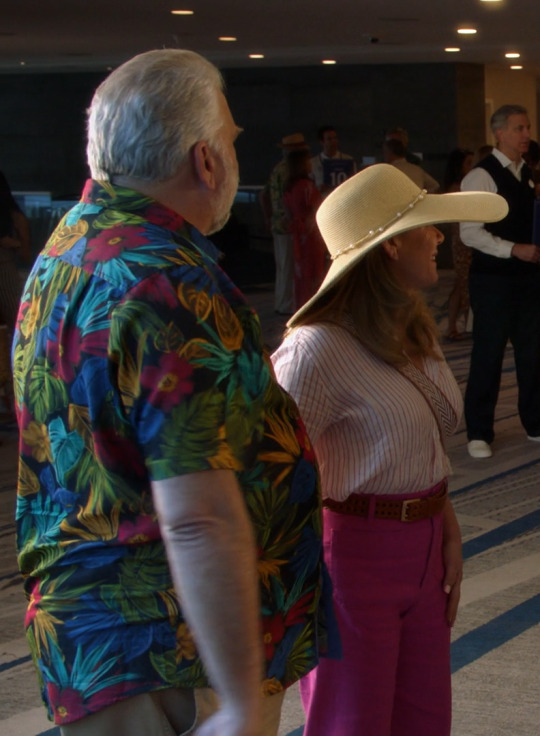
Norman is in bright pink when he's lying and claiming she's unwell from being outside or too long. We also see that he is wearing pink in the ditsy print shirt later on (again I ran out of picture spaces!)
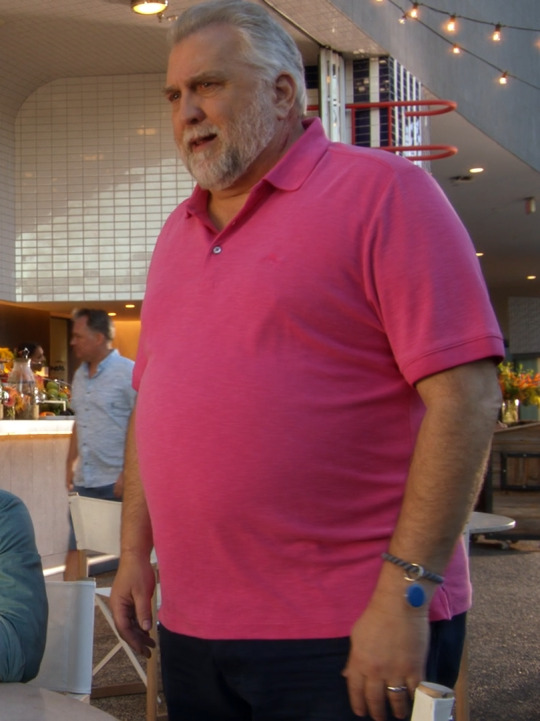
Athena's black top in this scene is much like the use of Chimney in black in his scenes. It's all about power and authority but it's also about her hiding her vulnerabilities. The other thing it does is creates a huge contrast with Bobby and all of the other passengers - she is the only one in black in the scene and it contrasts her with the underlying white of Bobbys shirt - juxtaposing them and visually putting them at odd with one another.
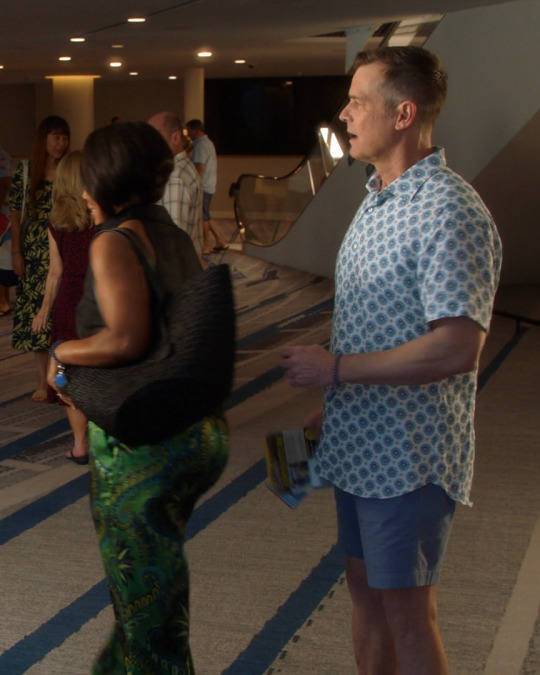
Like I said above about him becoming increasingly pale - here we see Bobby in a sea-foam green shirt - its the palest and washed out colour we've seen him in on this cruise (grey pyjama shirt not being included as its blink and you miss it and a pyjama tee!!!). Sea-foam green doesn't really play into the traditional meanings of green - there is still the element of renewal about it (the sea washes the sand etc)but its mostly a self-conscious and uncertain colour - both things that perfectly sum up how Bobby is feeling in this moment.
The other fun thing about this outfit is the palm tree shorts the patterns Bobby has worn in relation to this cruise, up to this point (and that includes the shirts from season 6) have all been tropical themed but on his shirts, the fact that they've now slipped down onto his shorts is a visual representation of him becoming increasingly dissatisfied with the way his honeymoon is going - that the tropical vacation vibes are slipping away.
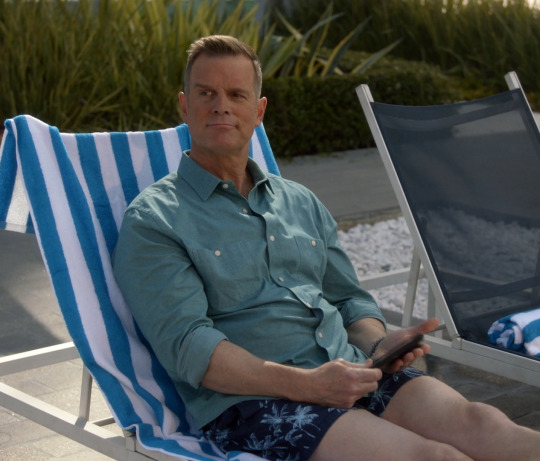
Athenas red and white shirt, in my opinion is showing her cross purposes - its the duality of investigating and being on a cruise in a shirt. The bright red ties into the red and blue first responder colour way the show uses (for obvious reasons) while the white and the palm fronds, the lei flowers and the watery theming of the pattern fit into the troipical cruise they're on.
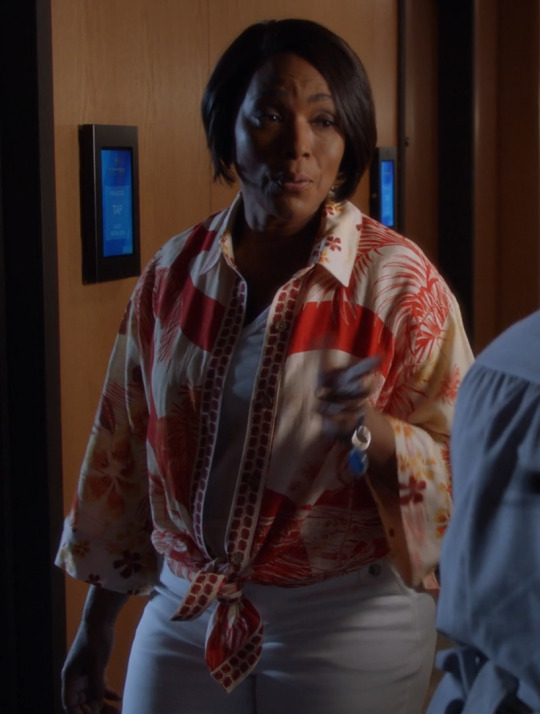
Bobbys red shirt contrasts with the lavender that we see on Athena - its not a colour we see on Bobby all that often and that makes its use all the more important. Especially considering the entire cruise thus far we've seen him in blues and greens - especially pale closer to pastel tones.
This red is bright snd bold and unlike his usual choices. Red is a colour of cross meaning - there is obviously the connection with love and the heart, which is absolutely at play her - his love for Athena is spurring him on and is part of what is pushing him in to investigator Bobby mode - and its representation of love is what is going to be the key player in the up coming episodes on the ship - when he is looking for Athena during the evacuation etc. But the other meaning of red is war, courage and anger and that is very much present here in this episode, and will (i'm assuming) be later on in 7x02 and 3.
The other thing I think its worth pointing out at this point (which is pure conjecture on my part at this moment in time but that I think will become relevant in the next two episodes rather than this one) is the foreshadowed parallel with Buck in season 5 when he broke down Eddies door. The bright red we saw him wearing then was an uncommon colour for him, in the same way it is for Bobby here. It's paralleling the way Buck was prepared to go into battle for Eddie, with the way Bobby is prepared to do so for Athena - going to war for your closest person, your loved one and doing what you need to do to save them.
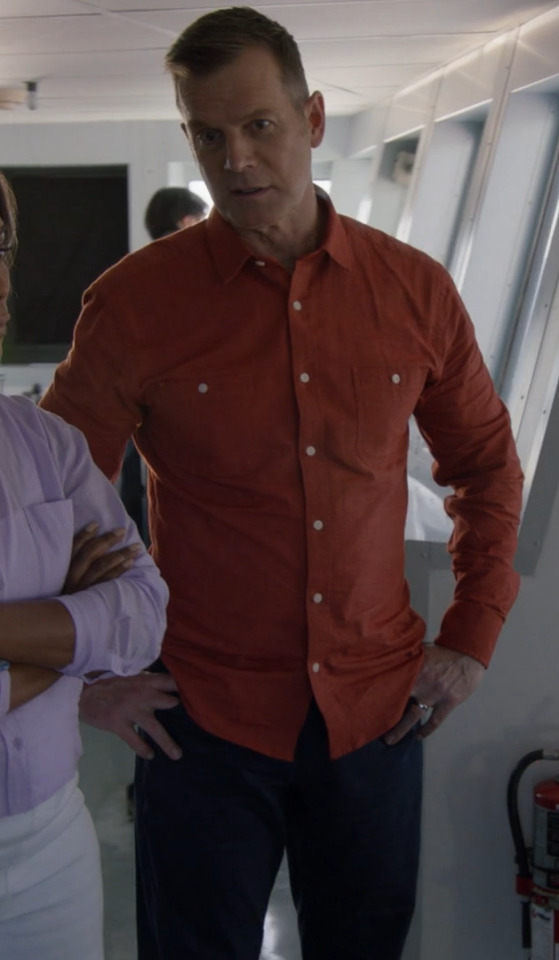
Putting Athena in lavender the moment she gets to go into cop mode was a choice that had me giggling! Lavender is a colour of relaxation and order so for her to start wearing it the moment she gets to start being a cop again - speaks volumes for her state of being - it shows that her fear of being on the cruise ship and of being alone with bobby, has been overridden by her need to do her job and start investigating things. Its the perfect colour for this moment and for the impeding trouble brewing on the ship - Athena will bring order to things as order has been restored to her inner world.
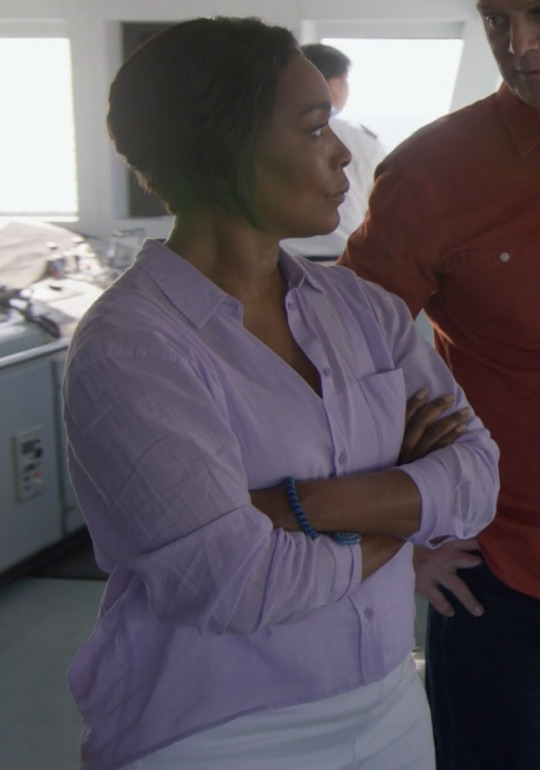
Hopefully you've enjoyed this little canter through the costumes of 7x01 we're back in business and I can't wait to read your comments in the tags and comments 🥰
Tagging for those who've asked to be tagged - drop me a comment on this post if you'd like to be added to the list for the next meta 😎
@theladyyavilee @mistmarauder @xxfiction-is-my-realityxx @mandzuking17 @spotsandsocks @loveyou2thecore @wanderingwomanwondering @oneawkwardcookie @leothil @copyninjabuckley @nathleigh @shammers86 @crazyfangirlallert @missmagooglie @inandoutoffocus @katyobsesses @radiation-run @gayandbifiremenofmine @lemotmo @bi-moonlight @satvojihusana @crazyaboutotps @princesschez75 @mongreloer @alliaskisthepossibilityoflove @sherlocking-out-loud
#911 abc#I hope you enjoy!#its good to be back#I can't remember my costume tags 😂#911 costume meta#season 7#s7 costumes#7x01#Kym costume meta#Kym colour theory#911 costumes#long post#the costume department never fails#still feeling feral about so much of the stuff I got right and the new stufff I've spotted
171 notes
·
View notes
Text
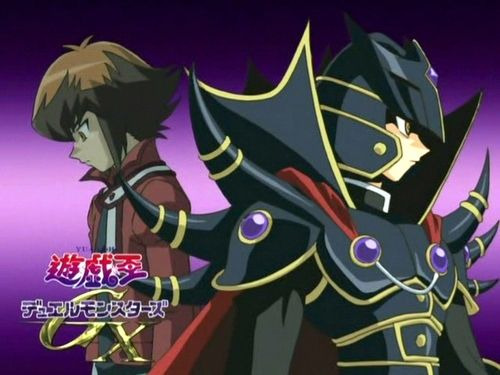

The Supreme King Judai vs. Dark Deku: How To Do a Dark Deconstruction of your Shonen Hero!
Think of this as less me complaining about My Hero Academia, and more me taking a closer look at the writing of the Dark Deku arc and why it failed to achieve what it set out to achieve.
I like to look at writing on a deeper level than Thing Bad, and Thing Good. Imagine a story is a car engine that won't start, in order to find the problem you've got to disassemble all the pieces and look at them one by one to see what pieces aren't working. That's the kind of criticism I'm talking about, break storytelling down into different tools like parts of an engine, plot, world, characterization, ideas, actions and consequences and then look if the author is using those tools effectively to sell a story.
In other words we're talking about the difference in ideas and execution. All works of fiction have ideas, even bad anime can have good ideas inside of it. The idea in question is Judai's case is can exploring the dark side of a hero. Can a hero's positive qualities also lead them down a dark path? Yu-Gi-Oh Gx answers this in a satisfying way, and My Hero Academia I'm going to argue does not.
IDEAS VS EXECUTION
One piece of writing advice I heard from Brandon Sanderson of all people that always stuck with me is "Ideas are cheap. You can always come up with more ideas."
All works of fiction have ideas and themes no matter what the Game of Thrones guy say, but some works are better at communicating their ideas than others. I want to quote a Homestuck Ending analysis of all things to explain what I'm talking about.
When you are a writer you can write anything you want. But if you want to write a story that people want to read you have to follow the rules of good storytelling.
There are reasons why storytelling rules exist. A story is a bond between author and reader, readers to other readers. It is a communication between humans and humans work in a certain way.
Storytelling rules are rules of communication. Rules for handling expectations and saying what you intend to say without it being misheard. Rules for tugging at emotions and pulling heartstrings in a good way rather than a bad way. Storytelling rules are lessons learned by authors of the past that failed to communicate what they needed to. They are not that subjective.
Chief among these rules is buildup and payoff. In fact one of the most basic techniques of storytelling is foreshadowing, in screenplays you usually foreshadow one important twist, then add a reminder so the audience doesn't forget, before finally paying it off.
To simplify build up and pay off I like to refer to it as question and answer. Usually a story will ask its audience a question, and usually by the end that question is answered, unless the point is to leave that question unanswered / ambiguous.
Character arcs are examples of buildup and payoff too, a lot of characters, especially in serialized media are sold on their potential future development. Here's an example, how may people got invested in Dabi years in advance because of the Dabi is a Todoroki Theory? That's an example of good buildup and payoff, because the author sewed just enough hints to build up an audience expectation and then paid it off. People became invested in the story, because they thought their investment and theories would pay off eventually and it did - so hooray!
Both MHA and YGOGX dedicate an entire arc to trying to deconstruct their main protagonist. They also seek to deconstruct the "Hero Complex" or "Saving People Complex" that each protagonist has, and ask the question if those traits are really a good thing.
This post puts it better than me so I'm going to quote tumblr user rhodanum.
‘Hero complex’ or 'saving people complex’ — an obsession with rescuing people in the face of danger, often to the exclusion of all higher thought processes. All too prevalent among shounen main leads, especially hot-blooded shounen main leads. Yuki Judai is certainly no exception. What is interesting in his case is that the writers follow the consequences of his rash, reckless, often thoughtless actions all the way to their heartbreaking logical conclusion.
For those not fully in the know, it involves spiky black armor, an army of sycophants and a fall from grace that caused as much damage as a thermonuclear bomb. Don’t make perky, happy shounen protagonists snap, people. First rule.
I'm going to quote another video too, to add onto the above quote. It's from this video, starting at around 39:52
"GX is kind of famous among fans for taking its happy protagonist and stripping him down to all of his worst qualities. And that's fun. So Judai is a character who's really interesting. He's definitely open to a lot of interpretation, and you know we're gonna be leaning on my interpretation of him. Sorry. It's my video. I think he's commonly referred to a "very typical shonen protag" probably one of the most shonen protag of the yu gi oh protagonists. He is headstrong and loud, and (makes punching noises while air boxing), he is a type of character who's like I'm gonna be the best and brings everyone along on the ride. He's the kind of protagonist that everybody loves him they're all fighting over him, and Yu Gi Oh Gx really puts him up on the pedestal, of like THIS GUY. THIS GUY DOES IT ALL. Then season 3 rolls around and dares to ask: but what if that's selfish behavior?"
That's the question both MHA and YGOGX are asking in Dark Deku arc and Season 3 respectively, what if all of those behaviors that make them the typical hot blooded shonen protagonist are actually selfish? Is their hero complex really a good thing?
Each arc is tasked with exploiting the main character's flaws, until they reach their emotional breaking point and lowest point in the story. Let's see how each story treats their main character and from comparing that I want to make a point about what makes effective storytelling.
The Supreme King Haou Arc
Instead of recapping the entire arc to you, I'm going to touch upon what ideas the story setup in regards to Judai's character and how it paid off those ideas. What are the questions the story asks and what answers does it give us?
I'm going to focus on the two questions I outlined above. Is their hero complex a good thing? and What if this is selfish behavior?
Yu-Gi-Oh GX is an anime where instead of using super powers, the main characters fight each other with a magical trading card game. Besides that fact there's a lot of similarities between GX and MHA. They both take place in an academy setting where the main characters learn about using their quirks, and playing the card game better respectively. It is a shonen battle anime where almost everything is solved with a shonen fight, they just use cards instead of flashy superpowers. The main characters are all students who have to grow up and enter the adult world.
Judai and Deku are both characters that deconstruct the "hero complex" of shonen main characters. Judai is themed entirely around heroes, he has an elemental hero deck where every hero is based off a hero that appears in popular culture, he is the best duelist in the school and the one everyone calls on to save the day over and over again. As stated above he is the most Shonen Protag to ever Shonen Protag, he's a warrior therapist who makes friends and saves the day because he's really good at the card game, and will always show up to fight for his friends.
For the first two seasons Judai is built up on this pedestal of the ideal Shonen Protagonist, and praised by basically every single character for being "childish" and "pure of heart" however when Season 3 comes around the narrative stops heaping endless praise on him and starts to challenge him. However, this doesn't come from nowhere there are signs of these personality flaws of Judai, they just get swept under the rug the first two seasons.
There are several moments such as the climaxes to season 1 and season 2 where Judai fails to grasp the stakes of the situation, saying things like "Oh, this card game is really fun" when he's dueling with lives on the line. Judai in fact has a pattern of "only wanting to duel for fun", he fights because it's fun to him not because it's the right thing to do. However, he's continually forced into high stakes situation where he has to fight for others just because he's the strongest character - and constantly having to carry that on his shoulders starts to weigh on him after awhile. Judai will show up to fight and save his friends every single time they need him, and that's the source of his hero complex because after a certain point his friends start relying on him too much.
In general he also doesn't have deep thoughts of what heroes are, he admires heroes but it basically boils down do "Heroes are cool." He's kind of like Goku where he doesn't really fight for any idea of justice or to save others, just for the thrill of fighting itself. He also has a tendency to be insensitive to other people's feelings and take things for granted. For example, in Season 2 like three of his friends get possessed and Judai doesn't even do anything about it for half a season because he's too busy participating in the dueling tournament.
In general though it's a pattern of Judai only wanting to "duel for fun" and him being forced to duel to save others instead, and be responsible for other people. Judai will show up to fight for his friends, but even then he falls back on just "dueling for fun" because always having to fight for others is too much responsibility to put on his shoulders.
There's a lot of hints of Judai's flaws, but they also tend to get brushed off because shonen protagonists are just like that. Like, Judai can say some insensitive things to his friends sometimes and be oblivious to their feelings, well he's just a book dumb shonen protagonist. Judai should be taking this fight seriously, well he's just being a happy go lucky shonen protagonist, etc. etc. A lot of these things are also just swept under the rug as him just being a child, a boy-at-heart like most shonen protagonists are supposed to be.
However, season 3 starts looking at Judai not as a shonen protagonist but as a person, and it all starts with the suggestion that maybe Judai remaining a child at heart is a bad thing, especially when his friends around him are all growing up. It all starts with the introduction of this guy right here - Johan Anderson.
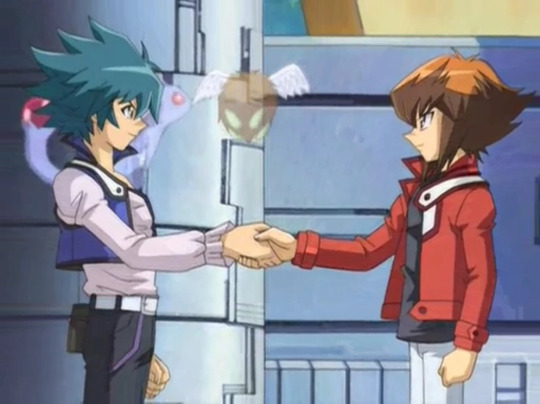
Johan shares many things in common with Judai, he can see spirits, he's a duelist who loves to duel, he has a strong connection with his cards. However, the more you compare them the more you notice that Johan has a lot of things that Judai lacks. They are so similiar that they become almost instant best friends, but even then Johan himself notices there are a few things off about Judai's behavior.
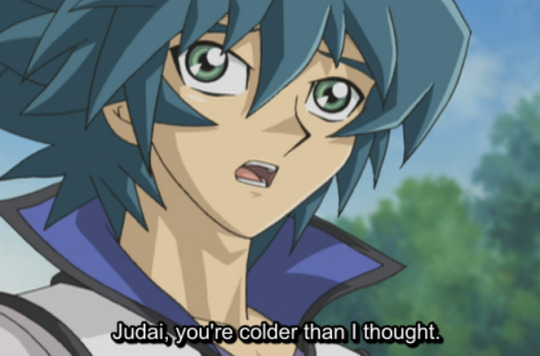
Sho: Bro... I thought you would have something to say to me.
Johan: He seems lost. I think he just wanted you to give him some advice.
Judai: SHo will be fine.
Johan: Judai, you're colder than I thought.
It takes someone completely new to the dynamic between Judai and his friends, who likes Judai but hasn't spent the past two seasons idolizing him to realize that some of his behaviors are kind of off. That Judai isn't really the most empathic, or even that good at understanding other's feelings.
Johan is the one to point this out because he has the emotional intelligence that Judai lacks. We've been told Judai is our shonen protagonist for two seasons, only for the real shonen protag Johan to step up out of nowhere and show them how it's done. Johan is good at seeing other people's emotions, and he becomes a near instant pillar of emotional support for Judai. More than that, he also is the first person to treat Judai like an equal, he never asks Judai to save him like all of Judai's friends do, if anything they both save each other.
Johan also exists to show what Judai is lacking, mainly a reason behind why he fights.

Judai: I do it because it's fun. Or because of the surprise and delight, I guess. Well, I guess that comes down to "because it's fun", huh? Sorry, I guess that's an awkward question to ask out of nowhere.
Johan: What's wrong, Juadi?
Judai: Nothing, really.
Johan: I have a proper goal.
Judai: Don't tell anyone. Even if people don't have the power to see spirits, they can still commune with them. That's why, for those people as well... (I want to be a bridge between humans and spirits).
Judai is someone who will always show up to save his friends when he is asked, but he doesn't really have a concept of what being a hero is or the repsonsibilities it entails, he just admires heroes in a pure hearted way. Johan on the other hand has a reason to fight and that's to help humans and card spirits get along, and Judai expresses admiration for Johan because he has a goal.
At the same time this is happening, Judai gets picked apart by two villains for his lack of reason for fighting. Judai has been praised to death for two seasons for being pure of heart, but now the villains are challenging him by saying he has no "darkness of the heart". That without it the reasons that Judai fights are superficial and frivolous.
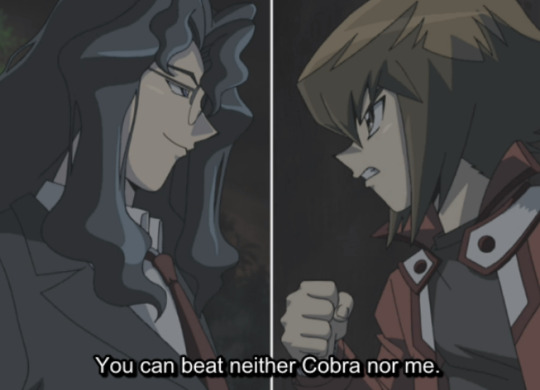
We have something that you lack.
Judai: That I lack?
Yes the darkness of the heart that slumbers deep within a duelist. The burden that a duelist bears in his heart. Judai, you have none of that.
Judai: A burden in my heart.
I have nver, not even once, dueled for myself. I doubt someone like you, who only thinks of himself could udnerstand that.
Judai: What would be fun about a duel like that?
It isn't fun at all! You must bear other's expectations while remaining strong. That is what it means.
Judai is a bit of a blood knight, he will be dueling with his friends lives on the lines and stop to go "Wow, this duel is really fun" and it's usually just dismissed a shim being a shonen protagonist until suddenly it isn't.
I'm gonna draw a deliberate parallel between Deku and Judai here that I'll reference later on, they both don't understand "darkness of the heart" and they need to understand it in order to grow as people.
There's also the underlying notion that being a hero is not all it's chalked up to be, to be a hero, to fight for other people's sake means also taking on their suffering. As noble as that may seem suffering is suffering.

Cobra: Fortune would never smile on a fool like you who fights while prattling on about enjoying duels.
Cobra: You are certainly a talented duelist. But you have one fatal flaw.
Judai: A fatal flaw?
Cobra: Yes, your duels are superficial. Someone who fights with nothing on his shoulders, cannot recover once he loses his enjoyment. What a duelist carries on his shoulders will become the power that supports him when he's up against the wall!
Cobra: But you have nothing like that! Those who go through life without anything like that cannot possibly seize victory.
Cobra: But I know that nothing I say will resonate with you... because you have nothing to lose but the match.
Judai: I...
Cobra: Afraid aren't you? Right now, you have nothing to support you.
In the context of this scene, Cobra has told everyone that he's currently enacting his evil plan out of the vain hope that he can somehow revive his son from the dead.
As insane as "I think I can revive the dead" is as a motivation, fighting for the sake of your dead son is a much stronger motivation than "I think duels are fun."
Judai doesn't have an appropriate answer as to why he fights when he's questioned by the villains, and instead of coming up with his own answer he relies on the answer Johan provided for him.
Johan: You idiot. Why are you so shaken Judai? You think you have nothing on your shoulders? Give me a break! You always bear other's expectations on your shoulders. When you have other people's expectations riding on you, it means they've trusted you with their hopes! Don't you always carry those? If you lose what will happen to us here?
Johan's words snap him out of it, but this isn't Judai coming up with an answer himself it's just taking the one that's provided for him.
This is also the point where we get start to develop an answer to our question. Is Judai selfish?
In action he's not. His actions are selfless. Judai is always fighting for others, even when he only wants to duel for fun. He will show up and fight if you ask him too.
However, in motivation he is selfish. His motivations are selfish. Judai isn't fighting out of some selflessness, but because fighting for the sake of other people gives him a purpose. He keeps fighting for his friends, because he's built all of his friendships around being the one to solve their problems. It's why he Johan's answer suits Judai so well, because he thinks that's how friendship works that he has to keep carrying everyone's burden for them.
Not only does it lead to unhealthy friendships (he sees his friends as burdens) but also it's unhealthy for Judai himself (he can't keep carrying other people's burdens without getting weighed down).
Judai's hero complex, this pressure he feels to save everyone around him arises from two things, it gives him friends when he'd been a lonely child before that, and it gives him purpose. Playing the hero is how he made all of his friends, and now it's how he keeps them.
However, in spite of doing all this to keep his friends, Judai's relationship with his friends is so all give and no take that he's practically fighting alone until Johan shows up. Judai doesn't form a healthy and stable relationship with Johan however, Johan just becomes a crutch.
In Summary:
Judai's actions are selfless.
His motivations are selfish.
Judai's purpose is to carry everyone's burdens on his shoulders.
Judai's friends exist to be saved by him.
The following arc is roughly divided into four sections. Everything I've covered above happens in the first section the Cobra Arc.
Cobra Arc
Zombie Survival Arc
Dark World / Supreme King Arc
Oh Shit, Yubel's Back
The cobra arc is the introduction and it sets up the basic ideas of Judai's character that I listed above, in addition it focuses on the question of if Judai is selfish, and the idea that being a hero is a burden. There's also the third question where Judai is called to understand darkness of the heart, something Deku will also be called to do.
The Zombie Survival arc is an arc where the school is teleported to another dimension and they have to survive for several days with a limited food supply, everyone fighting, and an outbreak of zombies.
The main setup of this arc is to show how everyone is working well together as a team, even in a high stress situation. Alexis, Judai, Misawa, Kenzan, all pull together with the help of new students Johan, Austin O'Brien and Jim Crocodile Cook.
However, I'm brushing over this arc because Judai doesn't actually do much this arc. If you analyze who does what, it's mainly Johan and Austin O'Brien who are in charge of the entire school. Johan demonstrates leadership skills, calls on everyone to pull together in a time of crisis, and most importantly emotionally supports Judai all throughout.
Even when Judai is confronting the main villain of this scenario Yubel, it's Johan who shows up to support Judai, and it's Johan who wins the duel at the sacrifice of his own life. Everyone gets through the zombie arc unscathed, but it's because Johan is the hero of this part of the arc, not because of anything Judai really did.
Judai who having gone on so long carrying other people's burdens to the point where he's made saving others his purpose, has for the first time experienced someone helping him carry those burdens only to disappear and Judai does not react well to it.
This is when the story has finished setting up all the dominoes that are about to fall. We have one mini-arc drawing attention to the dark side of Judai's personality and how he doesn't understand his own darkness, and one mini-arc showing Johan being a much more effective hero and leader than Judai, demonstrating everything Judai lacks.
You Either Die a Hero, or You Live Long Enough...
Yadda yadda you know the rest. A character being undone by the same traits that made them a hero, is classic tragedy 101. It's called the Hamartia or the fatal flaw. A character's greatest strength in some situations can be their greatest weakness in others. The Supreme King Arc is a masterclass in showing how the traits Judai had that led to his success in the first season, can lead to his total ruin, and even to him becoming the villain of his own story.
Hero and Villain are much closer than you'd realize, and this becomes especially true in the relationship between Judai and Yubel. Judai shares an extremely close relationship to his antagonist foil, just like Deku does with Shigaraki.
However, in Judai's case he's the reason that Yubel turned evil. While it's not entirely his fault, Judai's decision to abandon Yubel when he was a child, made Yubel go through ten years of painful torture all alone, which is the reason behind their current madness.
To summarize Yubel and Judai's story briefly. Yubel is a card spirit, the thing that Johan wants to serve as a bridge between card spirits and humans. Judai had an incredibly close relationship with Yubel as a child, but Yubel was overprotective and used their powers to harm anyone who came near Judai. Judai launched Yubel into space hoping the righteous space rays of justice would calm Yubel down (I know that sounds stupid just go with it) but instead Yubel was hit with the light of destruction a corrupting force that made them endure years of torture. They called out for Judai's help in their dreams only for Judai to eventually forget about them with a psychologist's intervention. Eventually the satellite they were trapped in made it's way back to earth, and they almost died burning up on re-entry. When they finally crawled their way back to Judai, they found Judai had been living the past ten years happy and surrounded by friends, while they had been tortured in space and nearly died all alone.
At which point Yubel snaps, hard.
While it's not Judai's fault entirely because he was a child and he didn't know what was going to happen, he still made the decision to abandon Yubel and stuck them in that situation. Judai's actions creaeted Yubel, and now Yubel is here broken and hurt and determined to hurt all of Judai's friends.
Judai doesn't know how to cope with the guilt or responsibility for either of these things. Both for creating Yubel, and for the fact that because of Yubel Johan might now be dead.

I'm the one who made her what she is!
This is where the show starts demonstrating that understand in darkness of the heart is necessary, because Judai can't understand two things, number one the fact he might have hurt Yubel, and two how to deal with the sense of responsibility he feels towards Yubel becoming what they are, and for Johan's apparent death.
He just feels a lot of guilt, and as someone who's only been the carefree hero up until this point he doesn't know how to deal with that guilt.
Judai makes a very similiar decision to Deku. He decides to go out and hunt for Johan by himself, leaving his friends behind so he won't risk their safety. Unlike Deku however, his friends immediately follow and insist on coming along.
This is when the problems start appearing, because the second everyone enters the Dark World to look for Johan, the show starts demonstrating clearly how different Judai's leadership is from Johan.
All of Judai's flaws start popping up, he's tactless, self-centered, and doesn't consider others feelings, and most importantly of all he doesn't look before he leaps. These behaviors that could earlier be swept under the rug, just become aggravated in a high stakes situation where everyone's lives are on the line. Judai came together with everyone to look for Johan, but he keeps acting like he's alone.
Another user's meta post here summarizes Judai's actions in the Different Dimmension, more succinctly so I'm going to quote them.
Shit Judai’s friends signed up for when they went into the Different Dimension with him:
searching for Johan
working as a team
deciding as a group what risks they’re willing to take
risking their lives together, on an even playing field
Shit Judai’s friends didn’t sign up for when they went into the Different Dimension with him:
having their input thoroughly ignored
being left behind while their friend recklessly charged ahead
having essential information kept from them (Judai didn’t tell them about the fatal consequences of dueling in Dark World)
being kept from dueling without their opinion on the matter ever being taken into account
having their physical, mental and emotional well-being be completely ignored by the de-facto group-leader
being relegated to secondary importance in comparison to Johan, in Judai’s eyes
having their group leader outright break the promises he made to them
To name a few things Judai does while in the different dimmension. Almost immediately after entering the dimension he runs away from the rest of the group, forcing Austin O'Brien to follow before anyone has even gotten their bearings or investigated where they are. Make an agreement with everyone to rest and wait for Dawn to search for Johan, only to run off into the middle of the night without telling anyone. Run off ahead of the group leaving several of their members behind, and when O'Brien tells Judai that members of their group are missing and that he should go back and search for them, Judai asks O'Brien to just do it instead.
Judai doesn't see the flaws in this behavior because it's how he's been acting all along, he always runs off into danger head first and he always fights on his own. Judai's never been good at considering the feelings of others though because he's a tad socially impaired, so he just doesn't seem to notice everyone's growing concerns with how he's acting.
Once again we are asked the question, is Judai's behavior selfish?
Judai deliberately abandons his friends three times, and the third time everyone stops to discuss his behavior.
Kenzan: True, we did come to this world to save Johan, saurus...
Fubuki: He did find some minor clues as to Johan's whereabouts, so I suppose it's only natural, but...
Asuka: But right now, I feel something is different about Judai.
Menajoume: That's right. He got us all riled up about this, and now he's totally forgotten the comrades who came along with him.
Kenzan: That's really irresponsible, Saurus.
Fubuki: I don't mean to be a wet blanket, but I wish he'd realize the anguish he's putting us through.
Asuka: Judai isn't doing this for Johan or us now. It's for himself. He just seems to be rushing forward, headlong, to forget the responsibility he bears on his shoulders.
The answer now is yes, his motivation is selfish because it's no longer about saving Johan, but just to stop himself from feeling guilty.
The stress of the situation is aggravating Judai's worst qualities yes, but Judai's always thought about himself first before others, he's always viewed his friends more as burdens / people to be saved rather than equals.
This all leads to a situation where Judai messes up big time. The same way he abandoned Yubel, he abandons the rest of his friends to run ahead and search for Johan.
They are all kidnapped - and it's Austin who notices they are missing Judai isn't even paying attention. Austin says they should head back and look for the others, but Judai asks Austin and Jim to handle that alone so he can keep searching for Johan.
Jim: The others haven't arrived yet. Something might have happned to them on the way.
Judai: I see. Sorry, but could you go back and fetch them?
Jim: What? You mean you don't care what happens to them?
Austin: Don't forget these are the friends that are in this with you. To fulfill our objective in this dimmension we need everyone working together. You wait here until we return.
Judai: Okay, I will.
Austin and Jim agree to go back and search for the others, if Judai promises to wait for them here instead of going on ahead. A promise which Judai immediately breaks.
Which is how Judai walks right into a trap.
Judai abandons his friend so they get kidnapped. He doesn't go back to look for them, so he misses out on a chance to save them. He doesn't wait for Austin and Jim to come back, and because of that he wanders all alone into a trap.
That trap is a sacrifice ritual where the leader Brron challenges him to a duel, and every time Judai attacks one of his friends are sacrificed. Judai is forced to attack and each friend dies one by one.
Judai didn't want to attack, he didn't choose to sacrifice his friends, but he did make every decision leading up to that. The trap was easily avoidable if he 1) didn't leave his friends behind 2) went looking for his friends after they were left behind or 3) waited for Jim and Austin to come back.
Judai didn't mean to sacrifice his friends, but it's a result of his own bad decisions. It's the culmination of an arc where he's been selfishly taking his friends for granted. It's a consequence for Judai just choosing to recklessly barrel forward because he can't cope with his guilt.
Judai's lack of darkness of the heart really dooms him here, because he was blind to his own flaws until it was too late. This isn't even the part where Judai does the bad thing, Judai's careless actions lead to four of his friends dying but he doesn't learn from his mistakes. He snaps, hard.
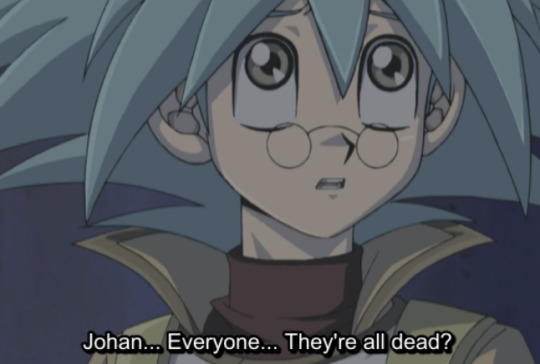
Judai: But at least I avenged them. Sho I'm really glad you're alive.
Sho: Those words... they're just lip service. Bro... bro, you're selfish. Before now, I thought of you as the sun. Someone who gave others energy and made the impossible possible. But, I was wrong. All you care about is getting your way. You don't care who you sacrifice. You'll do anything in the name of your goal. Avenging them won't bring back the people you sacrificed. You're just dueling to satisfy yourself.
Judai: O'brien!
Austin: I thought I told you to wait.
Judai: Are you saying what I did was wrong?
Austin: Think it over for yourself.
Judai: Why? What did I do that was so wrong? I... I did the right thing! And yet... everyone keeps leaving me! What... What is wrong with me?
Supreme King: Yuki Judai. To be willing to be evil to defeat evil. This world exemplfiies survival of the fittest. It must be ruled with power.
Judai: Power? I don't have that much power...
Supreme King: You hold the Super Polymerization card in your hand. Defeat the spirits that stand against you. Breathe their lives into it and complete that card.
After this point Judai decides to sacrifice everything else for power, and to complete the Super Polymerization card he's already sacrificed four friends four.
It's the culmination of an arc where Judai's only been praised for his strength and his ability to win duels. Where he constantly has been called to win duels to solve problems, until that stops working. When everyone is gone, all that's left is his strength. He had to keep winning to keep people safe, but even that wasn't enough, he was still missing something.
He knew he was missing something, that there was something wrong with him and he didn't know where to look.
Conclusion?
He needed power. If he had power, then he wouldn't have lost. If he had power then everything would have turned out alright. He didn't have the strength to carry everyone's burdens for them, that's why he lost, so what he needs is more power. He's been demanded to win, win, and win again so now winning is all that matters.
Now we have our second question: Is Judai's hero complex a good thing?
That's a definite no, because the pressure to always win, to always save everyone and carry their responsibilities has now completely broken Judai. To the point where he now believes that the only thing good about himself is that he's powerful, but he now is willing to sacrifice others to gain more power.
My name is the Supreme King.
Now here's the best part about Judai actively having a villain arc.
He does bad thngs. He does a lot of bad things.
It turns out when you're abandoned and left alone to suffer you do bad things, crazy that, I'm sure Yubel would have a lot to say about that.
Judai is also not being possessed in this scenario. They state it several times. You could say he's Shadow possessed in a Jungian sense. The supreme King is the symbolic embodiment of all of Judai's flaws that he's been ignoring until now. You could say Haou is representative of Judai's subconscious that has been repressed for so long until all those flaws finally surfaced, and that the Judai we see on a day to day basis is his ego, that the relationship between the two is a metaphor for conscious and subconscious.
Jim does a deep dive into Judai's mind, where we're shown a symbolic sequence of what the inside of his head looks like. Judai witnesses his friends appear in mirrors before they shatter one by one, all while he mumbles about how he needs to get stronger.
These are all storytelling devices to show Judai's fractured psyche, but Judai is still in control of his actions. Judai talks and responds to questions when he's addressed. Judai's friends confirm that it's still Judai, he's not a puppet or possessed.
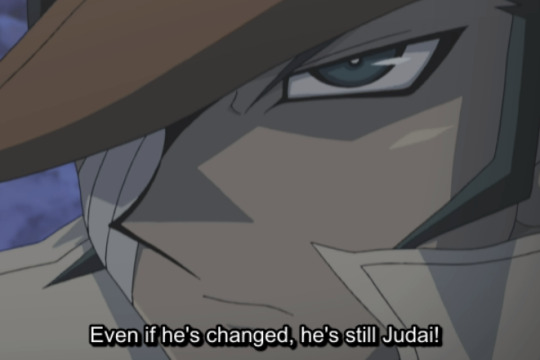
Misawa says later to Judai's face that he and the supreme king are the same person. Judai later is able to use the Supreme King's powers and maintain complete control, because the Supreme King isn't a split personality. Judai even says when Amon is sacrificing someone he loved for power, that he was doing the same thing as the Supreme King, sacrificing everything for power.
We later learn that the ritual that sacrificed four of Judai's friends was a part of Yubel's schemes, but that's the only thing Yubel set up. Judai made every bad irresponsible decision that led to his friends being captured. Judai was the one who snapped and decided to complete Super Polyermization after it was completed. Learning Yubel was behind the sacrifice ritual doesn't take away any agency from Judai at all, because Judai is responsible for his own decisions.
What it does do is create another parallel between them, because we learn the reason Yubel set up the sacrifice was to make Judai walk the same path that they did.
Judai is hurt, abandoned and isolated and in that situation he ends up lashing out at everyone around him in a similiar manner to Yubel. When Judai is put through similiar trauma, he doesn't overcome it in some heroic way because he's an innately good person, no he succumbs and behaves in ways that are incredibly similiar to Yubel.
Even when Judai's friends selflessly try to help Judai, he resists them every step of the way. He ignores their constant calls to him, their comfort, and he even fights them. Judai is eventually reached by the efforts of Jim and Austin combined, but they both die in the effort. Judai is saved because Jim and Austin were way better friends to him than he was to them.
Judai is effectively snapped out of his destructive spiral, but he's left alone with the sobering realization of everything he's done and the blood of two more friends on his hand.
When it's time for our hero to finally face Yubel, he no longer has the moral highground. Now when he faces Yubel it's not as hero and villain, they're just two sides of the same coin. Two people who when they were abandoned, lashed out and hurt everyone around them.
The question is no longer can Judai save Johan. The question now is whether Judai can live with the guilt he's carrying within him, and for that matter can Yubel live with the guilt of what they've done now too?
By this point Judai's been completely deconstructed. He's no longer the hero of the story, he's just a flawed person who needs to fix his flaws. He has the choice to live with his mistakes, and the biggest conflict now is whether he's going to save his villain foil Yubel, or strike them down in order to save the rest of his friends (the three that are left).
This also creates a much more compelling reason for Judai to save Yubel. Not just because Judai is responsible for Yubel's creation, but because they've both made the same mistakes, they have the same traumas and the same scars. Jim and Austin were willing to risk everything to save Judai even when he didn't deserve it, and didn't want it. Now is Judai capable of doing the same thing, of reaching Yubel the way he was reached, not for the sake of saving the world but for helping a friend?
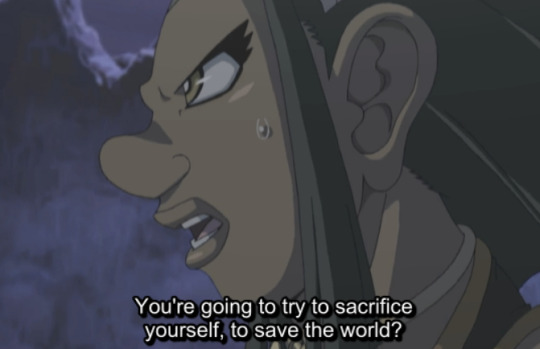
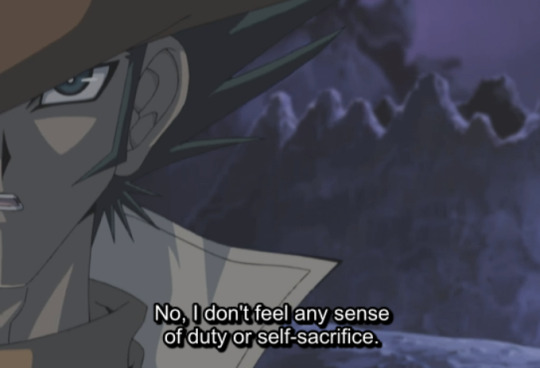
I just want to save my friend. That's all.
This is to me a very compelling setup for the challenge of whether or not Yubel can be saved. Judai's not really saving a helpless victim, he's not acting out of a sense of duty to sacrifice himself for the world, he's being challenged to save someone who suffers from all the same flaws that he does. Judai and Yubel are so similiar at this point it's really just Judai saving himself.
The Dark Deku Arc - Setup
This is the part where I'm actually going to praise MHA. Shocking I know. Season 1 and 2 of Yu-Gi-Oh GX are about 105 episodes in total. The Dark Deku arc begins at about episode 131 with Deku's decision to leave the hospital by himself to hunt down Shigaraki and AFO alone and try to understand villains better.
The 130 episodes up until that point are much better build up, than the first 105 episodes of Yu-Gi-Oh GX. To put it frankly GX is paced like ass. There's far too much filler, and because of that the plot points the anime is trying to make are delivered less efectively. In fact 105 is a good example of what I said above, that ideas are one thing and execution are another.
Season 2 especially is a season filled with good ideas and weak execution due to pacing. Here's one I use as a go-to example. There's a character named Edo Phoenix who's on a quest to find who killed his father. The ending of his plotline is he discovers that in a twist, the man who adopted him is the one who killed his father, and he's been encouraging Edo to investigate because it lets him spy on the police investigation and keep it off his tail.
That's a good twist - however that twist happens in the same episode that Edo's adoptive father is introduced. The audience is given literally no time to even get to know Edo's adoptive father, or get invested in their relationship so the twist doesn't hit at all. A better paced story would show Edo's relationship to his adoptive father early on, get you invested in them, only to pull the rug out from under you so you would feel the shock of that betrayal alongside Edo.
GX establishes its character cast, and yes the filler does give the cast time to breathe and they're all well characterized but because the plot around them is so poorly structured, none of the plot points really hit. Okay, Edo's adoptive dad is evil. Next! You can have good characters, but if you don't put them in a strong narrative framework that challenges them then those characters are just gonna kinda sit there.
The first 105 episodes of Yu Gi Oh GX does succesfully characterize most of the main cast, but it also feels like everyone's just goofing around. In comparison the first 135 episodes of MHA much more successfully builds an escalating conflict. Each new arc either introduces you to a new facet of the world, makes the amin characters more complex, or adds to the conflict.
We basically go from arc 1 "The hero high school is fun" to Arc 2 "The villains are a serious threat" to the Camp Arc "Oh shit, Shigaraki is learning and the villains are getting stronger."
When Bakugo is kidnapped at the end of the camp arc, the tension is ramped way up with the appearance of AFO, and All Might's retirement.
After that point we're introduced to the Overhaul arc, which not only again makes the League of Villains more complex and sympathetic, but also introduces the audience to All Might's more flawed side - the fact that All Might literally worked himself to death saving others and it still didn't work.
Then My Villain Academia -> The Villains are now a threat and they have an army.
Each arc builds on a previous arc, the characters and the world grow more complex, and it feels like you're learning about these complex issues alongside the characters. It just makes Yu Gi Oh Gx look like the silly card games show by comparison, by setting up this very layered world, and conflict, and heroes that challenge the protagonists on what it means to be a hero and what it means to be a victim.
Then all of that great setup.
We are side by side with the proagonist. We, like Deku now want to see if someone like Shigaraki can be saved. We, alongisde Deku want to better understand the villains and learn to see them as people. We want to know if the corrupt hero system can be salvaged.
However, these are too many questions so let's boil it down to two once more, because this is looking at Deku's character.
Deku and Judai are in some ways different as night and day. Deku is an introverted nerd and the victim of bullying, and he starts out with no quirk at all. Judai is a self-confident, charismatic prodigy who instantly seems to charm and befriend everyone around him. Deku desperately wants to be the hero and works his way up there, whereas Judai is just kind of thrown into the school hero because he's the best at dueling.
Judai is kind of a mix of Bakugo and Deku's traits, he's a self confident prodigy who always wins, but he's also someone obsessed with heroes and who has a hero-complex where he's continually forced to save others.
The Dark Deku arc, like the Supreme King Arc looks to take a darker, more introspective look at Deku's character, while also exposing Deku who is a sheltered kid to the a very grey on grey world. It also seeks to deconstruct Deku's suposed "hero complex". Despite the many differences between Deku and Judai I believe the two questions an be boiled down to the same thing.
Is Deku Selfish?
Is Deku's hero complex a bad thing?
These are the questions the series itself is asking in the deconstruction of Deku's character. Deku himself is asking if there's a better way to save villains tha just beating them down or outright killing them, but we'll discuss that later.
Just like Judai there is some setup before this to give a previously very one-note Shonen protagonist mor depth. Deku and Judai are both people who fit the determined, punchy, solve everything fist fight shonen protagonist to a T, on top of being the one to always show up to fight for their friends. Just like in the beginning of season 3, we do have some hints before this that there's something wrong with this attitude. That there's something about Deku that's not entirely there.

There's a flashback of All Might talking with Bakugo where Bakugo discusses that the fact that Deku never takes cares of himself or factors himself into the equation when he always puts others first deeply bothers him and there's "something wrong with it" that's made him always push Deku away.
This flashback also leads into a scene where Bakugo pushes Deku out of the way of one of AFO's attacks, telling him to "stop trying to win this on his own." In an attempt to make Deku see that he's not fighting alone this time.
Deku has also been warned repeatedly about the way his power destroys his own body when he uses it, warnings he's repeatedly chosen to ignore. Saving others isn't just a goal for Deku, you could arguably say it's a method of self-harm and that's what unnerves Bakugo. Bakugo even gave a similiar speech in the past, about how someone like Deku shouldn't take all of the bullying that Bakugo has given him over the years and still try to be his friend afterwards. At this point it's not really like Bakugo's done anything other than tone down the constant insults a little bit, he hasn't apologized or anything but even this early in the manga Deku has a tendency to just let Bakugo's treatment of him go. It's not like they were super best friends forever before the bullying started either despite what the shippers might tell you. Bakugo is saying it's weird that this kid just takes it, and takes it, and takes it without fighting back like he doesn't care about how people treat him and Bakugo is right... that is weird!
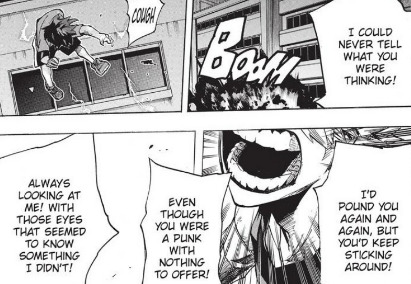
Deku either has such low standards for how he's treated that he just lets Bakugo get away with it, or he just doesn't hold a grudge when he is mistreated because his pain and his suffering just always matters less. Either way it's not healthy, and it could be indicative of a deeper problem hiding behind the surface.
Either way there's setup here, because on one hand you have everyone and their grandma praising Deku for his "drive to save others that eclipses all common understanding."
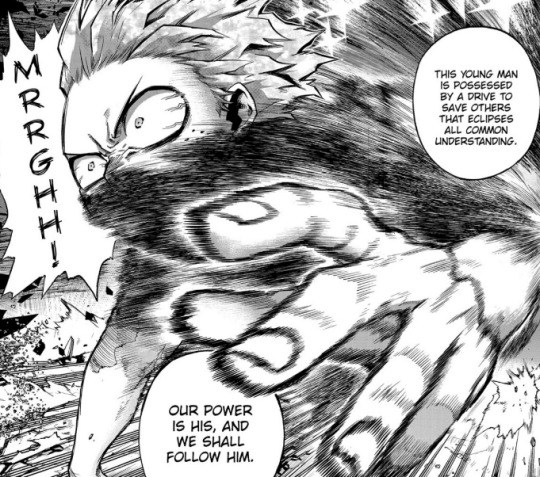
While at the same time he's criticized by Bakugo for having no regard for others. This could be the setup for the character trait that led to his earlier success leading to his downfall later. In Judai's case, everyone praises his purity of heart, but then that purity is later criticized as childishness, naivete and a refusal to grow up.
As for Deku...
How can you protect others if you can't even bother to protect yourself? How can you save others if you can't save yourself? That's the question Touka asked of Kaneki in Tokyo Ghoul when she rightly called out his desire to protect everyone at the Anteiku Cafe as just a roundabout way of getting himself hurt by acting recklessly.
In Kaneki's case he's not trying to protect anybody, he's just picking battles against the doves and getting himself hurt. He's acting out a hero complex in the sense that if he feels like he didn't fight his friends battles for them like Judai then he wouldn't have any friends to begin with. That's why Touka also says "Besides that, everyone doesn't belong to you. You have no business protecting us."
Is Deku fighting for the same reason? Does he harm himself to protect others because he views himself to be worthless and the only way to demonstrate his worth is try and fight to save others?
We don't get an answer for that question. Judai thinks duels are fun, and he's really good at them, and because he's good at dueling he's made friends. He think to keep those friends he has to keep dueling for the sake of others.
Deku's not motivated by the idea of protecting or keeping his friends, that's a secondary motivation. All we have on Deku is that he feels a strong desire to save others, and that he worshipped heroes like All Might growing up but has a naive idea of what a hero is supposed to be. However, his lack of motivation could be the "something that's missing" just like Judai has.
The GX writers did some hardcore digging into Judai's character by focusing on how shallow he was in motivation compared to everyone else, and showing that to be a symptom of his childish naivete.
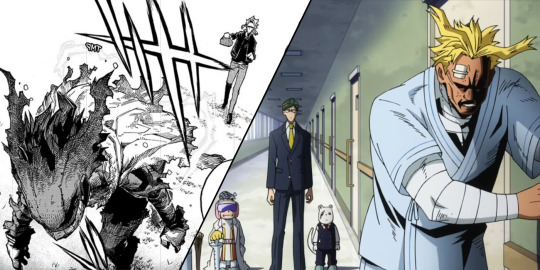
There's also the potential parallel between All Might and Nighteye's breakup, and Deku's decision to leave all his friends behind to hunt for Shigaraki himself.
Even if Deku doesn't have a deeper motivation than just "an unnatural drive to save others" then you could show the effects of Deku walking down the same path that All Might did, the belief that he has to be the one to save everyone singlehandedly and if he rests for a single moment than someone might die, leads to him not only destroying his body, but also doing permanent damage to all of his social relationships.
Even if Deku's motivation isn't too deep, you could still have the traits that led him to earlier success now driving him to ruin as the story punishes Deku for his excessive selfishness.
This is also where we finally get back to Deku's goal of understanding Shigaraki, and contemplating whether or not it's possible to save villains without killing them.
I draw a parallel between this and Judai's enemies calling him out on lacking "darkness of the heart" and that without understanding that darkness he can't win.
Judai's lack of darkness of the heart means two things, he's not mature enough to understand the reason why his enemies are fighting, and he's also not mature enough to se the darkness in his own heart which is why he ends up blind to his own flaws and making pretty severe mistakes later on.
For Deku, it's mainly a lack of understanding of the motivations of the villains he's fighting again, villains he's only ever really beat down with his fists until now.
However, for Deku lacking darkness of the heart you could also re-contextualize that as meaning because of his idealization of heroes he's never once looked at the darker sides of hero society that might have driven people into becoming villains.
Deku's lack of inner darkness may just come from the fact that compared to the villains he's fighting against, he's gotten to live a pampered life. Without understanding that darkness, he can't be a full person because he'll still be a naive sheltered child, and not an adult wise to the way the world works and the moral greys he inhibits. Either way, it's just as necessary for Deku to gain an understanding of "Darkness of the Heart' as it is Judai.

So here's all the setup for the start of Deku's Dark deconstruction arc. As different as these characters and scenarios you can still boil it down to those three narrative questions about Deku / Judai, is there behavior selfish? Are there hero compelexes a good thing? Do they need to understand darkness of the heart?
Before moving on I'm going to summarize Deku's setup as thus:
Deku's actions are selfless.
Deku's motivations are also selfless (a desire to save others).
Deku does not benefit from saving others in any way, if anything he actively harms himself in order to do so.
Bakugo finds this behavior incredibly disturbing.
All Might destroyed his body and burned all bridges because of similiar flaws to Deku.
So the answer to the first question is Deku selflish? No. Is his hero-complex a bad thing? Potentially.
While Deku himself decides that he needs to understand darkness of the heart in order to better understand villains. Deku is actually more set up to contemplate darkness of the heart than Judai is, because Judai charges into the dark world blindly with only the motivation of saving Johan not even caring for Yubel, while Deku has the explicit motivation of trying to understand the little boy inside Shigaraki.
DEKU LEFT THE HERO ACADEMY
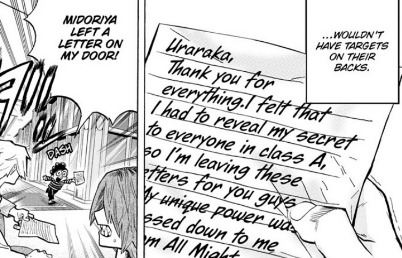
Deku begins the arc by leaving alone to go searching for Shigaraki, with hand-written letters addressed to all of his friends that tell the truth about One for All and also say Goodbye. He makes the deliberate decision to leave them behind so they don't get targeted alongside of him. It's a pretty classical superhero motivation, I need to cut myself out of my loved ones life in order to protect them. Of course this sort of ignores that everyone in his class has super-powers too, but you know heroes they're all such drama queens.
Is this selfish behavior?
This is going to be the only time I'm going to solidly answer yes. Deku clearly did not take his friends feelings into account. His desire to protect them, is more important than their own agency. They also might want to fight alongside him, they'd be upset if they saw him die or get hurt trying to protect them. Deku thinks of his own feelings of wanting to keep them safe and not being able to handle the emotional burden of protecting him, more than he does their own personal feelings.
This is also something that All Might did they permanently burned all of his bridges with his sidekick and friends, and deeply hurt his sidekick who was just asking him to take a break so he did not get himself killed and quit because he didn't want to watch All Might slowly kill himself by inches.
Deku is being selfish here, and later on when he does face his friends he even acts pretty condescending belittling them and insisting they can't fight on their own or keep up with him.
However, I need to ask a secondary question.
Is there any lasting consequences for this selfish behavior?
Besides the fact that it hurt his friends feelings for a little bit, no. I spent a much longer time covering this in Judai's sections because Judai's selfish behavior led to character conflicts. Judai disregarding his friends led to everyone starting to resent him in the Dark World, and their once tight-knit friend group further falling apart.
Judai on three seperate occasions makes impulsive decisions to run ahead without consulting with the group. The second time he outright lies to the group and sneaks ahead without them. THe second time all of his friends are captured when they go after him and try to follow him to give their support because they're worried about him. The third time he makes the decision to run ahead, he knows about the danger they're in and the risk of getting captured and he just blatantly ignores them. When Austin notices they're missing Judai doesn't even go looking for them because they're not a priority at this point - saving Johan is.
This is something that has very real and lasting consequences in the story, they're captured because of his recklessness, and sacrificed in front of his eyes. Even though they technically come back in season 4, the trust between Judai and his friends is all but gone and he's alone for a lot of Season 4.
Judai's decision to abandon his friends has direct and lasting consequences. He is being punished for his hero complex. Running ahead, and fighting alone against the bad guys is what Judai has always done and what's worked before, but now in a more complicated world it's not cutting it and Judai is being challenged for his flaws.
Deku hurts his friends feelings a little bit, but even in that case the focus is on how sad it is for Deku, how hard it must be to be a noble hero fighting alone.

Deku's Mary Jane and Spiderman bullshit never impacts his friends directly, other than the fact that they find it slightly condescending. His "I need to keep secrets from my loved ones attitude" is challenged because his friends want to fight alongside him, but there's never any narrative punishment delivered to him. It's just solved with one fight scene and a character holding out their hands. Whereas, the consequences for Judai's rash actions last two seasons.
I call it "Mary Jane and Spiderman" Bullshit, because Spiderman keeping his identity a secret from all his loved ones is a big conflict in the comics. Something that got Gwen Stacy killed, because Peter Parker never told her his identity in order to protect her, and then that just ended up with Norman Osborne finding out about her anyway and kidnapping and killing her.
You might have heard of the "Death of Gwen Stacy" it's a pretty famous moment in comics. It's also a case where it shows that the Hero's failure to communicate honestly with their loved ones in the name of "Protecting Them" can actually get them killed.
There's even consequences in MHA itself for heroes choosing to sacrifice their personal lives to help complete strangers. Shigaraki literally made a whole speech about it. Kotaro Shimura is traumatized for life over his mother's decision to abandon him instead of giving up on being a hero. Nana Shimura believed she was doing something selfless in sending her child into foster care to keep him out of AFO's clutches, but that was shown to be wrong as AFO just found Kotaro's household and then destroyed him later on in adulthood anyway.
So in the story we are shown scenarios where choosing to abandon your loved ones in the name of "protecting them" can have disastrous and lasting consequences, but as for Deku himself, the decision to leave the school has basically no consequences whatsoever.
Well, Deku making the decision to fight alone is something that might lead to some consequences. After all, Judai's breakdown came about because he always felt the pressure to fight alone and carry everyone's weight on his shoulders until he couldn't.
Perhaps, with Deku fighting alone to protect everyone we'll reach a similiar breaking point. Just as Judai couldn't handle carrying everyone's burdens, looking for Johan, and leading his friends into the Dark World all that the same time and eventually broke down maybe we'll see Deku break down because he just like All Might can't carry the burdens of an entire nation - oh wait nevermind he's working with the Top 3 Heroes.
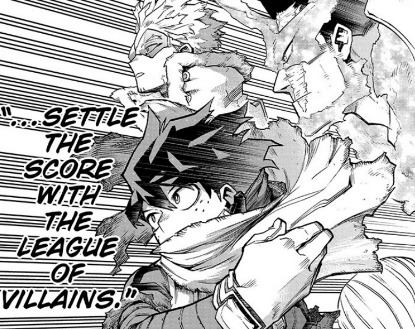
Even the premise that this is Deku leaving the school, to become something like a vigilante wandering the countryside trying to fight AFO on his own is just incorrect because Deku is receiving government assistance right now.
In the Dark World it was really just Judai and his friends, so every single bad decision Judai made had consequences because they were well and truly alone. Deku has backup so he's not even really "alone" in the arc that's supposed to be about him fighting AFO and trying to understand Shigaraki alone.
ALL YOU'LL FIND IS BLOOD AND VIOLENCE
Let's briefly focus on questions two and three, is Deku's hero complex bad, and does Deku need to understand darkness of the heart?
Judai's hero complex was based on the idea that if he wanted to have friends he needed to fight for them and solve their problems for them.
Judai got in such an unhealthy negative feedback loop, that he had to carry his friends burdens in order to maintain his friendships with them, but at the same time he couldn't receive any help from them because he made their friendship all about him carrying their burdens. He was operating underneath an amazing pressure to always win until he lost. The very thing he did to try to maintain his friendships, keeping his friends at arm's length and fighting alone is exactly what ends up driving them away and leaving him alone.
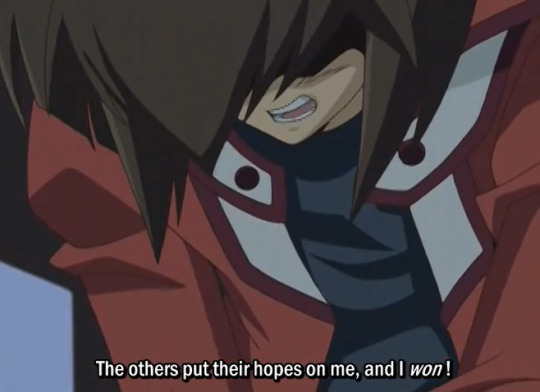
But, still...!
They're all... They're all gone. There really was something missing in me. But what is it? What was missing? What should a duelist burden themselves with?
Judai paradoxically fights alone in order to keep his friend group together, which only ends up with him losing four friends and being abandoned by the rest when they're disappointed for him in his selfish behavior. Judai screams out why, realizing he did something wrong here, that something went wrong because he's been winning duels, he's been fighting the same way he did before only to end up with the worst option possible. The realization that he is truly alone breaks him down entirely.
Judai's hero complex unwravels when simply charging ahead to fight doesn't work for him anymore, because the situation becomes more complicated than that. Darkness of the heart can mean many things. Judai not understanding his own personal flaws. Judai not seeing how his flaws are affecting others. Judai not looking at other people's emotions, he doesn't hear or respond to criticism when his friends start trying to tell him how is selfish decisions making is making them feel.
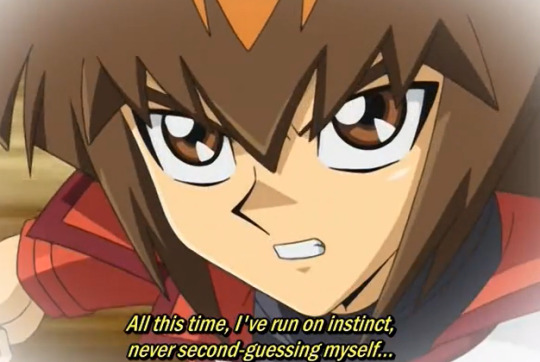
I can't just stay and wait. All this time I've run on instinct, never second-guessing myself. If I just stand still now... I'm sure I won't be able to start running again. And I won't be able to get to Johan.
Judai's hero complex has a clear source - he believes he has to keep running ahead and fighting for his friends the same way he always has in order to keep those friends and if he stops he'll lose everything / succumb to the guilt he now feels about being uanble to save Johan. His Hero Complex also has clear consequences, him running ahead without thinking gets all of his friends kidnapped and used in a sacrifice ritual that could have been avoided if he had made different choices.
Spiderman kills Gwen Stacy because Peter Parker deciding to not tell her about his secret identity to protect her backfired and made her an easy target to the Green Goblin.
Heck, Spiderman's entire character is about how the burden of being Spiderman and his Hero Complex constantly sabotages any attempt he makes at having a personal life. Miguel O'Hara's catchphrase in the incredibly popular Spiderman movie is that "Being Spiderman is a sacrifice" and he's not wrong either.
SO, is the narrative punishing Deku's hero complex in any way?
Well, the one warning he did receive that if he kept fighting he'd lose permanent loss of his arms turns out to not matter anymore because his body is just stronger now.
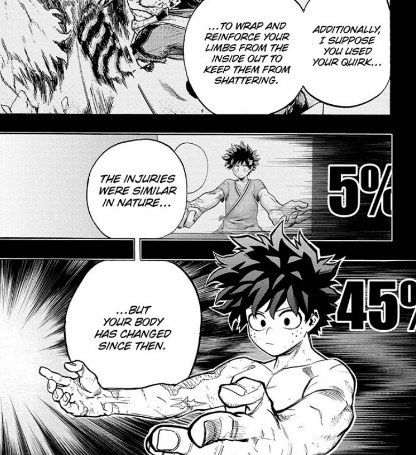
So, even the phyiscal toll of fighting alone that's a consequence for Deku doesn't actually apply here.
I keep talking about consequences but what do I actually mean? Am I talking about strictly punishment? Do bad things need to happen to characters in order to get their lessons?
Not necessarily.
When I say "consequences" I mean in terms of actions always having consequences in a story. The best stories are succinct, that means you basically cut down in as many frivolous details in a story as much as possible so everything that happens onscreen is something that matters and contributes to the whole. Therefore, every action should have a consequence directly seen onscreen in story. Stories are all actions and consequences, the choices the characters make should have direct impact on the plots and the other characters because it makes those choices seem like they matter.
If the story constantly draws attention to the fact that Deku is afraid of ducks, but the story takes place on the moon and there are no ducks living on the moon then that's a wasted plot thread because there are no consequences. If a character does something bad, other characters should discuss it, or it should negatively impact them in some way.
When Judai decides to run ahead without all of his friends for the first time after they all agreed on a plan, the result is the next episode they all start talking about their shared doubts with Judai when he's not around. If they all just swept Judai abandoning them under the rug, then Judai running ahead and leaving the others alone doesn't feel like an impactful character flaw.
There's no lasting consequence for Deku's hero complex. It doesn't drive him to any kind of breaking point like it does Judai.
I think the reason why is because there's no real moment of failure for Deku. When he tries to ask Muscular why he fights, and Muscular rejects him and says that he was just born evil and has no deeper motivations, Deku's not frustrated at all.
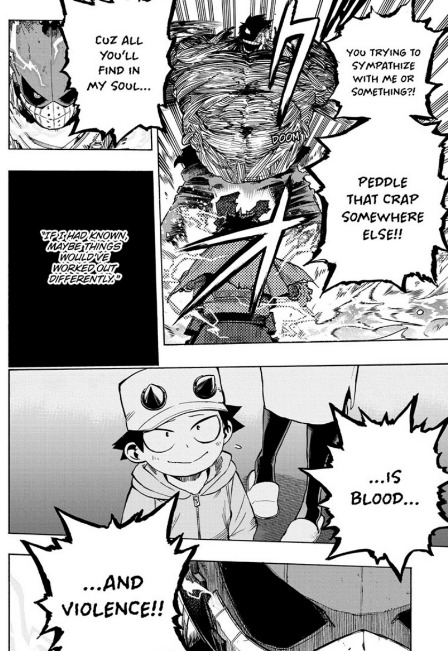
Deku who feels a "unnatural desire to save others" isn't really bothered by the fact that Muscular insists that he can't be saved and that they can only fight. Despite this technically being a failure, Deku has failed to talk a villain down, failed to find a way other than fighting and also failed to understand the darkness in someone's heart it's of little consequence because it's not framed as a failure.
Deku just punches Muscular, back to the drawing board.
There's another manga called Choujin X running right now, where the main character is on a similiar quest trying to see if there's a way they can save the big bad Sora Shihouhin, and when he is forced to fight against a villain who won't back down, de-escalate, or listen to reason he has a complete emotional breakdown.
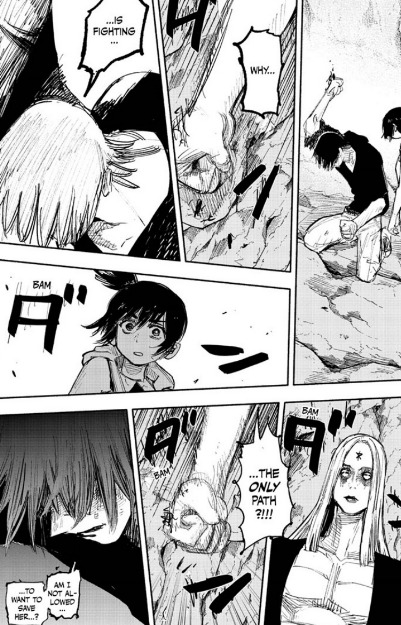
This is the reaction of someone who's genuinly invested in the idea of saving the villain, and frustrated with the reality that he might not be able to save her, that he can't talk to the villains or convince them to back down. Tokio's not even characterized by an unnatural desire to save others like Deku is, so why is he the one breaking down and not Deku someone apparently so selfless that he wants to save the mass murderer that's trying to destroy society?
If Deku's desire to save others is so strong why doesn't he show frustration at being unable to talk down, or understand Muscular?
Judai is stuck in a negative feedback loop where he's forced to fight for others, because he believes he has no worth to his friends otherwise. All we're told of why Deku feels the need to save everyone around him is that he's just like that, he just feels like saving everyone no matter who they are the moment they come into view.
If we're choosing to characterize Deku that way, then number one he should be attempting to save everyone, and number two the stress of having to save everyone is something that should get to him. His "Hero Complex" should be what's breaking him down at the moment. The unnatural desire to save everyone around him that led him to so much success should be what's punishing him this arc.
Judai felt pressure from two aspects, first the pressure to carry everyone's burdens, and second the lack of understanding of darkness of the heart. Unlike Judai who doesn't want to understand darkness and who avoids it as long as possible, Deku goes into this arc actively seeking to understand how his villains think.
Deku and Judai also suffer from a lack of darkess in their own hearts. This leads to them having empty motivations. Judai has a childish desire to enjoy fun duels. Deku has a childish desire to save everyone. Neither of them have tried to grow or change or even question those motivations in any way and because of that they're stunted people.
Judai doesn't know why he fights. He doesn't question why he fights. He just takes on the burdens of others to give him something to fight for. This all together leaves Judai blind to his own personal darkness, and also because of that blindness he can't grow in any way because he never evaluates himself, he never looks at himself and tries to change.
When he's on his knees and at his breaking point he screams at the top of his lungs, "WHY? WHAT AM I MISSING? WHAT DID I DO WRONG?" simply because Judai's never thought about these things.

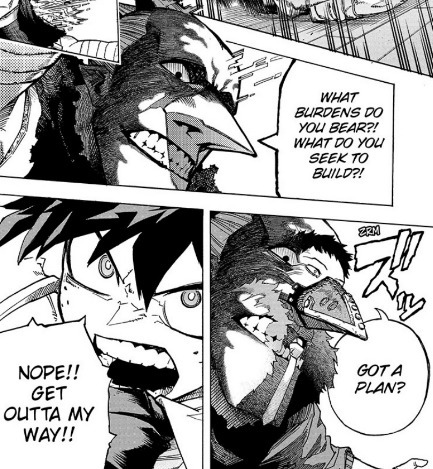
Deku's asked these same questions both in the Dark Deku arc, and hundreds of chapters later he's asked what he's planning on doing as a hero in order to make things better and Deku never materializes an answer.
Pre-Dark Deku Arc, during Dark-Deku Arc and Post Dark Deku arc, Deku always solves his problems by recklessly jumping in and saving others. There's never any point where he's punished or criticized for this behavior in any significant lasting way. He never has to self reflect and develop a reason on why he wants to save others, or eve think about how he's going to save others, he can just keep acting as the rash, impulsive hero.
Judai and Deku are both characters who are empty, and lacking in motivation but Judai is ruthlessly criticized for that until he reaches his breaking point and is forced to look at his motives.
This once again comes from a lack of failure on Deku's part. Deku never fails the way that Judai does. There's a scene where you could have easily had Deku fail. The entire Nagant vs. Deku fight where Deku fails to give her any substantive answers to his questions.

Imagine if Deku's simple philosophy of always extending a helping hand failed here. Imagine if Deku actually got deeply ivnested in the idea of saving Lady Nagant, and did his beset to talk and reach out to her but his answers weren't enough and because of that she just chooses something like suicide. Imagine he has her by the hand, and she's dangling off of the roof and he thinks that his impressive move to save her should have been enough - he's reached out a hand like always. He thinks this should have won her heart over, by showing her that someone still cares in all of her despair.
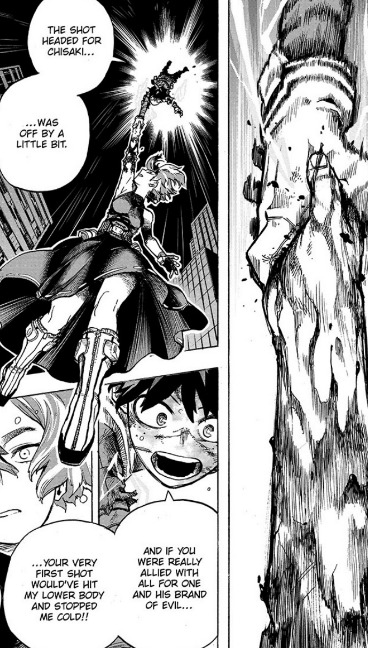
Then, Nagant in one final spiteful move lets go. The person he heard her entire backstory, the person maybe he once was a huge fan of her when she wasa hero, the person he wants to save the same way he wants to save Shigaraki chooses to let go and fall to her death because dying would be better than living in whatever kind of corrupt world that Deku is trying to build.
This could be Deku's Gwen Stacy moment. Spiderman carelessly webs Gwen Stacy whe she's falling to catch her and for a moment he thinks he's saved her because he's overconfident and has caught people falling like this a thousand times, only to find out he's snapped her spine. His overconfidence, his hero complex making him believe everything magically would work out led Gwen Stacy to her death. This could show the simple act of just offering a hand out to someone in need isn't enough, without empathy and understanding.
Instead, AFO just blows Nagant up in Deku's face.
Except, that isn't even a failure bcause Nagant turns out to be just fine! There's no point in blowing up Nagant except for the spectacle of it, because she turns out to be fine five minutes later and even shows up to fight in the next arc.
There's no consequencs to anything that happens in this scene. Deku doesn't suffer any consequences for being blind to the faults of society. (He's working right alongisde a killer cop just like Nagant and he doesn't even care.) Deku isn't forced to reflect on what saving people or making society better would even mean. He also isn't punished for his lack of understanding the way that Judai is.
Afterwards, Deku denies help to a very mentally-ill Overhaul, who is apparently not one of the villains that Deku wanted to save. There's a whole buch of asterisks on that "Deku wants to save everyone***" goal. This also isn't framed or used to paint Deku in a bad light because Overhaul is unworthy of salvation in Deku's eyes for hurting Eri.
Is this action part of an arc? Is Deku reaching his limit with trying to sympathize with villains only to see people like Overhaul and Muscular fighting him every step of the way and telling him they don't want to change?
Nope, this scene is never brought up again.
Deku never fails, and he never does anything wrong. Even when there are situations where you could argue he does do soemthing wrong, like denying the armless, mentally ill Overhaul help - he's not painted as being in the wrong.
The entire arc is supposed to be about criticizing the protagonist for their hero complex, and their lack of understanding of the darkness of the world but for Deku there's no criticism to be had here.
Compare this to the sacrifice ritual in the Supreme King Arc, where not only does Judai fail to save his friends, but the friends that survive ruthlessly tear into him aftewards for his selfish behavior. THe actions of one protagonist matter, have consequences in the story and are criticized. The actions of another protagonist have no real consequences and are never criticized.
The whole mansion blows up and... nothing happens. No one's injured in the explosion. It may as well have not happened in the story because there are no consequences for Deku just continually choosing to blindly run ahead like his hero complex tells him to.
There's evena moment where Deku winds up in a similiar situation to the dark ritual. After receiving information from Nagant, he blindly wanders into a mansion in Haibori woods believing it to be AFO's base, only to find out it was a trap and AFO was waiting for him to blindly charge in all along.
THAT'S WHAT MAKES US HEROES AND VILLAINS
This is where I'm going to talk about another big similarity between Deku and Judai, and also the biggest point of divergence in the Dark Deku and Supreme King Haou arcs.
Deku and Judai are both character foils with Shigaraki and Yubel respectively. This is where I'm going to praise MHA again, surprising everyone.
The foiling between Shigaraki and Deku is masterful. They both started out in relatively the same place, as boys with dreams to become heroes who were softly told no by their parents. Tragedy struck Shigaraki and he killed his family on accident and wound up alone wandering the street for days until he was found by AFO.
They're both the students of the greatest hero and villain of the last generation. They both end up being surrounded by a group of close Nakama that they want to protect. They're both continually challenged to grow up, and show how they're going to be better than their predecessor for the hero and villain sides respectively. They both have to prove they are worthy successors. Shigaraki has all the heroic spunk and determination that Deku has but on the villain's side, and while Deku loves heroes, Shigaraki is hero society's critic wants to bring down the hero system that didn't save him.
You get the feeling that Shigaraki really is Deku just in a different situation, a same person on the opposite sides of the conflict kind of character foiling.
As the biggest Yubel stan here, in some ways the foiling for Shigaraki works better than the foiling for Yubel because Shigaraki isn't just Deku's foil, he's the foil for all of society. Yu-Gi-Oh Gx takes place in a society run where everything centers around card games, it's not really that deep. In My Hero Academia you have that 100 episodes of great setup where Deku is not only learning to look at the darkness within himself, but also the darkness within hero society around him.
Judai's narrative as much as I love it, is entirety about Judai.
Not only could Dark Deku arc develop Deku's character, it could also say something deeper about the world it's taking place it, because Deku has all these connections to Shigaraki, who also kind of represents the orphaned boy failed on all levels by the society around him.
Shigaraki is the shadow of -> Deku, but also Shigaraki is the shadow of -> all of society.
Yubel is the shadow of -> Judai, and only relates to Judai's personal growth.
Yubel is Judai's personal villain, and was created by his actions as a child. His decision to abandon Yubel into space, led to Yubel being tortured and their later madness.
Yubel is also Judai's shadow. They carry all the same flaws, but those flaws are obvious in Yubel and repressed in Judai. Yubel's belief is that Judai is someone who purposefully enjoys hurting their friends, and that's how he shows his love. While that's twisted it's not hard to see how Yubel came to that conclusion. After all, Yubel loved Judai so much only for Judai to abandon them and turn a blind eye to their suffering. In the Dark World, Judai abandons his other friends continually in order to search for Johan, and they wind up suffering too.
While Judai doesn't sadistically enjoy hurting others as Yubel put it, there's an element of truth to Yubel's criticism. Judai does abandon people, Judai isn't as empathic as he seems to be. When Judai is subjected to the same kind of isolation and abandonment that Yubel has endured for the past ten years, Judai loses his mind a whole lot quicker and starts lashing out at everything around him the same way Yubel has. Judai without the love of his friends starts to hurt everyone around him in his lashing out, the same way that Yubel desperate for love starts to inflict pain on the people she loves. Even before the ritual happened, Judai was unwittingly hurting his friends with his own selfish behavior.
Yubel's stated criticism is "of Judai is "Anguish and sorrow born from loneliness. That is the nature of love as you taught it to me" and further beyond that "When you forgot about me, I suffered. It's hot. It hurts. I am in pain. Why? You know how much I love you? Why did you do this to me, Judai? In that moment I realized that was how you showed love. Because you loved me, you hurt me and made me suffer."
That sounds crazy, but hasn't Judai been hurting the people he loved for his own selfish reasons this entire arc? Is it that crazy then to conclude that neglect and abandonment must be how Judai treats everyone he loves, so surely he loves me.
One of the biggest criticisms of this arc is how Judai's behaviors impact his relationships, so of course his most personal villain and foil is his jilted ex nonbinary dragon lover. On a less joking note, when Yubel was displaying troubling behavior as a child, Judai's first response was to abandon them. Which is ironic for someone like Judai so paralyzingly afraid of being abandoned that he became everyone's workhorse and worked himself to death solving their problems for them. Who when abandoned by those friends finally, snaps just as hard as Yubel did when they were abandoned.
Do you see the parallel I'm drawing here? Judai is slotted into the spot of the protagonist who's friends with everyone he meets, who loves and fights for his Nakama. Yet under closer scrutiny he's shown that he doesn't really understand what love or friendship is or how to give and receive love from others in a healthy way. His antagonist is his former childhood best friend, who is obsessed with love and demands that Judai love them back. Judai's lack of understanding of relationships and love takes a dark twist with Yubel, their shadow, foil and antagonist.
These are once again very personal challenges to Judai, society doesn't really factor into this equation. Though, Judai is somewhat challenged as a hero because there's an irony to Judai plunging into the world to save his best friend Johan who he's known for like three weeks, but not really lifting a finger to save the antagonist of the arc Yubel who he's known since childhood and is personal responsible for putting through torture.
That hypocrisy there too, is a personal challenge to Judai that paints him in a less heroic light. He wants to save Johan and ignore Yubel because it's easier, because saving Johan relieves him of his guilt. He doesn't even know what to do about Yubel, so he doesn't try and falls back on his previously established behavior of playing the hero.
The hero is really just a mask for Judai at this point, something the story has ripped right off of his face by the time it comes to face Yubel.
There are two ways in which Yubel serves as an ultimate foil to Judai.
Yubel acts like a callout post to all of Judai's flaws
Yubel represents a dark path Judai could have taken.
This second one is what Shigaraki and Deku have in Common with Judai + Yubel. There's something deeply tragic about the idea that while Deku was making friends, getting taught by a loving teacher like All Might, Shigaraki was all alone being pushed by a ruthless manipulator like AFO into becoming the worst villain.
Judai and Yubel's lives follow the same tragic parallel path. They began in the same place as childhood friends, but after abandoning Yubel, Judai spent the next ten years growing up, making friends in a healthy and safe envirnoment while Yubel the one who was abandoned was alone in space desperately crying for Judai to come save them only to be ignored because Judai has long forgotten them.
However, there's a striking difference there too. Yubel is created directly by Judai's neglect and actions. Whereas Shigaraki is created by the neglect of all of society, it's not Deku's fault directly.
#1 Shigaraki acting as a callout post to Deku's Flaws
However, this is where Shigaraki's callout post comes in. Shigaraki gives a long speech on how the existence of heroes itself, creates villains like him.
"You heroes pretend to be society's guardians. For generations you pretended not to see those you couldn't protect and swept their pain under the rug. It's tainted everything you've built. That means your system's all rotten from the inside with maggots crawling out. It builds up little by little, over time, you've got the common trash all too dependent on being protected. And the brave guardians who created the trash that need coddling. It's a corrupt, vicious, cycle. Everything I've witnessed. This whole system you've built has always rejected me. Now I'm ready to reject it. That's why I destroy. That's why I take power for myself. Simple enough, yeah? You don't understand because you can't understand, that's what makes us heroes and villains."
To break it down simply, heroes look away from the faults in their society, they intentionally ignore the people they cannot save, and when those people turn into villains the heroes beat them down hard. The villain attacks then convince the common people of the need for heroes, and the cycle perpetuates itself. This is all powered by the people's blind, uncritical faith in heroes.
Deku is a person who has that same blind, uncritical faith in hereoes, and until this point has never thought of Shigaraki as anything more than a villain to be punched until he stops. Which is why this is still a callout post that applies to Deku, because Deku's blind admiration for the Hero System is part of the problem that enables the very flawed hero system.
Deku does not understand darkness of the heart, therefore Deku does not understand that heroes could possibly be bad, and he could possibly be supporting a bad system until he's slapped in the face with it.
However, is there a lasting consequence for Deku's blind support of the hero system?
Nope.
I just described up above what could have been a consequence, if Lady Nagant refused to have faith in Deku since he didn't back his words up with action.
Deku also clearly does not want to break away from the corrupt hero system that created Shigaraki, because the heroes that he brought along to fight with him are Endeavor, Hawks and Jeanist, a child abuser, a state sponsored murderer, and a guy who makes bad puns. He doesn't change any of his bahavior that enables the corrupt system to stay in power.
Not teaming up with the Top 3 heroes, and deciding to go full vigilante would have at least have been breaking away from that system.
This circles around to a big underlying problem in this whole arc in that Deku isn't really doing anything different from what he was doing before, and he's not punished for his character stagnancy either.
So we're left with.
#2 Shigaraki represents a dark path that Deku could have Taken
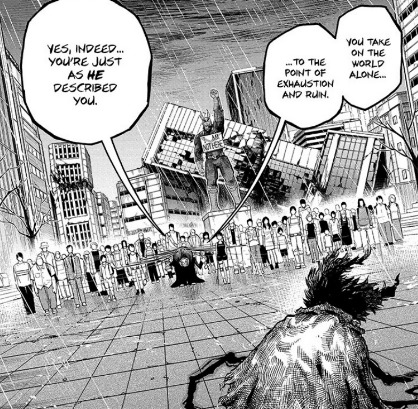
This is where Judai / Yubel succeeds and Shigaraki / Deku falls flat on its face.
When pushed to his absolute limit after failing repeatedly, Judai snaps. With no friends left he decides that all that matters is power. This path seems natural for him because we've already seen what being abandoned and left alone can do to a person and how it twisted Yubel. The story hints again and again at Judai's blood knight tendencies, and that he thinks the only thing he has of value to offer others is strength by fighting for them.
He loses his friends and the fighting is all he has left.
At the point of despair he decides to just embrace power. If he cares about nothing more than strength, at least that will give him some sense of control over his life after the out of control tragedy that happened to him.
"Yuki Judai. In order to defeat evil, one must become evil. In a world with the law of the jungle at work, one must rule with power."
"Power? I don't have that kind of power."
"In your hand lies the super polymerization card. Defeat any spirits who may oppose you, and combine their lives into it to perfect the card."
Supreme King is just a villain persona that Judai adopts to as a protetive blanket for all the hurt and pain they've gone through, just like ding, ding, ding, the villain persona Shigaraki Tomura is for Shimura Tenko.
Judai snapping under such intense pressure shows us that if even the faultless hero can snap, then how much can we blame the villain for snapping under similar circumstances? Maybe the reason both the hero and the villain fell is because they're both equally human and to fall down is human.
Deku never falls down as hard as Judai does. He doesn't even fall down and scrape his knee. There's no instance where he fails to save anyone. There's no instance where his actions hurt anyone. There's no instance where he takes things too far and hurts a villain. I kow it's unlikely for Deku to turn into a villain, but he could have at least gotten so frustrated he turned into a punisher style vigilante! Is that too much to ask?
There's not even a single moment where Deku goes too hard in a fight and injures or even kills a villain. They could have pulled an "I thought you were stronger" moment like in Invincible.
I don't know why this is called the Dark Deku arc because there's no darkness in Deku's heart for him to exploit, nor is he actually called to better his understanding of the darkness in others hearts. Judai understands Yubel's darkness because by the end of his personal arc he's been there, he's not the hero he's the atoner. He can either punish Yubel, or hold a hand out to help Yubel atone.
Deku's arc might as well be called the "My Little Pony Friendship is Magic Arc" because he never does or confronts anything dark. His worst crime is not showering. All that isolation and his repeatd failures in hunting AFO down should have worn Deku down, but it didn't because he's just that special of a boy!
Deku's hero complex also is completely uncriticized from beginning to finish. Judai's hero complex is an unhealthy behavior that utterly destroys him. Deku's hero complex is a job interview flaw.
FRIENDSHIP IS MAGIC
Just to hammer my point in I'd like to compare these two scenes. One is in the middle of the Supreme King Arc, the sacrifice ritual scene where all of Judai's friends are blaming him for the fact that they're about to be sacrificed while he's still trying to save them.
The second is the climax of the Dark Deku arc, where all of Deku's friends are showing up to fight him and convincing him to accept their help.
Just look at how vastly different these two shows treat their shonen protagonists when it comes to his flaws.
For the ritual sacrifice scene. This is immediately after Manjoume wakes up to find that he has been chained and kidnapped with Judai standing right there.
Judai: Sit tight! I'll save you soon!
Manjoume: Wait, is he dueling? JUdai you damned idiot! Weren't you going to save Johan with us!? Getting yourself all flared up. You didn't even stop to think about us at all, did you?
Judai: That's not it.
Manjoume: That's just how you are! You were the only one in your kingdom from the get-go. We were the idiots for getting all motivated with you and feeling some sense of friendship with you being like that!
Then Judai watches helplessly as Manjoume dies. His other friends don't fare much better.
Kenzan: Big Bro? Why'd you want to save Freed's comrades when it meant sacrificing us-don!?
Judai: You're wrong. That's not it.
Fubuki: It's painful. This pain isn't just physical. It's the pain of a friends' betrayal that I have tearing my soul. apart.
Asuka: I'm being betrayed and sent away by you. To think that I'll have to bear a sadness like this.
All of Judai's friends die spitting on him and telling him what a terrible friend he is and that this is all his fault. Which it is, because his decision to abandon them got them captured and led up to the sacrifice ritual.
Now, what scathing criticisms do our heroes have to give Deku after he left them all behind to fight Shigaraki alone?
Denki: Midoriya! We get that all for one is really importnat but you got something even more important in your life! Me and you we aint'g otta ton in common, but you're still a friend! Even if we gotta force this friendship down your throat.
TodorokI: What a look you have on your face. Is this resposnibility so much that you can't let yourself cry? Seems like a burden you should share with the rest of us.
Uraraka: The thing is Deku, we don't want to be protected by you and reject who you are and what you're doing, we just want to be with you (this part is narration).
Deku is told that none of his friends are mad, they want to be by his side no matter what, and that it's okay for him to cry.
I should also mention how underdeveloped this supposed nakama group is in the manga itself. The entirety of Season 3 of GX is tha the bond between Judai and his friends are more shallow then it appears, but he's also spent two whole seasons bonding with a group that consists of: Asuka, Sho, Kenzan, Fubuki, Manjoume. That's six people total including Judai who serve as is primary friend group. Their friendship is more unhealthy than it appears, but Judai has spent the past two seasons hanging out with one small friendgroup.
Meanwhile the entirety of Class 1-A shows up to tell Deku how much they love him and how much he means to them, and Deku's hung out with maybe like... four of them?
You have one bond shown to be how shallow it is, and one shallow bond treated like it's the deepest, most loving friend group in all of fiction. Deku doesn't even receive some lgiht criticism for how inftantalizing it was for him to abandon them for their own protection, because no one resents Deku or is capable of holding any negative or critical emotions towards him whatsoever. He's just told how much everyone loves him and wants him to come home.
And yes, Judai also does get two characters sacrificing themselves to try to reach him when he's the Supreme King.
However, as I stated above Jim sacrifices himself to help Judai because that's who JIm is as a person. Austin does it after Jim fails, both to honor his friendship with Jim, and also because of someone who got scared and ran he feels like he has to confront the darkness of the heart.
Jim and Austin O'brien's sacrifice is also a sacrifice. They died trying to save Judai, and Judai has to wake up with the knowledge that not only did he kill a bunch of people in his quest for power, he killed two more friends who were only trying to help him.
At the end of the arc, Judai has woken up with the knowledge that he has done bad things that can't be taken back and he's barely better than Yubel at this point.
At the end of the Dark Deku arc, Deku gets a speech from Uraraka about how amazing and selfless he is, and how he never gives up and how he always pushes forward, and how everyone at the UA shelter should appreciate him more.
The Supreme King arc exists to criticize Judai. The Dark Deku arc does nothing but flatter Deku from beginning to end.
Judai's hero mask is ripped off and he's forced to be a person. Deku's hero mask stays on, his hero complex is unchallenged, and he's praised for being teh greatest hero evarz.
I often get accused of not liking MHA simply because I expect it to be a different story than what it is. That I want it to be darker, when it's a more optimistic shonen manga.
However, here's my secret. I hate edgy superheroes. I don't like watching stuff like The Boys because it gets too dark for me. The oly reason I read invincible is because my friend told me that Omni-Man got a redemption arc. My favorite DC Superhero is Superman. My favorite Superhero of ALL TIME is Spiderman.
The thing about Spiderman though, is that it is hard to be Spiderman. The entire point of Peter Parker's character is that he has a terrible work/life balance and constantly loses people around him because being Spiderman is a sacrifice. The story doesn't bend over backwards to praise Spiderman as being a selfless hero, in fact it points out what a loser he is constantly. Peter Parker's friends are always frustrated with him and he's a wreck of a person.
Yet, the fact that being Spiderman is such a sacrifice and he keeps choosing to make it, shows what kind of person Peter Parker is, and that's just a person who does whatever he can to help out.
Even Peter Parker, the nicest, most well-intentioned boy ever has the Symbiote arc. One of the most famous arcs in comics dealing with Peter is when he lets Venom graft onto his suit, and even though the symbiote makes him violent, and makes his behavior change he spends the longest time not wanting to peel it off because the power boost the symbiote suit gave him made his life that much easier.
Dark Deku is an obvious reference to the Venom Suit, but a completely shallow reference because Dark Deku acts exactly the same as regular Deku the only reason he looks like that is he forgot to take a shower.
Superhero stories don't need to be Dark Deconstrutions, but they do need to be SOMETHING. They need to say something about the character. The problem with the Dark Deku arc isn't that Deku didn't experience a villain arc.
It's that nothing of consequence happened in the entire arc. Nothing changed. The story asked us if Deku's hero complex was a bad thing, and then it didn't deliver any answer. The story asked us if Deku needs to understand darkness better and then didn't answer that.
These are ideas that the audience promised were going to get answered. We were told Deku was going to get his development this arc that he was going to be pushed to the edge. The entire premise of this arc was that it was supposed to better help Deku understand Shigaraki and Hero Society only for Deku to not learn about either of those things.
Deku's learned nothing. We've learned nothing. Nothing has changed in the story itself. The only thing we've accomplished was wasting a lot of time that we could have been using watching Yu-Gi-Oh GX!
#mha meta#ygo gx meta#yu gi oh gx#yuki judai#judai yuki#supreme king haou#supreme king jaden#supreme king judai#yu gi oh gx meta#dark deku#ygo#ygx meta#ygo meta
146 notes
·
View notes
Text
Why the Llama Incident works
The noodle incident is a trope done in A LOT of shows (PNF has a whole TV tropes page dedicated to its noodle incidents). Technically getting disowned and raised by ocelots is a noodle incident in pnf... we never do know what gets him officially disowned and how he ends up in the care of the ocelots). The noodle incident is meant to just showcase that this character has a history of some sort.
Generally speaking, explaining a noodle incident is a bad idea because the unknown has infinite potential. The intrigue is part of what makes it interesting. People can come up with ideas that are absolutely out there themselves. Usually, coming up with something that will live up to the hype is impossible because the hype of the event has built it up to impossible levels.
Emphasis on the usually.
They literally called it a llama incident. They knew what a noodle incident was, and were purposefully playing with our expectations that it would be an unrevealed event. And, as I said before, PnF has already dealt with its fair share of noodle incidents that go unexplained.
And as a noodle incident it served its purpose. Generally a noodle incident will provide context on what the status quo is without spelling out the details. In Rollercoaster the Juggling Monkey's noodle incident tells us that this is not the first time Phineas and Ferb have had a Big Idea (in fact we never do get what Phineas and Ferb's first Big Idea was). In Milo Murphy's Law the Llama incident tells us that Milo and Melissa were getting into Murphy's Law shenanigans long before Zack came into the picture. Showing us that they're so familiar with each other that situations that might require more context to another person doesn't.
Now bear with me as I go on a bit of a tangent that I promise is related.
The main cast of Milo Murphy's Law is a trio, and one of its members is defined by being the new guy. Zack is kind of an audience surrogate. Melissa is Milo's childhood friend and Milo has lived with this all his life. Generally, they don't need to explain anything to each other, nor do they need to explain anything to their class who is already at least passingly familiar with Milo. But they do to Zack.
I don't necessarily think MML NEEDED the audience surrogate character per se. Quite frankly I think audience surrogate characters are rarely necessary. You can always just start with a group of friends and fill in context via implication. I think it's just significantly harder, because you run the risk of alienating your audience by not allowing them to get settled in what is going on or having your characters talk about things like they don't already know what is going on.
But I don't think its at all an inherently bad storytelling method. I personally find outsider POVs delightful, and a good audience surrogate character is an outsider POV, at least at the start. Zack being new to the whole Murphy's Law allowed him a story about choosing to engage with the hazardous kid, winning him loyal friends and a set of skills he never would have dreamed of before. We get to see him grow, and we wouldn't have seen that if he was Milo's friend the whole time.
On the other hand he also has a bit of a wild background, as the former lead singer of a locally famous lumberjack themed boy band. Which gives Milo and Melissa the chance to join a band. Or for Milo to have a real birthday party. A change in status quo provides opportunities for growth and change, for the whole cast, which is useful in more overarching stories... like MML. It's not NECESSARY of course. Zack could have been a classmate that had always kept his distance before he accidentally got tangled up with Milo and decided he was cool. But there's nothing wrong with him being straight up new either.
And at the most basic level, Zack's complete unfamiliarity provides a nice contrast to Melissa's familiarity and Milo's day to day life. Zack is starting from 0 while Milo has been dealing with this every single day of his life.
So Zack isn't going to know what the Llama Incident is. And while noodle incidents being unexplained is fun for the audience, it isn't going to be so fun for someone who is constantly living with people who know what this Llama Incident is. Of course they could have told Zack the noodle incident off screen, it would have made for a good gag to cut into the story with Melissa and Milo finishing telling Zack the story. But instead, we are treated to an episode that has Zack really beginning to slot into his life as Milo's friend.
Back to the main point.
MML is one of the only shows with enough sheer chaotic energy that it could actually pull off making a group of seemingly unrelated references into a cohesive genuinely interesting story. The whole show is things that could feasibly be noodle incidents, which makes it easy to get a baseline for what could have happened. Milo uses stuff in strange ways all the time, getting tangled up with weird animals and ending up in strange situations. There's no REAL reason to feel like we're missing out on too much. It sounds like a normal Milo situation, just with only him and Melissa... and the fact they keep bringing it up.
And really, if you think about it, its just Planned in Advance Meapless in Seattle. Meapless in Seattle was meant to be a bunch of unrelated clips meant to be a noodle incident of sorts. We wouldn't know what exactly would go down in that fake episode. But they managed to bring everything together into a really fun episode that made sense and honestly lived up to the hype. (At least for me). I mean. They somehow made it work. That's a feat in of itself.
The episode "Llama Incident" starts out implying a completely different noodle incident. We never learn how the kids end up on that branch. That's not important. That stuff happens all the time. Is the Llama Incident more interesting than the other stuff Milo gets into? Not particularly, but it DID involve him using more stuff he didn't normally use.
And the Llama Incident is told in the format of a story. Changing up the format of the episode is always a good way to make an episode feel fresh. I mean, look at The Remains of the Platypus. It's just an episode told backwards but its delightful chaotic fun. Or Delivery of Destiny. Really the only difference is the day follows the perspective of a delivery guy, but we get all our normal plot beats. But both are some of my favorite Phineas and Ferb episodes. If you remove their gimmicks they're pretty basic. Phineas and Ferb build a cheese themed amusement park, and Doofensmirtz's plan is only slightly more novel with brainwashing Perry. Phineas and Ferb building a ride and Doof juicing city hall are pretty typical of them, but Paul's semi-outsider POV (and being one of the closest characters we get to having the full picture of the story we the audience see), makes it feel fun and fresh. It makes the Llama Incident feel special. Even if it isn't my favorite unique episode format, it's still something fresh and fun.
So Milo and Melissa sort of tell the story a bit out of order, because they forget what pieces Zack would and wouldn't have context for or would or wouldn't find interesting. And, again, it's told as a story to Zack, so he asks questions. It's told while they are hanging from a branch, where they cut back to every once and a while to remind us that hey, the group is in the middle of a whole other Murphy's Law incident. We're getting two for one today.
But through the episode we get a bit of a Zack character arc. We've already established that Melissa and Milo are used to this, even if you weren't aware the way they were casually rating it at the beginning of the episode should tell you all you need to know. But Zack isn't completely used to this yet, so he's just nervous. He spends the episode using the story as a distraction, but being genuinely invested. In the end, the story acts as an inspiration to Zack, and he's able to help the group get out of the situation. AND for his trouble, he gets his own mysterious incident to reference. After half a season, he's truly part of the group now. He will continue to grow of course, trying to become braver and cleverer, and he's already made strides since the first episode. But even if Zack isn't really any less part of the group before or after its still a significant moment in Zack's character arc.
And then the Llama Incident comes back the next episode. The date was memorable to Milo, even throughout all of the other chaos in his life. And sometimes that's just how life is. And he uses his knowledge of the event, the way it stuck in his mind, to save him, Dakota and Cavendish from Pistachion's in Missing Milo. What we thought was going to just be a noodle incident, a running gag that functioned to establish just how used to this stuff Milo and Melissa were, turned out to be a plot point. To be fair we didn't NEED to know what the Llama incident was for Milo to choose to go there. We didn't need to know about the Llama Incident to know it was typical Murphy's Law shenanigans. It could have just been more out of context llama stuff. But now we the audience are in on the joke, so when Cavendish and Dakota express confusion, we can revel in the fact we know something they don't. Especially about two characters who themselves were slow revealing information about themselves to us... sure by that point we know their deal but at one point they were as mysterious and out of context to us as the Llama incident. And now we know what the Llama Incident is, and what their deal is.
The Woodpecker incident also is vaguely referred to later with the woodpecker whistle. We may not know the full story there, but it is still satisfying to see Milo's adventures giving him the skills and tools to deal with bigger, actually hostile, threats.
And at the end of the day, even if the Noodle Incidentness of the Llama Incident is ruined, it was immediately replaced with the Woodpecker incident. Which admittedly is never mentioned, but it doesn't need to be. The point of the Llama Incident was to draw attention to a specific incident to make a gag out of it. But they have incidents all the time. And we're privy to most of them. We sometimes get references to other incidents that we never fully get the context for. But we don't need context. We know how it'll go anyway because we have a whole show of effective noodle incidents.
#mml#milo murphy's law#zack underwood#I talk a lot about him specifically so he gets special mention
90 notes
·
View notes
Text
Music Genres
When I was kid, you would have probably heard me say something like “I don’t believe in genre labels”. To a degree, there is still something about that sentiment that I agree with; I don’t think you can really put music and styles of music in neat little boxes. But otherwise, I was pretty much wrong about everything else.
Let’s go over that.
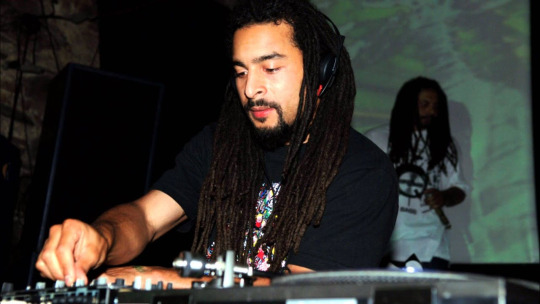
pictured: Mala, one of the godfathers of roots Dubstep
—
To be blunt, “genre” isn’t just about approximating what a song sounds like. If you say “I love pop music���, that honestly doesn’t mean much. The more specific you get, the more you will approach something someone can imagine like “I like experimental progressive noise pop music”. Ok, I can start to imagine things that likely approach what you're talking about, but even then it will usually not help someone fully understand what something truly is. In categorizing and approximating music styles, genres only go so far. So what makes them important then?
Well, not to say that approximating a style when describing an artist to someone is a bad thing or that doing so isn’t meant to be valued, but it’s hardly the only reason these labels exist. Importantly, “genre” helps establish culture, history, and a musical identity. So when you're trying to tell someone you're listening to a "progressive rock” project, you’re not just imagining odd time-signatures and complex riffs, you’re also meant to understand and consider that whatever is being described as to you has some sort of relevance or importance with regards to the history behind progressive rock; the culture of college bands in the UK, the sound that the punk movement revolted against, the progression of musical storytelling in rock music since the late 60’s and early 70’s, stuff like that. There’s a distinct culture and history you can pinpoint and understand when you describe something as being progressive rock and you can’t just go around calling any complex electric guitar oriented music "progressive rock" unless it has those specific ties as well as understanding and iteration of the roots.
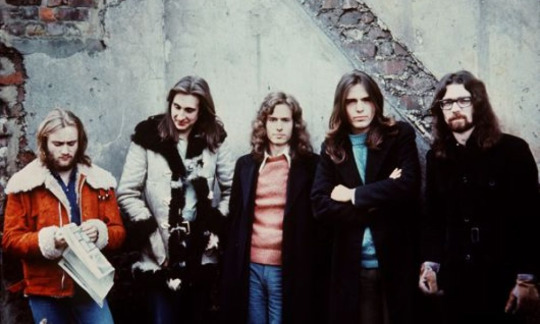
pictured: Genesis, because progressive rock mention
—
Genre labels help to clarify what kind of culture and histories a music project is being associated itself with and where a lot of its inspiration comes from. This is much more compelling reason for underlining the importance of genre labels and why they should be used correctly.
So, there is something I need to get off my chest then. There are a lot of misuses of genre labels all over the place, especially online. And I’m not talking about saying something is “Alternative Rock” when it’s clearly some kind of “Folk Rock” record instead. What I’m talking about is something like “Dubstep”.
Even as recent as a few years ago, I started personally reclaiming the term “Dubstep” as a genre label to describe any bass-adjacent music. At the time I did this, I thought it was cool, because the term Dubstep had been dubbed (pun intended) to be cringeworthy lexicon to some people. And while I feel that’s a noble reason to reclaim something like that, because some weirdos think it's cringe, in this case I actually think it’s wrong.
The term “Brostep” has been used to describe any non-roots bass-oriented music that originates from the proper roots Dubstep. It’s a term I didn’t like FOREVER, especially because the phrase was derived as a generalization of the kind of people who tend to listen to it. However, I actually think that Brostep is a title that people should be more comfortable and confident with labeling things as.
The original Dubstep came as a result of Jamaican immigrants bringing Dub music to the UK, which then fused with the remnants of 2-Step Garage which was prominent in the 90’s just years prior. Timbah.On.Toast made a great video called All My Homies Hate Skrillex and it is a really good breakdown of what separates roots Dubstep from the Americanized Brostep, which came after it. I think everyone knows by now that I have a deep, deep love for EDM based Broste and I am the biggest Skrillex fangirl alive. So being both a Brostep and Skrillex superfan, please understand that I think the video is one of the most important things you can watch as an EDM enjoyer.
Conflating the term Dubstep with things that aren’t actually Dubstep is honestly a slap in the face to all of the pioneers of Dub and Dubstep, which famously were both pretty much ENTIRELY invented by black people. I think it’s fair to say that incorrectly labeling music in this way has racist implications. It dishonours and twists the legacy of the music. You can find og Dubstep to listen to on the RYM Ultimate Box Set > Dubstep page. Check some of that out, then listen to some 2010, 2011 Skrillex and see how different things really went.
It confused me at first when I was a teenager, I didn't understand why so many people hated Skrillex back in the day. I came to realize so much of the hate wasn’t even really with regards music itself, but the total lack of understanding or care for the roots of the genre, which all of his work was founded upon and he then subsequently bastardized without caring at all. It was pure disrespect, it was practically cultural erasure and so many people will now only know of Dubstep as “that Skrillex transformer screech music”. Yeah. It actually fucking sucks.
But there is a LONG history of black music being erased from history and being undermined, whether entirely intentional or due to systemic unawareness.
I saw a post the other day talking about how it sucks that so much music is just lumped into being “video game music” when so much of this stuff has deep roots and cultural significance. The first example pointed how a lot of acid jazz music is just described as “Persona music” by the layperson now. Meanwhile, Acid Jazz as a genre is a huge development on things like roots jazz, disco, funk, and hip hop music. You know. All genres that were invented by black people. Fascinating, right?
Jungle music was also mentioned. And this one is very particular for me. Jungle music, when not being generalized as "PS1 Music", is often just called drum & bass or breakcore (also please Google the difference between breakbeat and breakcore, thanks) which are all fundamentally misunderstanding what Jungle music even is. Much of Jungle music, AS MANY THINGS DO, finds VERY prominent roots in Reggae, Dub, and sound system culture in Jamaica as well as countless other prominently black communities in the UK.
But it doesn’t stop there.
If you’re unfamiliar, there is a genre called “IDM”, otherwise known as Intelligent Dance Music. When I was a kid, and I first heard that word, I immediately was like “that is the most pretentious, stupid thing I’ve ever heard”. Eventually as I grew up, I just stopped thinking about that and started referring to more music as IDM. This style of music is generally characterized with “complexity” and being “not much danceable”. While I don’t think there’s anything wrong with the music that is called IDM, I do think there’s everything wrong with the term IDM, intelligent dance music.
When asked how he feels about being labeled as an IDM artist, Aphex Twin responded:
"I just think it's really funny to have terms like that. It's [basically] saying 'this is intelligent and everything else is STUPID.' It's really nasty to everyone else's music."
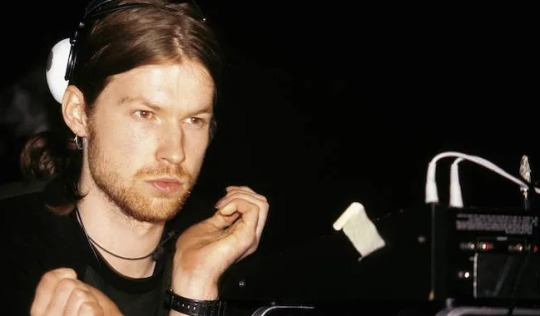
pictured: Aphex Twin, the funnyman himself
—
I think most people would agree with this sentiment. It’s so strange to call one kind of music “intelligent”, out of the hundreds of thousands of genres out there. But let’s bring this back to Jungle music. The reality is that IDM started to become a term around the same time that Jungle music became prominent, in the 90's. Both styles of music are complex, introspective, skittery, and chaotic (but refined and often disciplined) genres. Except, of these two, Jungle music was the one pioneered primarily by black artists. IDM was a sort in competition with Jungle. To therefore call IDM “intelligent” in comparison to Jungle music ... well. I don’t feel like I really have to explain why that’s fucked up.
A lot of people have proposed different names for IDM. A quick look on reddit yields things like “Experimental Electronic” and “Brain Dance” (which was coined by Aphex Twin's label). Me personally, the term “Electro-Prog” comes to mind. Sounds cool.
Similar conversations are presently being had about the term “Riddim”. This brings us back to the dubstep side of this discussion again. Riddim, as an EDM genre, is an offshoot of Brostep music that focuses a lot on repetition over the downbeat, maintaining an insanely distorted sound design, a lot more than the average Brostep song. However, the term “riddim” originates — yet again — from the Jamaican Patois for “rhythm”. And Riddim as a musical style in Jamaica is actually more associated with things like dancehall and reggae, rather than the commercialized "Riddim" that is several hundred times removed from its own roots.
Last year, musician INFEKT proposed that what most EDM listeners call “riddim” should be referred to instead as “Trench” in an article on their website. This proposed name is derived from Getter’s use of the term on his 2014 record “Trenchlords Vol. 1”. I don’t personally know how much I resonate with the term, but whatever the consensus is, I don’t think we should be conflating a westernized, commercialized, and EDM-centric genre like this to Jamaican roots music. Over and over again, it seems that black music is constantly overwritten by developments like this, so I think more care needs to be taken in not allowing that to happen.
As a side note, a lot of people online seem very keen on appropriating Jamaican Patois quite often? There are so many examples of this. When the term “Bomboclaat” started making the rounds on Twitter a few years ago, so many white people were quick to either talk wildly about the term and trend or otherwise start saying it as well. There was a fucking article that sought to answer “The Bomboclaat >> Meme << Meaning Explained”, like they’re not dissecting an element of Jamaican slang lol. Then there was a period of time where people were constantly saying things like “On Jah?” as a stand-in for “On God?” even though this, again, is Jamaican Patois. And even now, you have tons and tons of non-black people going everywhere being like “what is blud waffling about?”, the phrase “blud” ONCE AGAIN also being Jamaican in origin.
I shouldn’t even have to explain what makes these kinds of appropriations weird and messed up. But black people lose jobs and are denied basic things in life over their hair styles, their expressions and slang, and so many other things that a white person can just appropriate and face zero consequences whatsoever for.
That aside, aside. Understanding and labeling genres correctly is such a big part of music history and highlighting and preserving cultures worldwide. When efforts are made to undermine the meaning of a genre label or otherwise use it incorrectly, so much damage is done to the communities and people groups that innovate and pioneer this art to begin with.
For these reasons, I will gladly use the term Brostep. I will happily call things Electro-Prog. And when you talk about genres like Jungle and Dubstep, say it with your whole chest. Be proud of the human race, show respect and love for the people who have forged the greatest parts of music with their bare hands. We will always stand on the shoulders of giants as musicians, so instead of pretending you yourself are the giant, build monuments and maintain the history of these people. You as an artist are nothing without them.
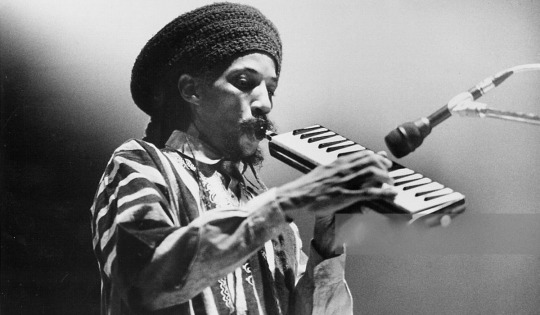
pictured: Augustus Pablo, one of the most important innovators of Dub. Without him, and without many of his contemporaries, I would reckon that half or more of all modern music would simply not exist.
CONTENT WARNING FOR THIS FINAL SECTION, THERE ARE LIKE LOTS OF STRANGE SLURS AND RACIST VIBES.
—
One last thing I wanna mention, this is slightly tangential but I think it's relevant to this conversation. It's always weird how lots of websites categorize things like this:
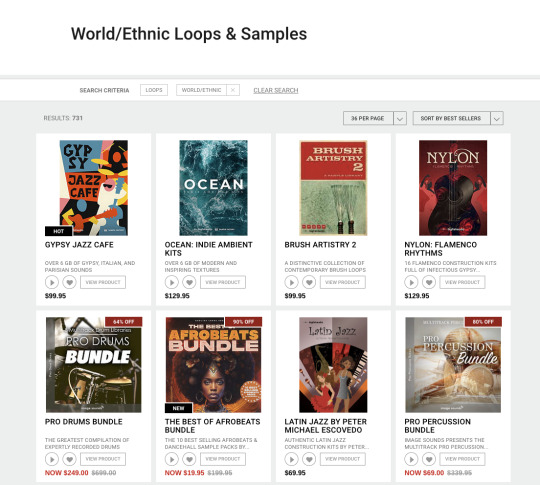
From Big Fish Audio... "G**sy*? "World/Ethnic Loops & Samples"? What the fuck are you talking about. Seems like racism to me.
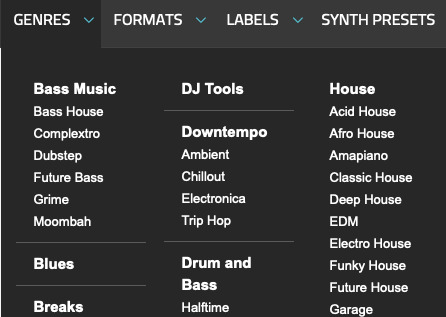

On Loopmasters they have a "World" section. Any Americanized genre gets its own category, but the entire continents of Africa and Asia as well as the country of India and region of the Middle East (which are part of Asia, hope this helps btw) and lastly South America are stuffed into the nebulous "World Label". Seems like racism to me. Are you telling me you weirdos can't figure out a better way to represent these things?

But then Psy Trance gets its whole entire own category? Aren't there only like five people who listen to Psy Trance? /hj . But like come on.

Shoutout to WA Productions for categorizing a universe of suspiciously mostly black music as """Urban"""". And this company is a dime a dozen, hundreds of corpos do this shit.
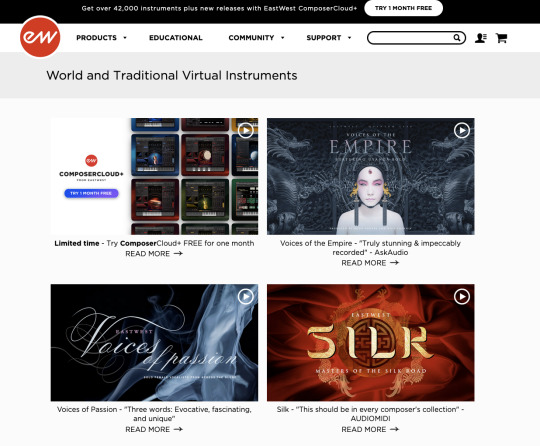
East fucking West, what is this dude. There is a racism happening, I just know it. Please give me a count of how many poc are on payroll at your company, I am so curious.
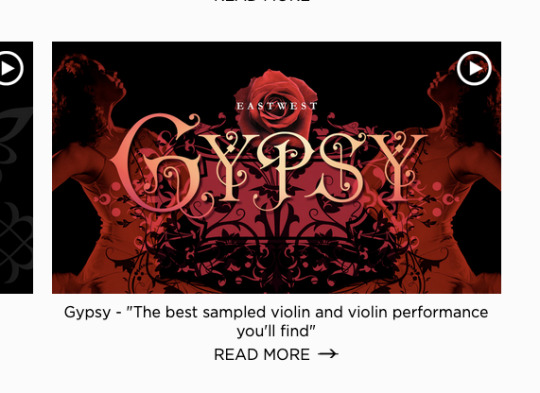
And while we're at it, East West, what is this. Tell me. Fucking tell me.
Thanks for reading.
251 notes
·
View notes
Note
I just wanted to let you know that I just found your tumblr within the past week and you have immediately become my 2nd favorite tumblr, being only behind Blogatog. Love your ttrpg takes.
Anywho, you said to ask about flags, so what is your biggest/are your biggest red flags when it comes to ttrpg design?
thank you! i'm glad you enjoy my silly little posts. anyways i think my biggest red flag is unintentionality--the feeling that the writer of a TTRPG has done something by 'default', the inability to put myself in their shoes and understand (or even better, be told by the text itself) the reason why a particular decision has been made.
one of the biggest places this rears its head is in terms of tone and voice. let me quote jay dragon's really good the storyteller technique:
Another advantage of getting to know the narrator of your RPG is that it helps mitigate unconscious bias in your design. Dungeons & Dragons has a notably anthropological narrative voice, explaining other cultures and creatures like a scientist in the field. The language of D&D mimics the writing style of mid-century scientists traveling to “exotic” locations and cataloging non-Western experiences as part of a documentation of the Other. It’s easy for newer designers to want to “write a game like D&D” without regard for how even the narrative voice of Dungeons & Dragons carries unintended political baggage. Is a bird’s-eye and judgemental perspective really the energy you want to bring to your whimsical fantasy world? Or is there another perspective within your world that can be more useful, and allow you to find new perspectives on the world you’ve created.
narrative tone is a choice--the attempt to use a 'neutral' tone for rules text and description is also a choice, how formal and how informal you get with it is a choice, and when i read a text that seems to have made that choice thoughtlessly it imo bodes very poorly for the rest of the game.
other examples of this kind of unintentionality are games that have a comabt system despite not being about combat in any way--games with equipment rules despite them not setting out to tell the sort of story where which sword or gun a character has matters--games that measure themselves in exact distances without actually using a battlemap--&c.
while most of this unintentionality takes the form of 'falling back onto what DND does' because DND is the market leader and many people's first TTRPG, so imitating it without purpose is something that both cynical market-share chasers & unexperienced designers without a wide range of expereicne can do--it's absolutely not unique to it. one form of unintentionality i see a lot in indie TTRPG circles is creating far more Moves for your PBtA game than necessary--clearly more out of a sense that 'AW/MotW/Masks has a Move for this' than any specific understanding of what that move will do in your game
in game design--as in any art--there is no such thing as a 'neutral' choice or a non-choice. there are only choices, and how much someone's thought about these choices is important!
359 notes
·
View notes
Note
so, final thoughts on totk? answer with spoilers please
sure.
first: i enjoyed totk a whole lot. even if its charm wore off quicker, it recaptured the joy of early botw for a bit. i've finished the story, but i'll probably continue idly checking off shrines and running around caves for a while longer. if the game had just been that, i'd probably have no significant complaints.
totk has the same problem as botw where all the main dungeons feel like homework. you might have seen me gripe about the fire temple early on, but the spirit temple was probably the most tedious stretch of the game. (like, the least they could have done was make mineru fun to use, surely??)
the story disappointed me most, not because i went in expecting much, but because it was actually engaging for a while. watching zelda aimlessly fly off after getting the master sword back was a devastating moment. but even as i was gushing about it with my friends, i knew they weren't going to commit.
and they didn't! you might call me a cynic, but zelda should have stayed a dragon. i didn't realistically expect her to, but i was at least hoping for a more convincing reason than "rauru and sonia suddenly appeared and blasted her with energy til she got better." also, why retroactively lessen the weight of her big sacrifice by clarifying that she didn't remember being a dragon at all? why give link his arm back instead of a cool new prosthetic from purah? why reset absolutely everything back to zero?
i also have to mention ganondorf. it's a shame that they (nintendo) made a big fuss about bringing him back, but neglected to make him interesting. isn't that why people missed him in botw? the geoglyph scenes made me expect some kind of fun backstory between him and rauru, but...no, he's just the evil desert man? that's it?
the fake zelda took the wind out of my sails too… there was a lot of potential for fun storytelling with her, but we didn't even get to wonder "could that really be zelda…?" for a moment because she acted like a cartoon villain from the beginning. and! i wanted to fight her!! it was a no-brainer!!!
anyway, i'm getting incoherent. good game overall in spite of my disappointments. i am simply fatigued by stories that pull their punches to avoid upsetting the audience. i don't want the happy ending if it's not the most interesting ending! let me have fun!
198 notes
·
View notes
Text
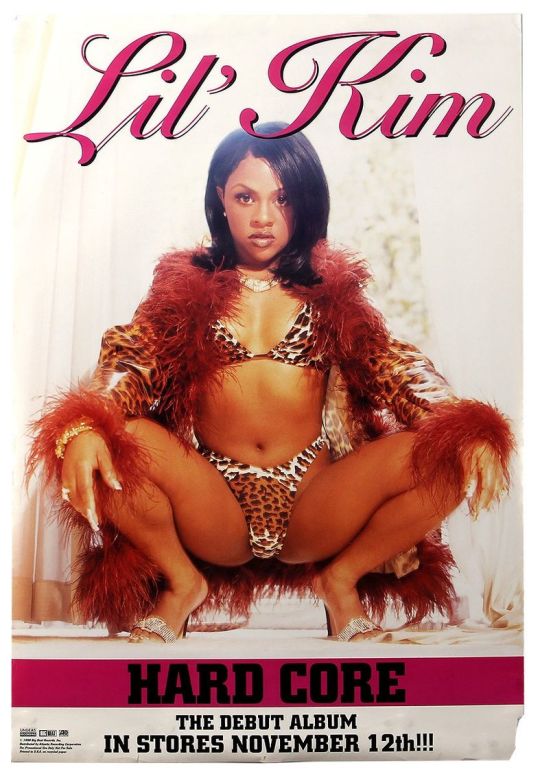
Lil Kim's Squat Pose Is Iconic. Its Photographer Discusses it for the First Time
In a rare interview, Michael Lavine discussed the day he shot Lil Kim’s Hard Core cover, the booklet, and that feisty, nearly 30-year-old poster we just can’t get enough of.
Even though Michael Lavine has photographed OutKast, Ghostface Killah, JAY-Z, Missy Elliott, Foxy Brown and many others, he didn’t start out capturing larger-than-life rap acts. Like multiple moments throughout his career, he just fell into the next phase of artistry, which was deifying a generation of Black storytellers.
Lavine’s interest in photography goes way back. He led his high school’s yearbook committee as the head photographer. Soon after, at Washington’s Evergreen State College, he studied traditional street photography in the style of Robert Frank and Garry Winogrand. While in Washington, he befriended the group responsible for the record label that became Sub Pop, and documented a then-emerging sound that, to this day, continues to inspire chart toppers. He wasn’t interested in being married to any particular genre or group though, because boxing yourself in isn’t the move. “I just never felt comfortable kind of being pigeonholed in anything to my own detriment. It's not good for business to do that,” he said. “You're supposed to kind of dive in, not pull away. But that's just how I was wired. I wanted to do my own thing.”

After fostering the trust of music industry greats (“I started working for Rick Rubin. He was one of my first clients and he hired me to shoot a bunch of his Death American acts because he was starting to do metal at that time,” Lavine recalled) and becoming a Black Book highlight, he fell into shooting some of the biggest rappers on the scene. His knowledge of capturing Black talent helped. “I was very good at skin color and doing warm skin tones and lighting people,” he said. “For some reason, I think there was this problem with white people who didn’t understand how to light Black people, which was just ridiculous.”
In short, he came, he saw, he snapped. Legacies were cemented in the process, most notably with an image of one of the greatest female rappers that has become one of hip-hop’s most beloved and recreated photos — Lil Kim’s iconic squat seen ‘round the world.
Below, the retired photographer gave Okayplayer a rare interview where, for the first time, he discussed the day he shot Lil Kim’s Hard Core cover, the booklet, and that feisty, nearly 30-year-old poster we just can’t get enough of.
This interview, which took place over multiple conversations, has been edited and condensed for clarity and length.
When did you first meet Lil Kim?
The date was 7/30/96. The anniversary just passed.
What was your first impression of her?
My impression overall was she was not like she is, as in the present. She was very quiet and under the thumb of Big Un. Remember Big Un?
Are you talking about Lance “Un” Rivera?
Yeah. He was there. He was the man in charge of her and was kind of in control of the shoot. Kim didn't say a word. I don't think I spoke to her once about anything, but we had a nice rapport in front of the camera. She was great and we made a lot of pictures together, but I felt like there was this circus going on around us and it was just me and her. You get this intimate bond with your subject a lot of times. She's in her lingerie and rolling around on a bed. So, I was trying to be my normal, respectable self, and being professional and making the images with her in tandem.
I would direct her like, "Let's try this. How about coming over here? What if we lean this way?" There were a lot of sets. We had rented a brownstone in Manhattan probably. It was a couple floors. It might have been two floors. So there was a bedroom, a little balcony, a fireplace, and those big doors.
I interviewed Kim last year and she told me she just kind of dropped into the squat pose naturally.
It was very spontaneous. When you're doing photo shoots, at least when I was working, it was an organic process and you let things happen. It's like a creative flow. Whenever you have a creative director there holding out a [composition] like, "Here, do it like this," it just was always bad and kind of nothing. It was like the safest way to get whatever it is that they had in their minds. But to make a great photograph you have to let things happen. You just have to go with it.
There was no layout for her to do that pose. It just was natural. Part of it, I spent a lot of time low angle, meaning I was always kind of lying on the floor, crouching down myself. So, it's possible that one of the reasons she did it was because I was probably sitting on the floor looking up at her because that's kind of how I do. My style was based on the hero, meaning my job was to make people look like heroes with iconic style.
My style was based on making people look cool and giving them lots of options. So, we would take a lot of different kinds of photographs. I used different kinds of lighting. We moved very quickly. A lot of things happened and it was very much an exciting experience. Somebody had a set prop person there bringing flowers. For the cover shot, we had all those flowers in front of the fire, and the bear skin rug we brought that in. It was a normal hip-hop shoot. I was intimidated. It was a very hard day. Everybody was being kind of tough and intimidating, and nobody would talk to me.
Were you scared?
I was never scared, but they all had guns. It's not that I was scared..scared is not the right word. It's more like I felt kind of out of place a little bit. I didn't even speak with Kim. I was dealing with Un mostly, and Un had a lot of ideas. So we were trying to do all the things. I was getting coverage for him. He wanted to have her hold the honey bear. Remember, there's a shot of her holding a honey bear on the black satin sheets? We had a lot of props. I had a props guy. His name was Jerry Schwartz. He was very good and we had brought a bunch of stuff.
So, for example, I remember Puffy came in for a shot and I did one shot with Puffy and Kim together. And Puffy, I worked with him many times. He didn't even say hello to me.
I was just like, “Really? Do you have to be that way? You're so cool you don't want to embarrass yourself talking to the photographer, actually acknowledging him?”
I never really felt at home around Puffy. I think at that time, because I don't think he's like this anymore, but at that time he was — and I know this happened to several other people that I've witnessed throughout their careers — they're really striving. It's very hard at the beginning and they'll push, push, push. They're just about their thing and they don't care about you. So, he was yelling at everybody all the time.
On set that day?
Not that day. Other days.
Oh, just in general?
Just in general. Barking orders. But that day he came in briefly and we did the shot and then he left. There's one shot, I don't know if you've seen it, of them together on a wall. I don't even know why he was there. I can't remember. He had something to do with the record, I guess.
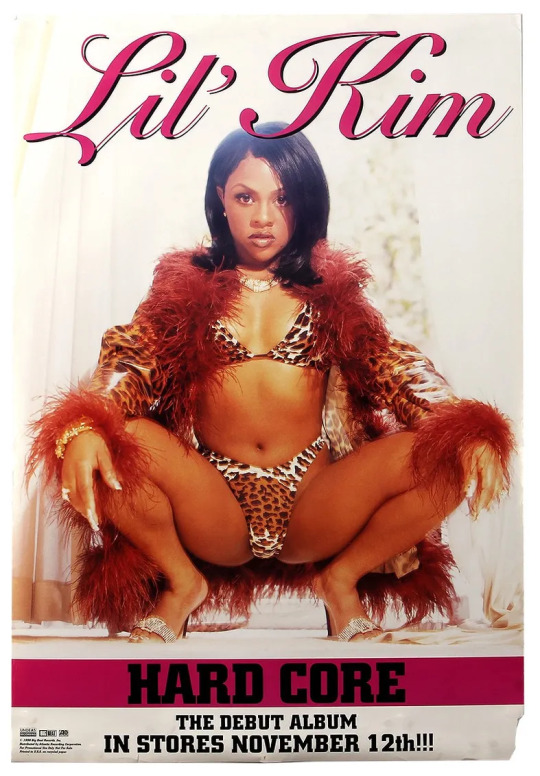
"There was no layout for her to do that pose. It just was natural," Lavine said of the image.
The image came out as the poster, “Lil Kim Coming Soon.” When you're there that day, you have no idea what images are going to stand out. Zero. There's just no way anyone could know. It isn't until there's time to contemplate the session when you edit it and you start to live with the images. And the graphic designer who, I can't remember who it was. Maybe you can find that out.
Maybe.
Let's see if there's a name on here. I don't know. Big Beat records? I don't know who that would've been. Atlantic maybe? I think it was Atlantic Records, no?
Lil Kim was [signed to] Atlantic.
It was Atlantic? Maybe it was, I don't know who it was. Liz Barrett? There were a bunch of people in the Atlantic art department at the time. I could probably look at the invoice.
Do you still have the invoice?
I don't know. Let's see if I do. '96...
If you do, you're the best records keeper of all time.
Yeah, there's Kim and Puffy right there. I have the whole job here. Ed and Carl were my assistants. The location was 24 West 10th Street. That's where we shot it. Here's something for you. Ready for this?
Yes.
So, these are notes from my conversation with the manager. "Little Kim. Female. She's the other woman, somersaults in bedroom, not raunchy. Doorway of bedroom, satin sheets. Blouse, undone. Honey in hair, on bed and on phone. Down pants. Unbuttoning pants. No whips and chains. Classy, sexy, lush, lustful. Candles in the background. Fruits and chocolates." There you go.

The notes Lavine was given prior to the Lil Kim shoot.
So, those were the notes that you were given before the shoot?
Yep. Those were the notes I was given before the shoot.
"Not raunchy" really stands out because I think you conveyed that.
"Not raunchy" — peekaboo, sexy shit.
Oh, man. Well, you did it. You accomplished the goal. And that actually flows really well into my next question, which was what do you believe they were trying to convey with the shoot?
It was funny that they hired me because I was known for not exploiting women in my photos. That was one of the reasons I didn't ever shoot women because back in the day, you were expected to shoot women with clothes off. I refused to do that and I never did it. I think this crouching picture was the raunchiest picture that I had ever done. Actually, that's not true. I did one once. But it was not my normal style, shall I say.
But also, it's an empowering image. I just generally felt uncomfortable sexualizing women throughout my career. That shoot was uncomfortable for me because I had to do that, and I think she was a little unclear as to what she was doing herself. I have no idea. I didn't talk to her. I'm not sure what she was thinking. Years later, I talked to her because we were both well complaining about this image being bootlegged.
She did mention that during our interview. That people were making t-shirts and making their own memorabilia.
It's completely illegal what they're doing, and it's got to be the most bootlegged image of mine. It's like whack-a-mole, you can't stop them. You send out your lawyers and then they just shut down and open with a different name. I could probably go out, spend some time and sue them all and she could, too. Who has time for that? If you have a lawyer and you have a lot of money, you could do that.
That sounds like a lot.
I mean, it's unfortunate. But she was talking about trying to do some merch of her own. The smart thing to do would be to get a deal with Merch Traffic or somebody that does merch, and then they would take care of trying to squash the illegal competition. But I thought that she was going to maybe have that happen this year, but I haven't heard from her.
But the image is just getting more and more famous. It's funny, you never know what kind of resonance an image is going to make and impress upon the culture at the time when you make it. It's rare that there's an instant classic. It's very hard to have that kind of impact these days just because of the nature of social media. Back then, there was a poster and that poster was the only poster. There was no other place to see it but the poster.
Now, it's everywhere.
That image really stands the test of time. Very few images stand the test of time like that image that I've worked on. It's one of my more recognizable images and I have a lot of them.
You do.
So, what can I say? It was a perfectly nice day. She was lovely. We had a nice rapport. The pictures came out great. I continued to work for many years after, and I'm retired now.
What made you jump into hip-hop photography?
Well, that's a funny question because I think my whole life, until recently, has been me falling into things that I wasn't planning on. I was driven to do photography so I was on that path. But if you would've told me my senior year, my fifth year of college, I was going to be shooting rock bands for a living for the rest of my life, I would've said, "Really?" I would've had no idea. But that fifth year [of college] I got a job to shoot a rock band and it just turned into —
The rest of your life?
It turned into the rest of my life. I never said, "I'm going to be a rock photographer." I never said that until I was one. Then, I had no plans on shooting hip-hop. It was an up-and-coming market at the time. I didn't know anything about it. I was friends with Kurt Cobain hanging out at rock shows, and really was unaware of a lot of hip-hop.
I did some hip-hop jobs early. I shot De La Soul, who I loved. I shot a few bands and hip-hop acts that were popular around that time. I got to know a lot of people in the business over time because I worked in it for so long. I was really close with Groovy Lou, who I loved as a stylist. June Ambrose. A lot of people.
But this was a defining moment. That shot, that poster when it came out, it made a lasting impact. It's still gaining speed. At that time, nobody knew who she was.
Did you know who she was?
I might've heard her name but not really. I just got hired on jobs. That's how I learned about people. I listened to the record before anybody else heard it. I got it first. But a lot of people were that way — I would learn about them on the job. That's how you learn because if I'm shooting 100 jobs a year, I don't have time to do anything but the job that's in front of me.
Did you listen to the album before the shoot?
Oh, I'm sure, of course. I don't remember the exact moment I listened to it but I always did. But that was part of the job, and we listened to it all day long during the shoot because that's what we did.
When did you realize that photo was really making waves?
Well, I think it happened over time. Obviously, the poster immediately was like, “OK, that's intense.”
Was it everywhere? Was it all over town?
It was everywhere. And when the poster came out it was powerful. It was a dramatic statement and it sent shock waves immediately. It was clearly influential at the time, I will say that. It was shocking and effective. It put her on the map.
Do you think it put her on the map more so than the cover?
Oh, yeah. The cover, who knows what the cover looks like? Nobody does.
#lil kim#lil' kim#rap#queen of rap#rapper#hip hop#queen bee#female rapper#female rap#hiphop#fashion#90s#squat
187 notes
·
View notes
Note
what's your take on odasaku and dazai's idealization of him?
also any takes you want to share about bsd/bsd in general?
(If you don't mind, I'm also interested in your thoughts about verlaine if thats ok 😭) tyty
who's your fave bsd character and whose the character from bsd you want to have more screen time?
i think its another case of projecting onto someone and it fucking things up. like notably how kouyou projects her own feelings abt light & dark onto kyouka. we just dont often see it that way because what oda does is like. stereotypically good? he uses his dying words to push a friend out of the dark. a death motivating others to act and furthering their character development is classic storytelling. you go into bsd knowing dazai is on the "good guys" side (not that the ada are "bad" but obviously reading bsd as a good guys vs bad guys story is. wrong), so clearly it worked out. so you kind of overlook the surrounding events yk? plus dazais own idolization of oda hammers that in. dazai tells atsushi that "He was a friend of mine (...) He’s the reason I quit the Port Mafia and joined the
agency. I’d probably still be killing people for the mafia if it
wasn’t for him" in dead apple (the lightnovel. im not going to go through pulling up the movie for this fhfhtndj). and so aside from previous bias people are going to take what dazai says at face value. hes thankful oda showed him the "side that saves people" and of course we're going to agree with that. the thing is. again. projection. now i havent actually finished dark era (i am working through it) but a lot of the time it feels like oda is just shoveling off all his feelings about being "someone meant for the darkness" onto dazai when thats something thats not going to be true for. well. anyone really? and his final conversation with dazai is very influenced by that. he says "You told me if you put yourself in a world
of violence and bloodshed, you might be able to find a
reason to live... (...) You won’t find it (...) You should know that. Whether you’re on the side that
takes lives or the side that saves them, nothing beyond
your own expectations will happen. Nothing in this world
can fill the hole that is your loneliness. You will wander the
darkness for eternity". now the thing is this is kind of a fucked up thing to say to an 18 year old with suicidal tendencies, but odas view of dazai makes it seem like a well needed wake up call. he obviously had good intentions. hes trying to "step into that solitude" but because of his flawed view of dazai he kind of. stumbles. dazai up to this point has been clinging onto the hope that he'd find a reason to live by observing the entire human experience. now oda comes along and dazai thinks hes found someone who understands him better than anyone, and oda tells him hes not going to find that. ever. so he should become a better person and make the world a good place. and also he's dying. so dazai, as we've seen, takes these words to heart. so hes not going to find a reason to live but he should also make the world a better place. good cool got that. so i think he gets a bit too comfortable being collateral for a good cause. and hes already convinced hes not going to find anything here, so of course hes not going to find anything. does that make sense.
i dont think ive phrased anything correctly here but like anyway i think with all his other friends around he'll be able to sort things out there. i cant see bsd ending without any sort of resolution for him in this regard yk.
#i cant say much on verlaine since ive read barely anything of stormbringer#like up to meeting shirase i think#flags death just fucked with me#from what i know hes also got projection issues. very common bsd theme#as for my favorite character... well you all dont know this but my favorite is actually Dazai#big shocker ik#as for screentime like..idk i miss everyone#i just want normal agency bullshit back#actually ykw i desperately want to see ranpo kyouka and atsushi as a trio#ranpos weird little siblings sweep gogogogogogo#aethers asks#swearing cw#longer post#anyway anyway anyway take this all with like 3 tablespoons of salt#i obviously havent read or watched as much bsd as i should have to be making these takes fhdhhsjs
85 notes
·
View notes
Text
I finally have time to talk about Lone Trail. I will be focusing on its depiction of science, technology and its progress. Will get a bit political, but funnily enough less than I imagined.
The thing that called my attention most in Lone Trail were the discussions on the nature of scientific progress. This is a theme that’s dear to me and the stuff I research about. It’s easy to think of scientific progress like an inevitable march forward, like an escalator. After all, we are much richer than we were before, right? Go to OurWorldInData dot org to play around with economic statistics in time – make sure to check the World GDP chart, from year 0 to 2000 and see it taking off like a rocket from year 1700.
What kind of Uncle Ted fan or neoluddite would go against that? Haha…hah…
Truth is that, although its effects are there, it’s not a clear if this is the little, neat process techbros want us to believe. It’s new and produces more, therefore it’s good, right? I could be writing this as a new wave of AI-generated NFTs pollute my algorithm.
That’s what makes the storytelling in Arknights so effective: it mashes together fantasy and sci-fi to really tell stories on the role of beliefs, technology, science and religion. The Rhine Lab saga is definitely an exploration of technology, with focus on the equivalent of the United States. During the period before the First World War, 1870-1913 (which is the one that Arknights draws most from), the world underwent through the so-called Second Industrial Revolution and I’ve read economic historians considering it the most innovative period in human history. I mean, obviously, there is an absolute number of inventions in our current age, but in relative terms 1870-1913 experienced a much larger number relative to the previous one.
The escalator narrative constructs scientific achievements as work of daring people (mostly men, but there were women like Marie Cuire), that combined science and technology to help mankind, like Prometheus giving mankind fire from the gods (in fact, one of these books is even named “Prometheus Unbound”); more than often they have to fight against the establishment. Remember Ignaz von Semmelweis? He just wanted doctors to wash their hands. Even I learned this standard narrative in the university. But that’s not the entire story.
The positivistic paradigm – of a science free of value judgements, made with the power of math – has actually helped build this escalator narrative. In reality, some scientists and scholars are horrible people. Later, I learned that Semmelweis, as much as he campaigned for the right thing, was a very arrogant person, who abused everyone around him, to the point few people went to his funeral.
Narratives focusing on one single hero are easy to sell and the ones building them are always on the lookout. Remember how ten years ago, a lot of people tried to push the narrative Elon Musk was going to create a new industrial revolution? Nowadays he’s just an arrogant loser who keeps dragging on his midlife crisis. The 1880s also had similar people like that, such as Thomas Edison.
Kristen Wright is definitely better than them both, because she is actually an engineering genius. But she’s also just like them, in the sense of unethical experiments, collusion with the military-industrial complex and being an overall superficially charismatic, but rotten to the core person. And she’s surrounded by a lot of people like Parvis and Ferdinand.
Breaking this line of reason, I have to say how much I hate Nietzsche’s ubermensch and master-slave morality, I hate Great Men theory, I hate Ayn Rand; these people are sheep who think themselves wolves. And before you say that Nietzsche didn’t consider himself an ubermensch, well, neither did Parvis and his reasoning was the same. For every person fancying themselves ubermensch, there’s a lot of those whom he’d call untermensch to clean up their messes. You have no idea of how times I stumbled upon people (especially libertarians) that advocate lower barriers to regulations that were written in blood, so that progress can happen quicker. Creative destruction works, as long as some people get “creative” and others clean the “destruction”. Deaths and injuries? Acceptable, just give them a pension (but fight tooth and nail in the court to not do it beyond the barest of the bare minimum, because it’ll lower the shareholder profit in 0.01%). Increase in inequality? Nobody will care in a few years, it’ll make everything cheaper anyway (look up Baumol’s cost disease to see how wrong that statement is, without being incorrect). I’m not exaggerating, sometimes the people saying that don’t even bother lacing it in politically correct language.
Because Lone Trail showed it “worked” – Kristen Wright broke off the ceiling over Terra and that will have consequences (especially with Endfield coming closer). The data from her experiments will advance science, the sight of a broken ceiling will inspire artists and prompt politicians to act. Was it worth it? Well, it will depend on who you ask (like, Ifrit or Rosmontis would have strong feelings), but it’s just there now. Serious history isn’t kind on this question as well – many technologies have a lot of transgressions, both legal and ethical, in their supply chain (both the American and Soviet space program come to my mind – guess who helped them); the difference between an entrepreneur and a criminal are contextual, because both are finding new opportunities of profit and both interlock frequently.
In the end, anyone can put an equation that has its uses, not mattering if it’s a good person or not. But that is no excuse to find good ethical practices. Silence saw everything with her own eyes and I’m really glad she’s leading the initiative for a more ethical science in Columbia – especially because people who are willing to break moral rules tend also to be willing to break research rules (this is why the “research” made in concentration camps is actually useless, it didn’t respect experimental rules). So I’m really glad for the Arknights writers for understanding these nuances and communicating them to the audience through one of the best stories of the game.
55 notes
·
View notes
Text
Putting a message i sent earlier under a read more, it has some thoughts ive expressed before tho. ES, of course
My thoughts as an EichiP... i view ! and !! as different stories in the way they're approached tbh, what i fell in love with enstars for was the character driven storytelling of one event seen through different perspectives, where you see the antagonist in one perspective become a protagonist in another story and can empathize with the entire cast like this. I fell in love with eichi's story of second chances, getting what you want and regretting your actions in the process, redemption, desperation, overcoming fate and asserting one's self into the story, saving a school in a dying industry that saved your life by giving you a dream; i consider it an arc fulfilling to the reader at the end of ! era. But we still had to continue... and it's not like we didnt get inklings of eichi's dreams of idol utopia, the idol soldier idea goes back to main story 1, but !! loses the charm of the original series through expanding the worldbuilding so much and shifting to a plot driven story that opens 10 cans of worms instead of offering resolutions. There's not really room to breathe if the stakes just keep getting higher and higher...
As for the colonisation plotline, it's been here since the beginning of ES2. The SS arc makes it obvious, but i remember even before, the talks about ES taking over from local businesses, trying to be seen as the standard, it was always the direction ensemble square as an institution would take. But the "antagonist in one story, protagonist in another" approach doesnt work anymore with such subjects. The guys responsible for this are your coworkers you share dorms with. I read the stories but cant empathize anymore, so i've been feeling disconnected from eichi for a while. I see enstars with eichi at its core but i didnt care for his center event, i read it, didnt like the ending, and overall felt off. Eichi becoming the villain of ! to attone for the war kind of loses significance if a year later he is a cartoon villain idol colonialist you can't even sympathize with anymore because of the magnitude of events. However i do think !! has done good things for some characters pushing them further or developing them in a way ! didnt. But for others...
I also have my issues with sci fi elements becoming the norm, even taken metaphorically or as hyperboles, when one of the central themes i love about enstars is humanity. Then again, i am a war era fan that relied on manipulating human desires and perceptions, and the fact that there were no monsters or gods, just humans framed as such, playing on people's fears and beliefs, it's a bit jarring to me to have them introduce AIs forming from escaped comatose brains (im minimizing the switch climax rn, i didnt even hate it as a whole, just this resolution im unhappy with)
It also feels like we've lost some of the meta aspects of the writing i liked, a certain awareness of being characters in a story and there being an audience. But im still struggling to word my thoughts on this matter. I felt it present in main story 2, even if it annoyed me at parts in its obviousness ("good thing we're not protagonists, no one would want to read about us" youre right aira you are not interesting to me. And yet i'll read your story to try and empathize nevertheless. I have other thoughts on aira too, perhaps for another time). I wish we explored a bit more what it means to no longer be the central protagonist, from trickstar's perspective...and brought back the successors topic. But i havent read every ts story yet so i'd be foolish to complain before really making sure i've checked everything. To me ! ended satisfyingly with room left for elaborations and imagination, but i dont feel like !!'s ending is really ending anything at all. Not necessarily bad since it's not like the game is shutting down, but overwhelming worldbuilding wise while underwhelming character wise...
Let's see... im not sure how to end this. Just a bit of a stream of consciousness as a ! fan who still loves enstars despite my critiques. Mainly, well, no one's gonna take away the stories that already exist that i do love and impacted my life greatly. And i do think !! had some really good things too it brought, or at least stories i hold dear too. Change is scary and i don't think it's always for the best, but it's also fun to see where it goes next...
29 notes
·
View notes
Note
i've been occasionally watching critiques of totk just to hear differing opinions and a lot of them feel really nitpicky but the one that stuck out to me the most was the guy who wholeheartedly believed that the stories in these games could be improved by. removing link as the main protagonist. it should be pretty obvious that this take sucks ass but i wanted to see if you'd share your thoughts since you're good at putting your thoughts into words with this kind of stuff ^_^
ok this one is. strange to me. I'm not sure i'm equipped to critique it without getting the full argument from its source, because i assume that if the argument is that link SHOULDN'T be the protagonist, then they're arguing someone else SHOULD be instead, and not knowing who that is makes this a little harder to dissect. for the sake of this post i'm going to assume we're arguing for protag zelda, because she's the character who is the vessel for most of the story in botw/totk so i think she's the only character that makes sense. I'm also curious if they're advocating for removing link as a character from the story entirely or if they're just advocating for a change in framing from one character to another.
in any case, If i'm right about the above assumptions this seems to be another case of someone missing the central themes of the games. Because I concede that, at a glance, link kind of doesn't have that much presence in the story of either game. both games very heavily focus on zelda, with botw's primary story being about her struggle pre-calamity with her agency and her powers, and totk's primary story being about her journey in the past with sonia and rauru. arguably, the protagonist of these games in the traditional sense, i.e. the character who primarily experiences the highs and lows of the story and goes through an arc of growth, is ZELDA. link is, for all intents and purposes, the framing device through which we as players are witnessing ZELDA's story.
(full disclosure this turns into an essay on the way link is used as a character and a plot device bc i have no self control lol)
so why is link necessary, then? what is the point of the player experiencing the plot through a framing character like him instead of through zelda herself, the active protagonist? I think there are several layers to what makes link's presence in these games both necessary and irreplaceable.
the first and one of the most important reasons to have link in the active role is interactivity. I'm incredibly interested in video games as a modern art form and storytelling method, and imo the thing that sets video games apart from other methods of storytelling is their interactivity. In order to tell a story, an rpg drops the player into the middle of it. the player is an active participant in the story as it unfolds, and the player gets to experience and potentially alter the events in real time. from a consumer standpoint this may seem obvious and uncomplicated to execute--just take a prewritten story and put the player in control of one of the characters, right? but from a writing standpoint, it becomes really complicated really fast.
most stories are written linearly in a sort of cause-and-effect model, meaning events and actions will build on each other throughout the progression of the story. e.g: a monster attacks a village > because of the monster attack the villagers lose their homes > because they are now homeless, one of the villagers decides to slay the monster to take their village back > the villager slays the monster and the village is saved. each event builds upon the one before it, and if any of the events in the sequence were altered, the events after it would also be altered as well. if the villager decided to leave the village instead of fighting the monster, the event after that one would be altered and the village wouldn't be saved. What this means for interactive storytelling is that, if you want to have a single set course of events and ending (the standard model for zelda games) you can't allow the player to alter any events in that sequence. whatever character you give the player control of has to be able to experience the story WITHOUT substantially altering it. this becomes a dilemma because you as a writer need to toe the line between giving the player too much choice and altering the story/creating plot holes and giving the player too little choice and limiting the interactivity of your story. this is where the silent protagonist comes in handy.
the silent protagonist is a term for a player character which takes no action outside of what the player specifically orders them to. Link is one of the more famous silent protagonists, but other well-known ones include frisk from undertale and joker from persona 5 (worth noting that SPs don't have to be PHYSICALLY silent to be SPs, they just can't take any story-altering action without player input. joker actually has voice lines & is still considered an SP!) the silent protagonist is a popular model for RPG player characters because it basically solves the interactivity dilemma. A character with no personality is incredibly easy for players to project themselves onto, making them FEEL very in-control and immersed in the story even if they're not REALLY making any story-altering decisions. As long as your protagonist never breaks from player control and makes decisions on their own, the player feels like they ARE that character and will be much more susceptible to being thrown around by the story. A character with no personality or backstory is also conveniently lacking in outside motivations, meaning they're unlikely to need to substantially alter the story in any way that they aren't directly prompted to. for example, if we go back to that monster & villager story, if we turn our heroic villager into a silent protagonist, it puts a layer of distance between the hero and the villagers. the hero CAN choose to save the village, but they likely WON'T if the game doesn't prompt them to. this opens up several possibilities to us as writers--we can prompt the player to save the village, if that's the way we want the story to end, but we could ALSO prompt the player to side with the monster, or to ignore the village altogether, depending on what the story requires. when the hero has a backstory connecting them to the village, it's difficult to rationalize any response other than them attacking the monster, but removing that backstory gives us as writers more control AND keeps the player more engaged with the story at the same time.
so why does this matter for link? as previously mentioned, link is arguably the most famous silent protagonist of all time. this is something that's VERY important to the developers of these games--throughout the entire franchise, you will NEVER hear link say a word, and you'll also never see him take any action without the express confirmation of the player. link isn't a character through which the player is experiencing the story, link IS the player. thus, link is silent and takes no action outside of the player's control. relative to the story of botw/totk, link feels like he lacks presence in the story because HIS story takes somewhat of a backseat to zelda's. link's story in botw/totk is a relatively straightforward one--he wakes up, regains his memories, and saves the princess. that's his arc, and that's the arc that we as players are physically experiencing through him, but it's NOT the primary story arc of the games. the primary arc is ZELDA'S. at a glance, then, it almost would make more sense to make zelda the playable protagonist of the games. why are we required to witness her story as an outside observer in a medium which allows players to experience a story firsthand? why not drop us into HER body instead of link's?
because zelda isn't a silent protagonist.
Nearly all of zelda's story in both botw and totk is driven by her backstory and her internal struggle. she makes the decisions that she makes in botw because of her history having her agency denied by her father and being scorned by the goddess, and because of her passion for ancient technology and science. the plot of totk is similarly driven by choices she makes based on her emotions--most notably, her choice to become a dragon requires her to have complete faith in link and the courage to take a step that means losing herself. Because of the way these choices rely on zelda's internal emotional state and the context and backstory of her character, a player dropped into her body can't be expected to make them. We actually saw it a lot with criticisms of the way she acted in botw--people claiming that if THEY were in her shoes they wouldn't have been so emotional, they would have been nicer to link, etc. And it's true that a player who hasn't experienced the things that zelda as a character has gone through may have been able to have more rational or logical reactions to the situation she was in, but it's crucial to the plot that zelda COULDN'T set aside her emotions or the way that her past colored her perception of events. zelda is essentially the anti-silent-protagonist. she is the VOCAL protagonist, whose backstory and voice and autonomous choices are so crucial to the plot that removing them becomes nearly impossible. in order to tell her story in an interactive medium, she requires another character who CAN be controlled and whose decisions can be altered somewhat without derailing the plot entirely, hence why link becomes the vessel through which we see her story.
no less important a point is the fact that link is thematically important to these games as well. As previously mentioned, zelda's story serves as the primary narrative to both games. Link's story is still present, however, and it serves to reinforce and expand upon the themes present in zelda's.
in botw, zelda's story centers around her lack of agency. she is expected to inherit her familial power from the goddess hylia, a power which is required to stop the calamity. she spends her entire life training for this purpose despite the fact that she resents the pressure and wants no part in the war against the calamity, and when her powers don't manifest she is treated like a failure for it. she ends up believing she is worth nothing if she can't contribute by awakening her power and develops a harsh internal conflict between her desire to be accepted and needed and her desire to break free from the oppressive role she's been forced into. Initially, both she and the player believe link to be the polar opposite to her--the golden child to her black sheep. he's her age, but he's already mastered HIS power and is more than ready to take on any challenge, including the calamity. he's constantly receiving praise, he's well-known and well-liked, he's everything zelda isn't. however, as the story progresses, it's revealed to both the player and zelda that link is actually essentially in the exact same situation as zelda. He finds the role he is playing just as oppressive as zelda finds hers, despite being able to play it so well, to the point where he goes mute due to the pressure to perform. he functions in this story as a foil to zelda, the character who she plays off of. In learning about him we learn about zelda, and vice versa, and both characters undergo growth when they work off each other. much of botw's theming centers around growth, healing, and change, and link serves as a vessel to propel zelda's change by giving both her and the player a different view of their situation. He is confirmation that even if she DID perform correctly, zelda STILL wouldn't find the happiness and validation she's seeking, which in turn forces her to stop seeking validation from her father and hylia.
this same utlization of link is present in totk, though in a slightly different way. in some ways, totk link is more of his own character than a foil to zelda a la botw. Totk has two main central themes: the first being that hope is not lost due to one mistake, and the second being teamwork and community as an essential tool for survival and happiness. rather than playing off each other in totk, since link and zelda spend so much of the story so far removed from each other, they both play off these themes in their own ways, with both of their narratives coming together to reinforce the theming. zelda finds friends and community in the sages in the past, and her trust in her friends and community in the future is what allows her to send the master sword through time via draconification. In the future, link repairs communities that have been fractured by ganondorf and forges bonds with his own sages that will become his greatest assets in the final battle. Zelda works tirelessly to prevent the first rise of ganondorf, and even when she fails, link is there in the future to fix it. zelda loses her humanity in order to bring the master sword to link, but link manages to bring her back in the end. link loses his arm when he fails to save zelda under the castle, but when he DOES save her in the end, he gets his arm back, too. each of their stories play off each other and reinforce each other thematically.
I'm ngl this did get away from me the second i started talking about silent protagonists as a narrative device (i am crazy <3) but anyway. I do sincerely think that link is an irreplaceable part of these stories and I also don't think it's feasible to tell the story from any other angle. I think using him as both a framing character and as a narrative foil to the active protagonist was a really smart way to tell zelda's story while still keeping the player active within it. tldr link is the specialest amazingest most important boy in the world if you don't cheer and clap for him i'll fucking blow this whole building up
117 notes
·
View notes
Text
Why Aliens feels off in Tales of Arcadia

Don't get me wrong, I really like Aja, Krel and Varvatos. I even think that 3Below was quite good, even if i'm not a sci-fi fan at all (i even managed to fall asleep in front of every Star Wars ever, and not with any other movie). But good doesn't mean good in terms of storytelling. Because after all 3Below is set in the Tales of Arcadia franchise, and let's just say they don't 100% fit in it.
So why is that ?

1. Trollhunters is based on a book, and the book doesn't contain any aliens.
Well from what I have researched the book doesn't contain any trace of wizards too. I will also add that I haven't read the original book, I just made some researches about its content on the internet.
For those who don't know, Trollhunters : Tales of Arcadia is a loose adaptation of a book written by Guillermo Del Toro and Daniel Kraus, called Trollhunters. It's an adaptation similar to How to Train Your Dragon : The characters are present, the surnatural/fantasy aspect of the book is also present but everything else is changed. I even saw that Steve dies in the book, so glad they didn't take that route.
And i'm not part of the people who screams and cry everytime there is any changes from a book to a movie, To be deeply honest with you all I studied Cinema and English litterature in highschool and my final projet for those two subjects was to talk about how some changes in book adaptations are a good idea.
But it just shows that writer did not have any basic material for it. They had to create it all from scraps, and I feel like the first season of Trollhunters was already out when they thought of aliens, so they decided to connect it howerver they could. Which leads us to our second point.
2. Aliens don't really have any deep connections with humans, trolls or wizards.
Wizards and trolls fought against Gumm gumms, wizards have created many magical relics that Trolls uses, and as we saw with Hisirdoux wizards have an habit of dealing with trolls species. The interactions are already present, they have a deep history between them, shares problems and common knowledge.
Aliens apparently shook hands long time ago on Earth and were gone for the rest of the time, so except an old memory forgotten by almost everyone, they don't really have a pre existing history tying them to the different races in the story.
Trolls and wizards are based on things we already know off. I mean we have countless myths and legends about them already, but there is a bit more to that.
Horseshoe are items to uncover if someone is a changeling, trolls love to eat socks, which ties into the forever myth of "why am I always missing a sock", you think that racoons made your trashcan fall but it could have been gobelins, is that a black cat or just a small dragon etc. You really have the aspect that you interact with the "underworld" on a day to day basis without being actually aware of, and that goes deeper than just "oh this random person is just a troll in disguise".
Aliens don't really have that, like no one except the army used alien technology before 3Below, and still it was in secret so we can't really copy that to our everyday life as easily as the previous examples that I made.
Earth is about Trolls, humans, demi-gods and wizards. And it also happened to have aliens once in a while, but nothing much about it. And that leads us to our last point.
3. The plot has no space for Aliens.
Since the whole story is about earth and the fate of earth, we don't really have space for Aliens in the plot (no puns intended). We can literally see that with the 3Below plot : gumm gumms are something completly unrelated to the plot, it just happens in the back while the main plot is happening. 3Below is more of a spin-off or a "What If?" kind of show than a continuation of the main plot.
3Below is an interlude, an easter egg for the fans. You barely see the main cast, the main cast barely acknowledge the presence of the trio in their own show.
See I wouldn't be criticizing it if it was considered as such in the franchise. A side-story that doesn't impact the plot, but for fan service it will appear in the final movie so that everyone has their conclusion.
But it's not the case, it is seen as an important part of the story by the studio. It has never been advertised as something else than an active part of Tales of Arcadia.
If they truly wanted something about aliens, it should have been as a side story, a spin off.
But as a major part of the franchise, it doesn't deserve its spot and you can feel it.

#tales of arcadia : trollhunters#tales of arcadia trollhunters#rise of the titans#3below tales of arcadia#tales of arcadia wizards#tales of arcadia#tales of arcadia : rise of the titans#wizards#trollhunters#tales of arcadia : 3below#tales of arcadia : wizards#tales of arcadia 3below#wizards tales of arcadia#rise of the titans tales of arcadia#tales of arcadia rise of the titans#trollhunters tales of arcadia#aja tarron#krel tarron#varvatos vex#trollhunters critical#3below critical
45 notes
·
View notes
Text
Choose your favorite!

Vote in the other polls!
What fans say:
Inside Out:
Besides the fact of "being a Pixar movie", this movie is a masterpiece, and it has really impacted me. Its message about accepting that "bad" emotions such as sadness are part of life and have its positive side and that "good" emotions like joy can be negative and toxic is really important and one that I'm still trying to internalize 8 years since I first watched the movie.
Wolfwalkers:
The animation is absolutely gorgeous, with a unique style. The music is wonderful, the story is touching. What's not to love!!!!!!
It's beautiful! If I'd watched this as a young girl it would've done something to my brain, in a good way. It's about being stifled by England and those in power, in 1600s Ireland. It's about little girls becoming best friends. It's really sweet, and wonderful. I love the scene where Robyn gets to really have fun and play as a wolf.
Wolfwalkers has beautiful stylized animation. The story is about conflict between the oppressive English colonizers of an Irish town, and their old ways of living in harmony with the forest. When the main character Robyn is in the town, the style she and the backgrounds are drawn in have an angular style made up of flat shapes that don‘t turn in perspective, similar to a woodcut print, showing the limitedness of the town worldview. When Robyn is in the forest at first she is drawn in the town style, but as she is introduced to Mebh, the style shifts to a loose, pencil-lined style with soft shapes and forms that turn three-dimensionally. Later, at key points in the story, Robyn shifts between these styles to reflects whether she is conforming to or breaking away from the town‘s rigid system. It‘s a beautiful way to subtly tie animation to storytelling. I also of course love the story for its queer, environmentalist, and anticolonial themes. It‘s an excellent movie and everyone should see it.
It has some wonderful animation, especially in the wolf scenes, and tells a story that pulls from the history of the English colonisation of Ireland.
The art style is gorgeous and the story is lovely.
It is the most beautifully done 2d animation I've ever seen, beautifully drawn and with such interesting stylistic choices for the backgrounds and the character design, the best shapes. Perspective is really played around with in wide shots that show the town, giving it an even more boxy and closed-off feel to it! My favorite scene would have to be when the song Running With The Wolves by AURORA plays. It makes me cry like a baby they're so beautiful and playful and free and learning to have strength and courage.......
It tells a really beautiful story about identity and friendship and being brave enough to stand up to your oppressors
The animation is gorgeous and well-utilized to convey tone/mood and also little wolf girls are valid and the scenery is [chef’s kiss]
The animation is really stylized which I like. The art style is one-of-a-kind, changing slightly depending on what's happening in the story. Like, for example, Robyn, one of the main characters in the story, started being drawn using cleaner lines when she was still "civilized", in contrast to Mebh, a girl from a tribe that lives in the forest and can turn into a wolf. As Robyn started becoming "wilder", spending time w Mebh, the lineart becomes more sketchy. It's just a really really pretty film. The story is also really really good. The characters are complex and develop throughout the movie. You can understand why Robyn's dad acts the way he does, but still allows him to see the errors in his ways. Also Mebh and Robyn are just fuckin adorable. This movie made me cry so hard and I hardly ever do that Also the soundtrack? MYGOD. perfect. Favourite scene is definitely Mebh and Robyn's wolf scene where Robyn was learning how to be a wolfwalker. The music and animation in that is so good. Idk i really i really love this movie bc it feels so... ALIVE. It uses the animation medium really well, doesn't shy away from the 2Dness and stylizeness of it, which I wish more animated stuff would do.
The animation !!!! Is so gorgeous !!! The art style is so gorgeous, in some places super details and in some moments mimicking medieval styles with symbolic (rather than realistic) perspective, it's so so so beautiful. The music is also amazing, and the story is beautifully put together, it will make you weep.
126 notes
·
View notes